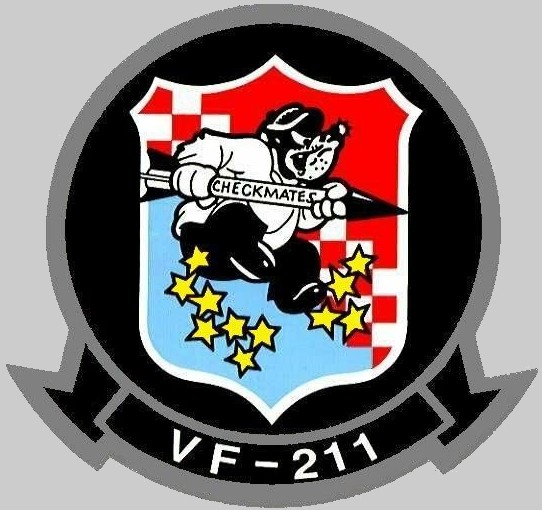 |
||||||
|
HOME
|
US Navy -
ships
|
US Navy - air
units
|
USMC - air
units
|
International
Navies
|
Weapon Systems
|
Special Reports |
||||||
|
|
||||||
|
|
||||||
|
US Navy - Fighter Squadron 211
(FITRON 211) VF-211 'Fighting Checkmates' |
||||||
|
|
||||||
|
||||||
| 01/20 | ||||||
|
||||||
|
|
||||||
| images | ||||||
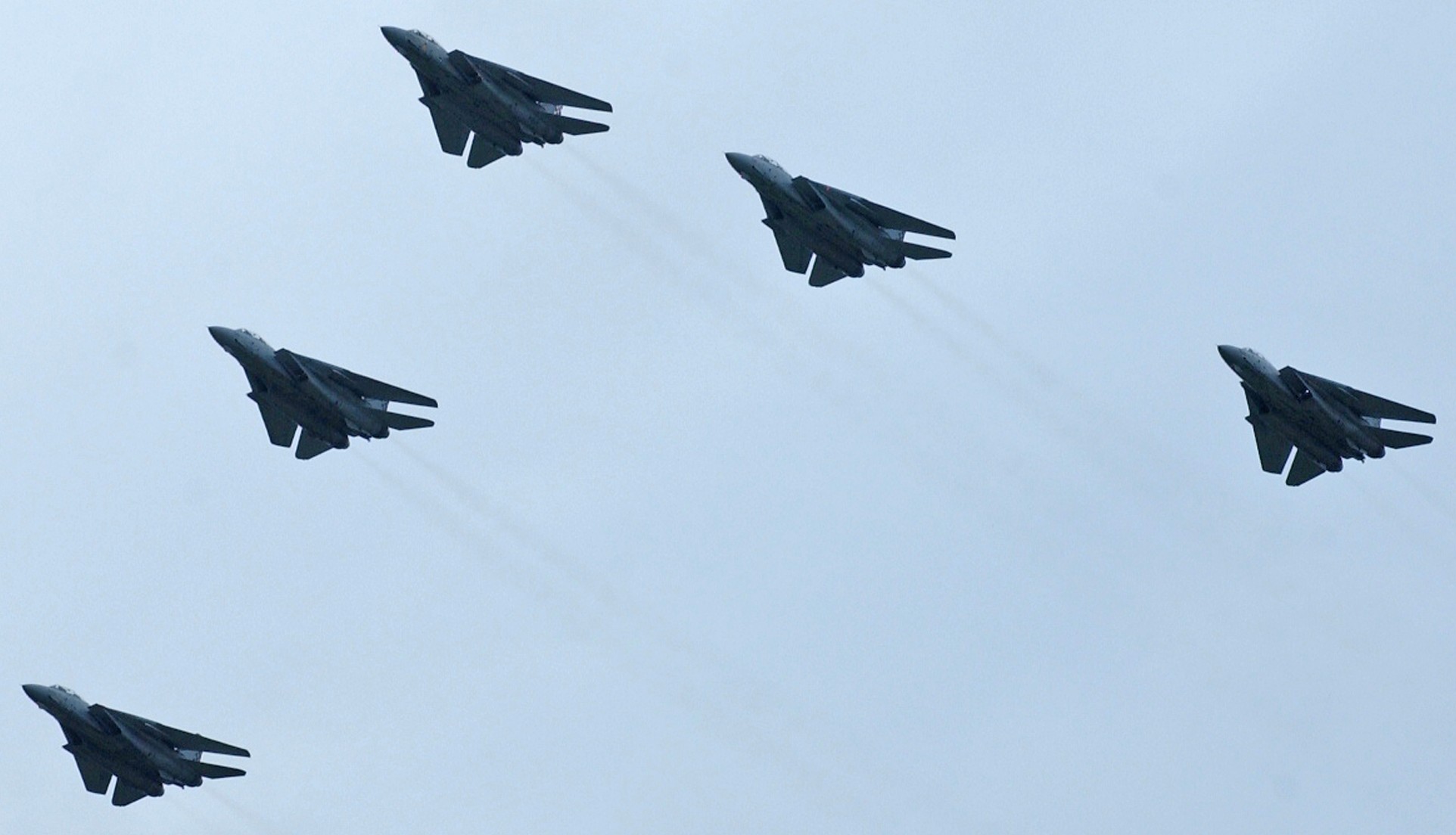 F-14A Tomcat (VF-211) during their final fly-by over NAS Oceana, Virginia - September 8, 2004 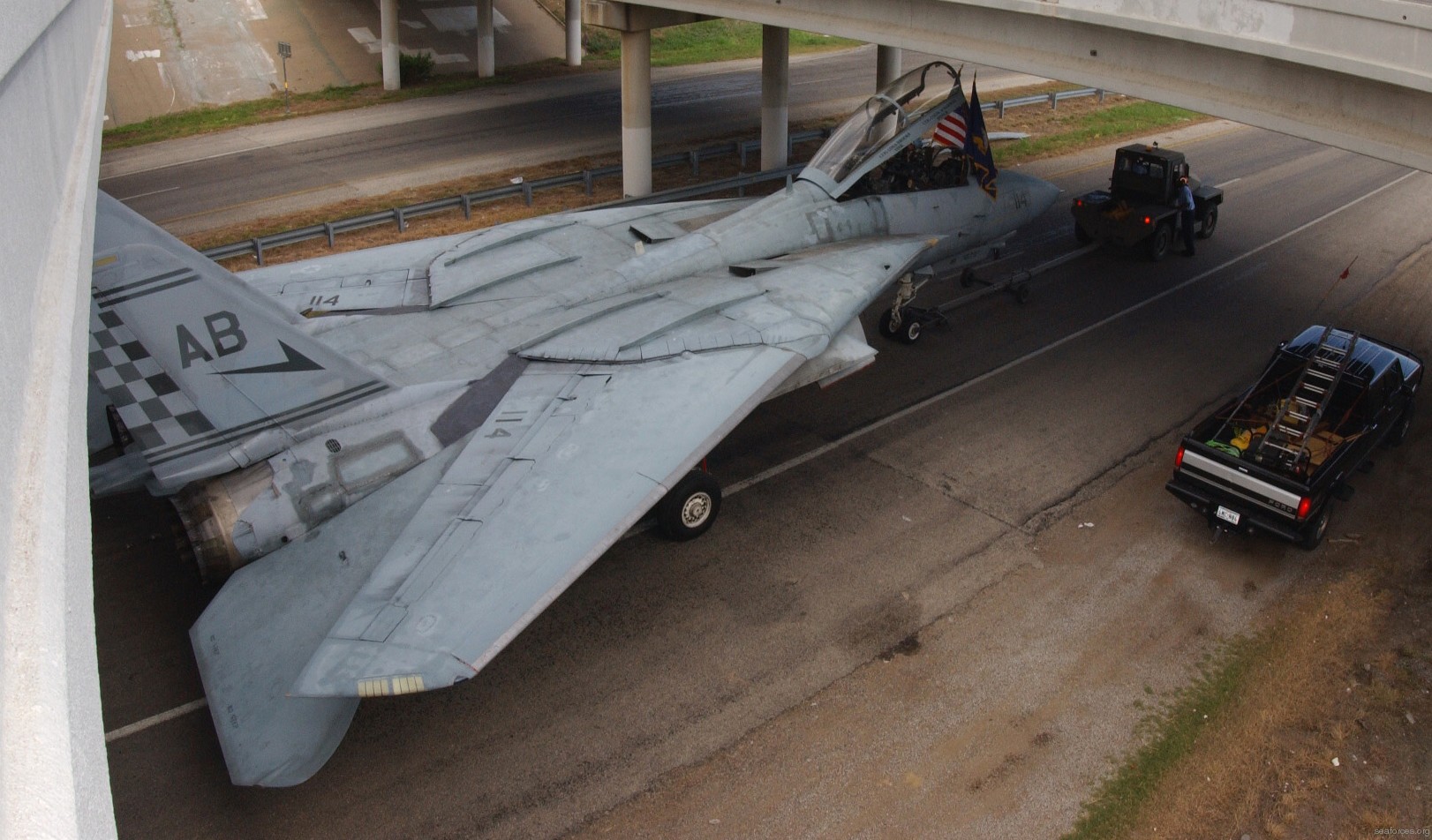 F-14A Tomcat (VF-211) on her way to Goodfellow AFB, Texas to be used for fire training - August 2004 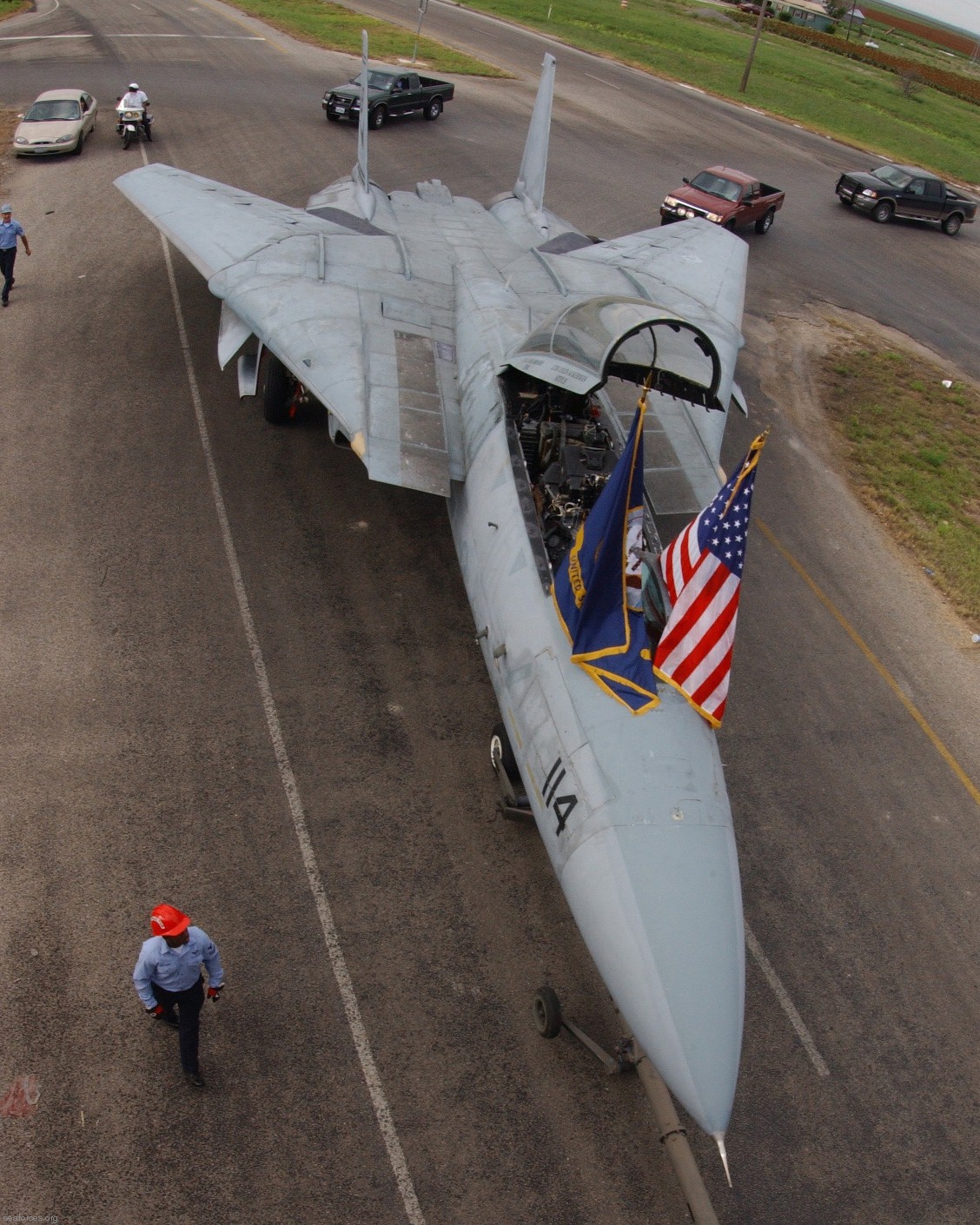 F-14A Tomcat (VF-211) on her way to Goodfellow AFB, Texas to be used for fire training - August 2004 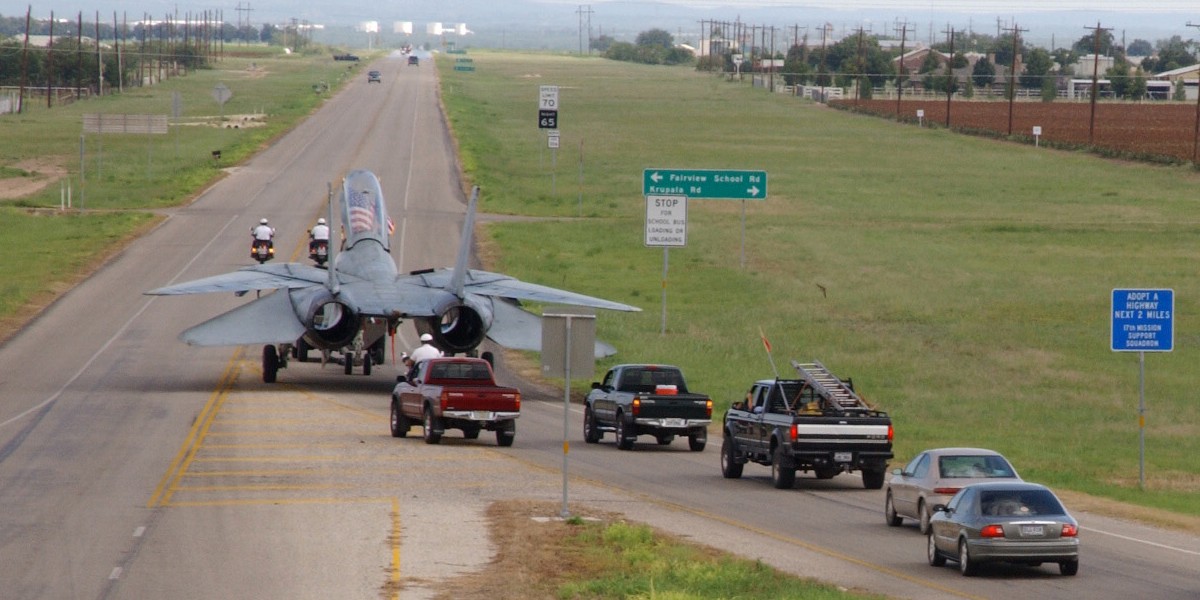 F-14A Tomcat (VF-211) on her way to Goodfellow AFB, Texas to be used for fire training - August 2004 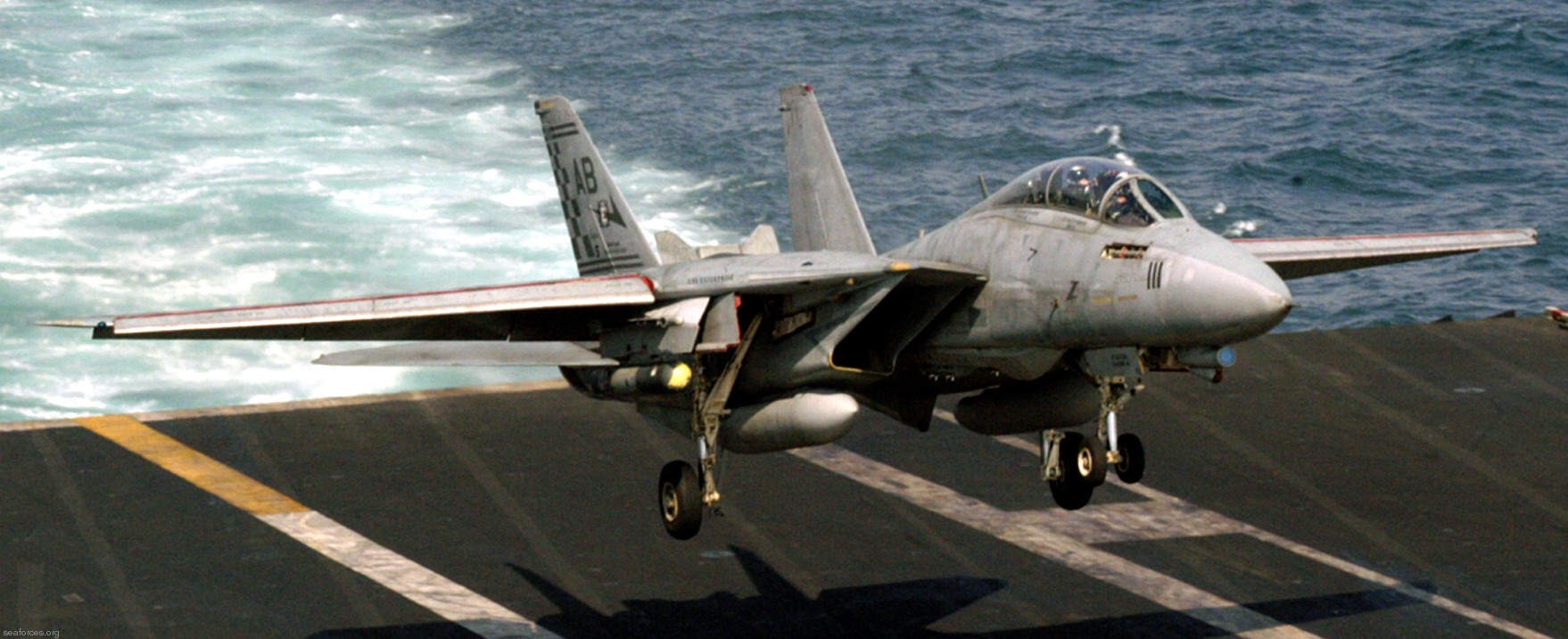 F-14A Tomcat (VF-211 / CVW-1) embarked on USS Enterprise (CVN 65) - January 2004 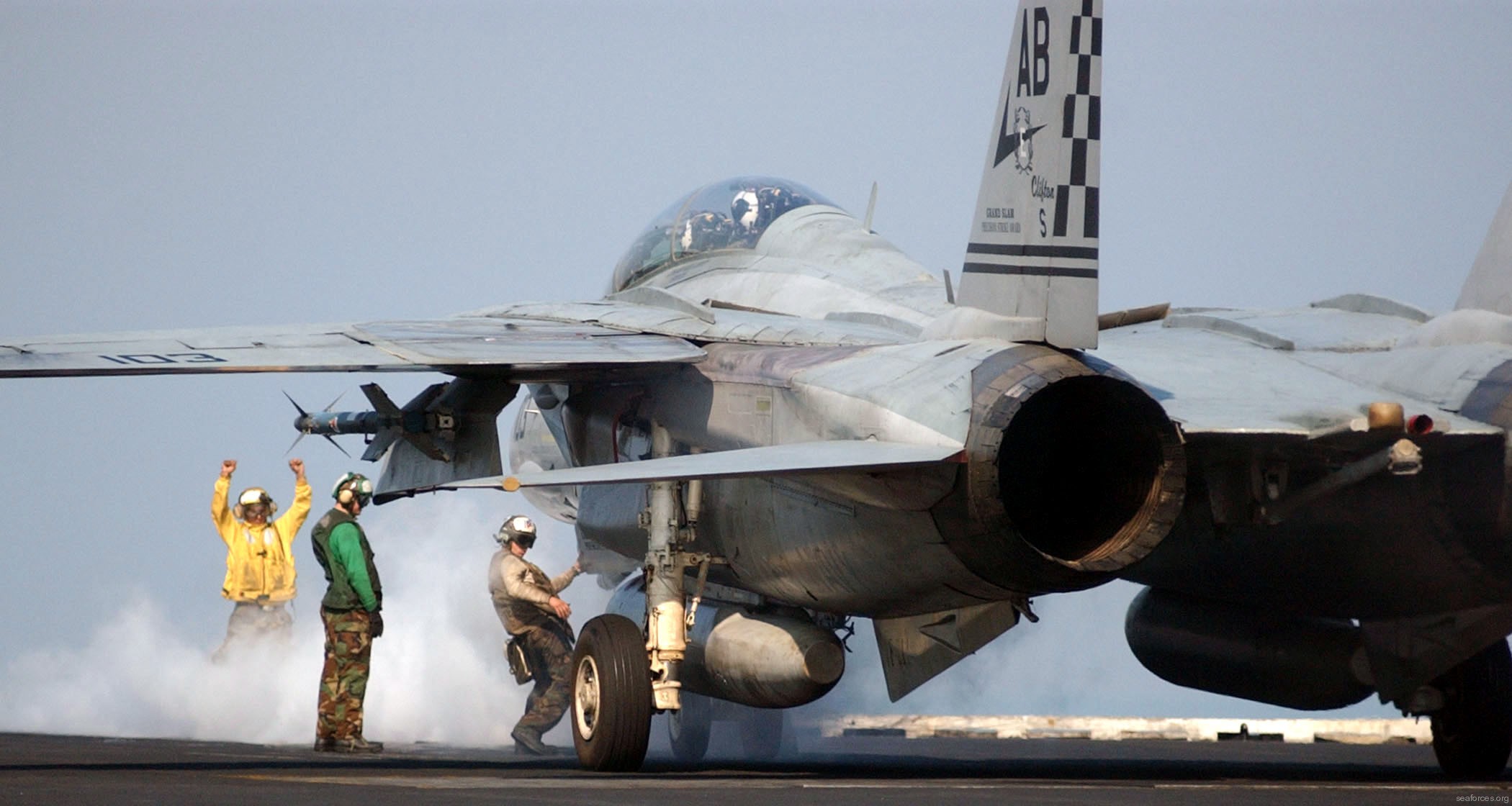 F-14A Tomcat (VF-211 / CVW-1) embarked on USS Enterprise (CVN 65) - January 2004 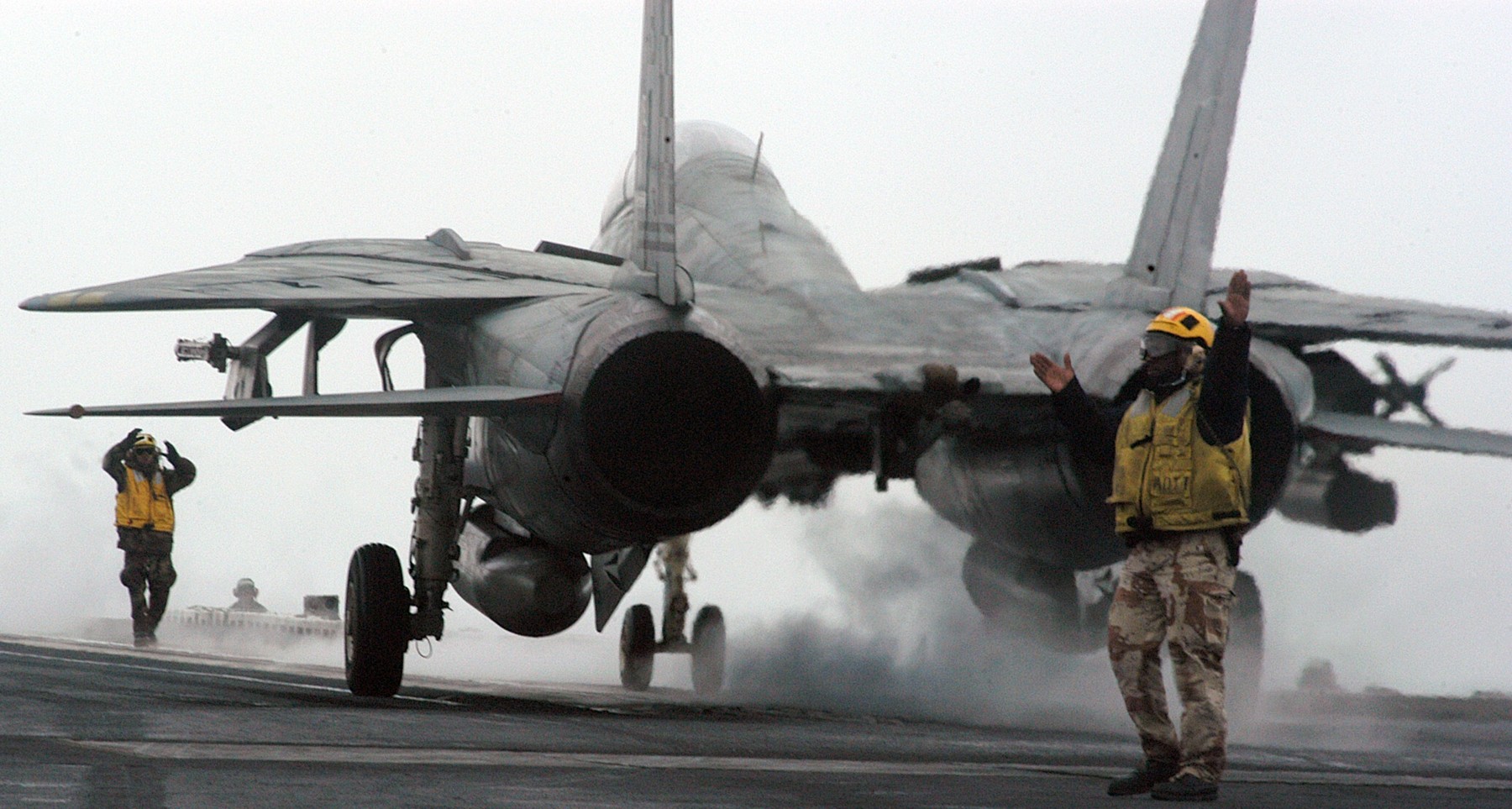 F-14A Tomcat (VF-211 / CVW-1) embarked on USS Enterprise (CVN 65) - January 2004 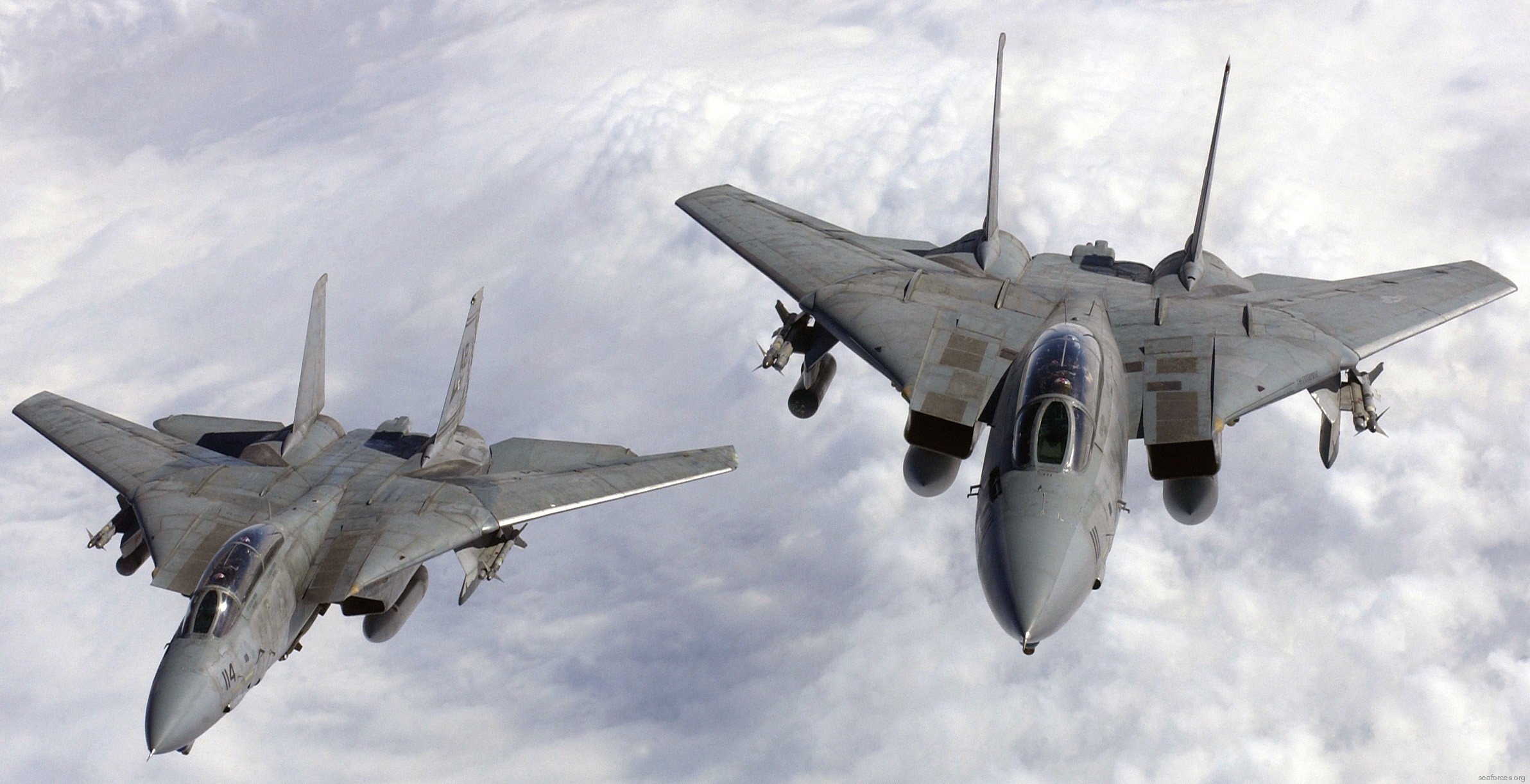 F-14A Tomcat (VF-211 / CVW-1) embarked on USS Enterprise (CVN 65) - 2003 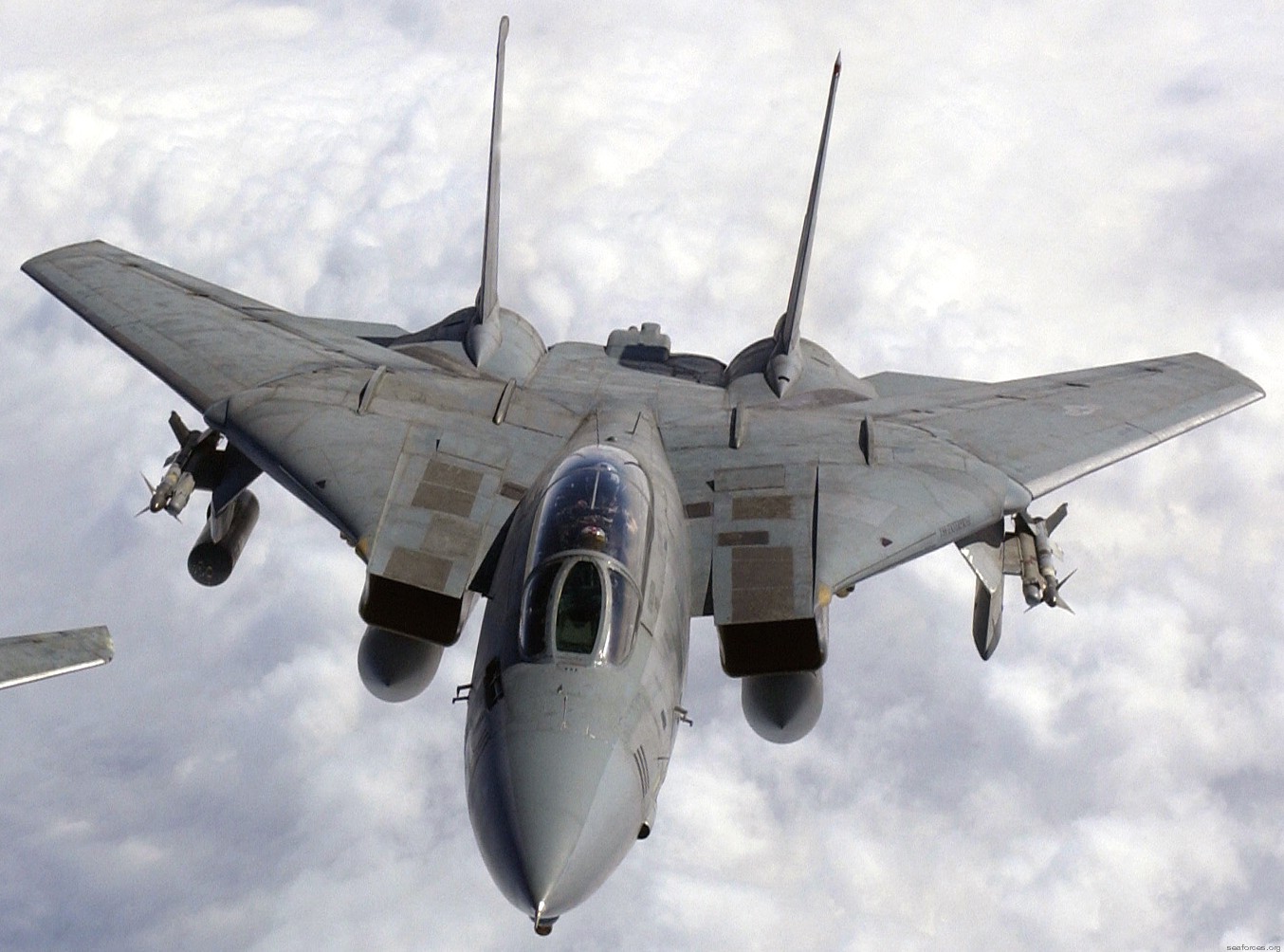 as above 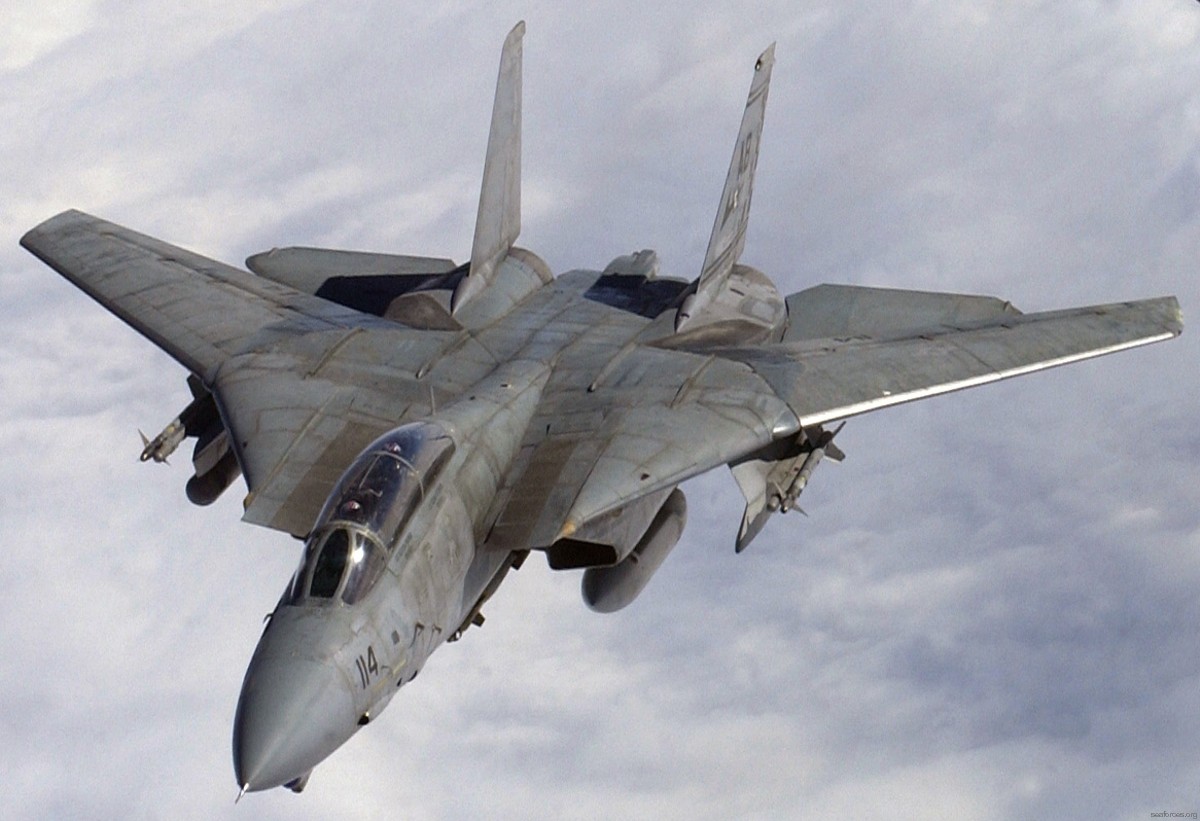 as above 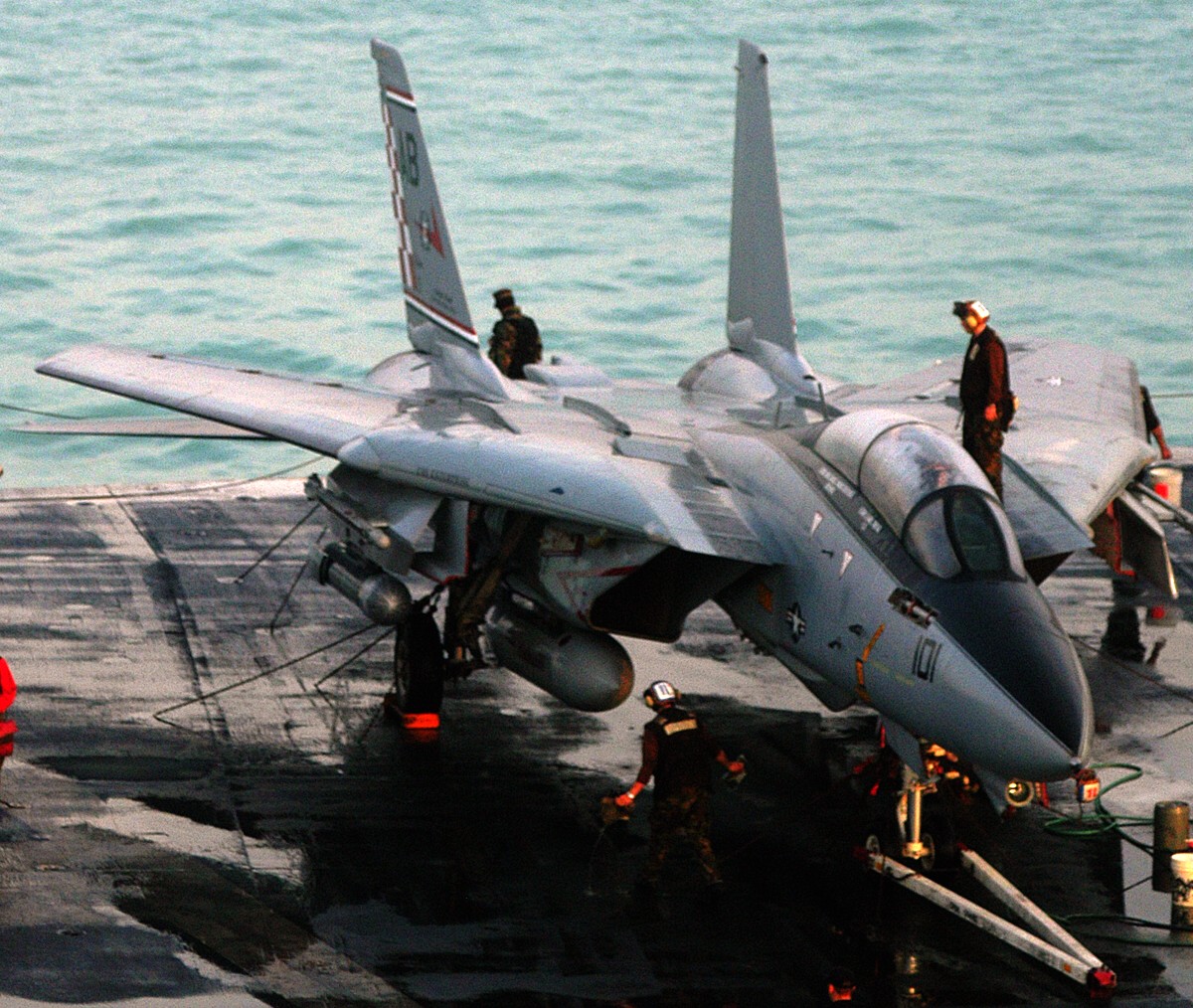 F-14A Tomcat (VF-211 / CVW-1) embarked on USS Enterprise (CVN 65) - December 2003 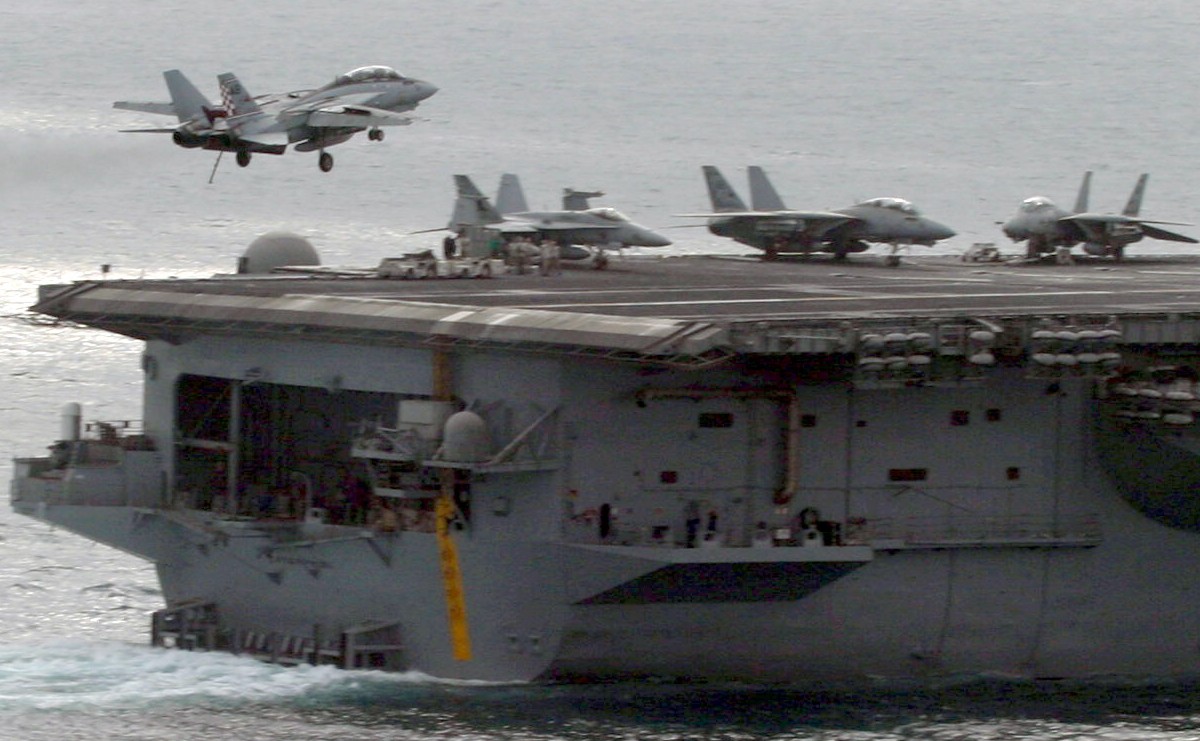 F-14A Tomcat (VF-211 / CVW-1) embarked on USS Enterprise (CVN 65) - December 2003 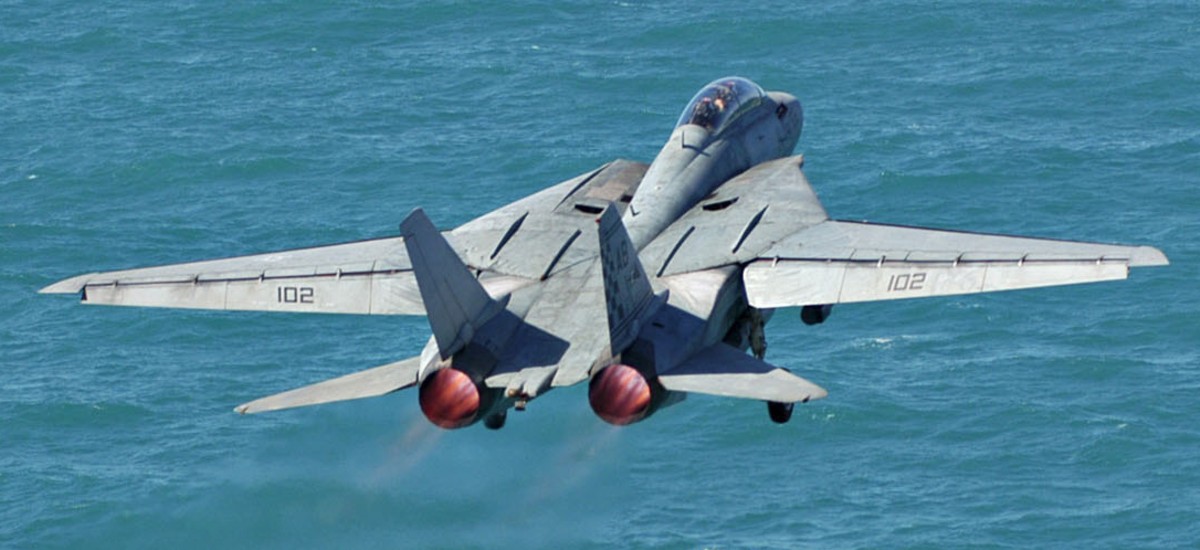 F-14A Tomcat (VF-211 / CVW-1) embarked on USS Enterprise (CVN 65) - November 2003 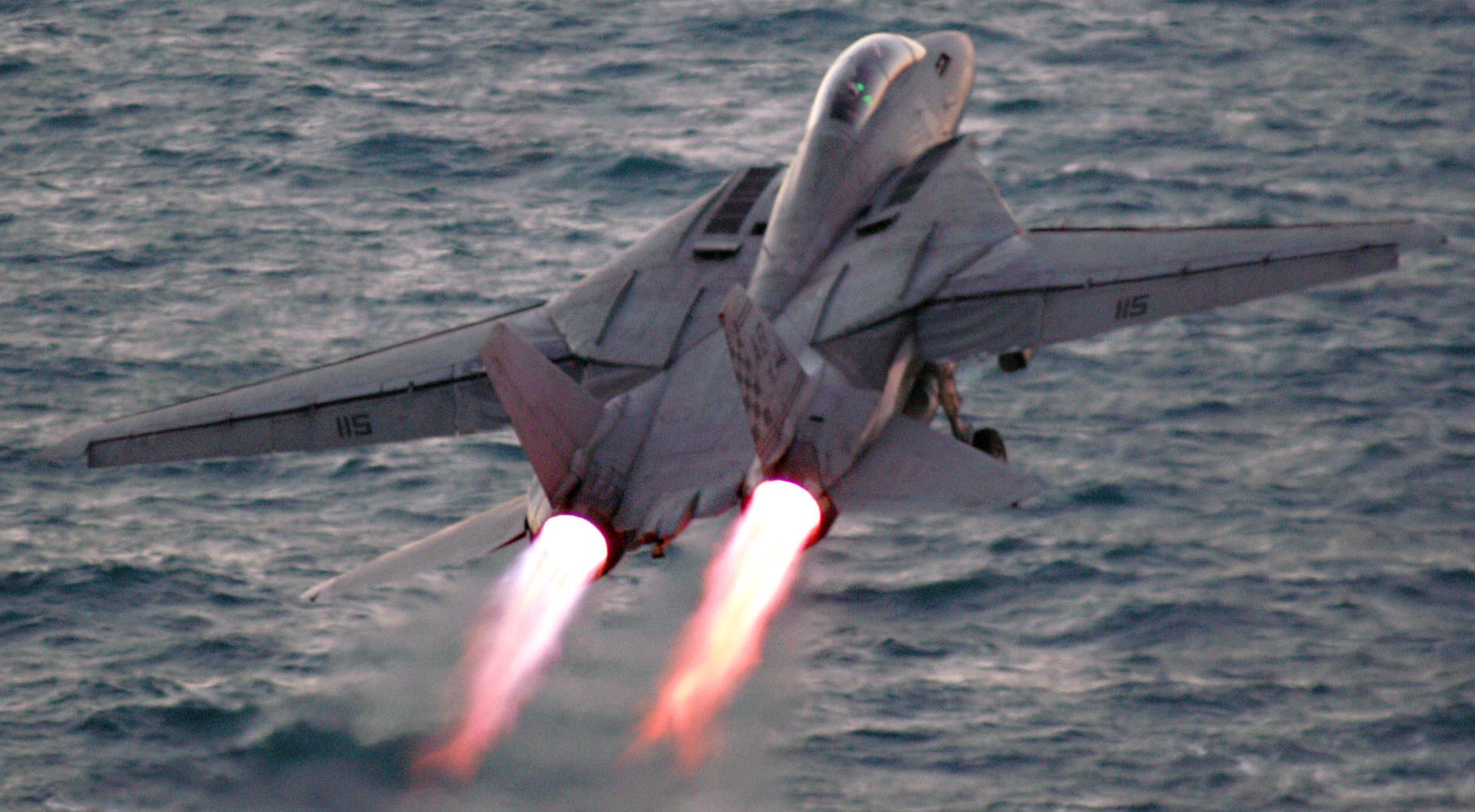 F-14A Tomcat (VF-211 / CVW-1) embarked on USS Enterprise (CVN 65) - November 2003 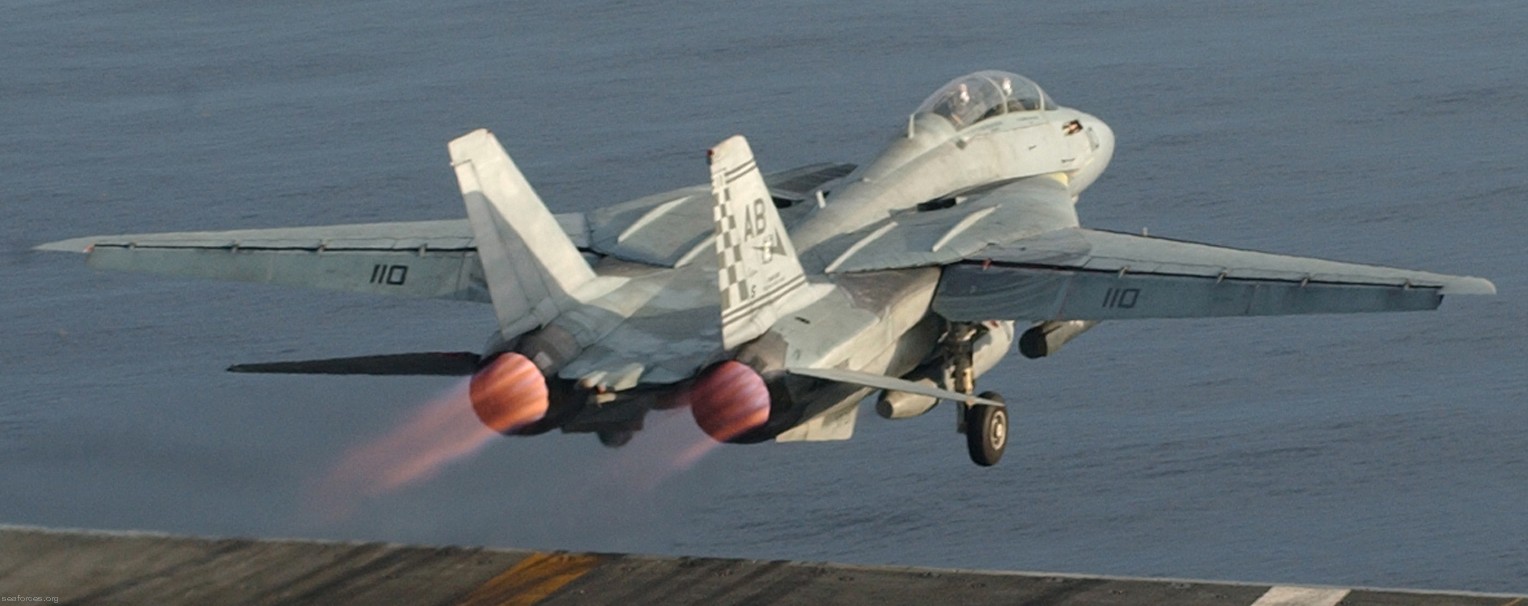 F-14A Tomcat (VF-211 / CVW-1) embarked on USS Enterprise (CVN 65) - September 2003 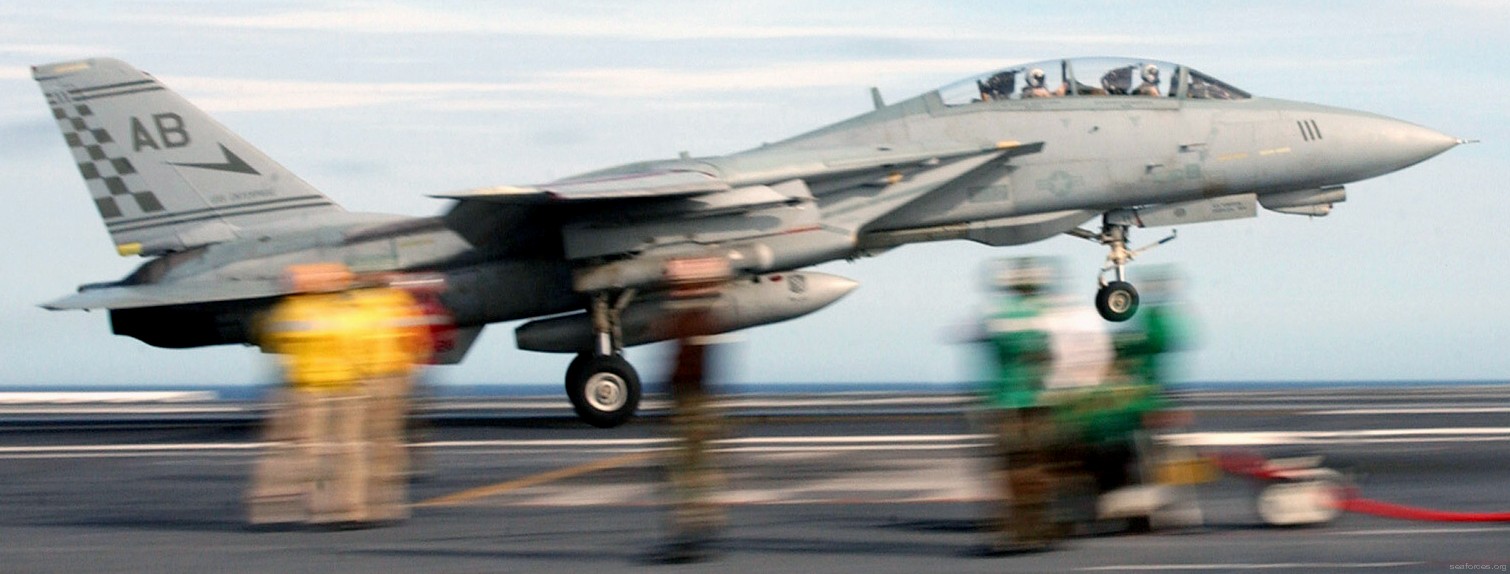 F-14A Tomcat (VF-211 / CVW-1) landing aboard USS Theodore Roosevelt (CVN 71) during flight deck certifications - November 2002 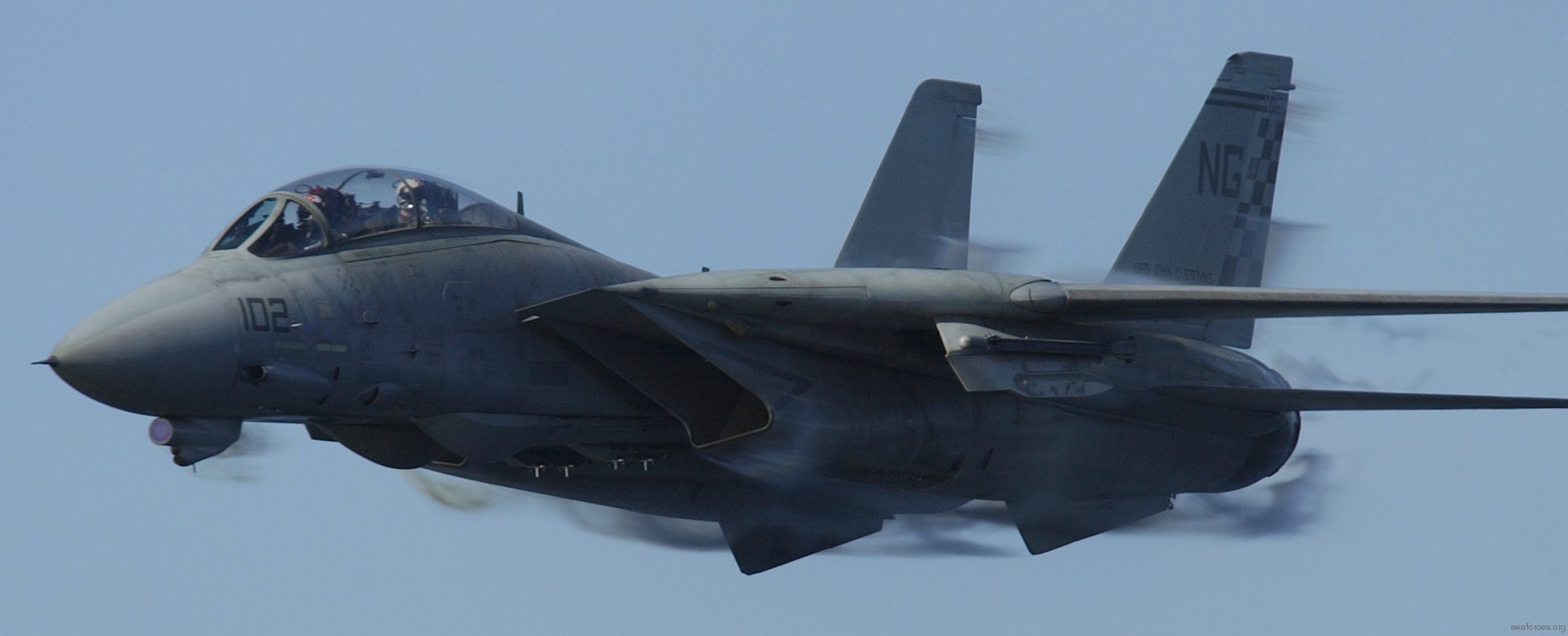 F-14A Tomcat (VF-211 / CVW-9) embarked on USS John C. Stennis (CVN 74) - May 2002 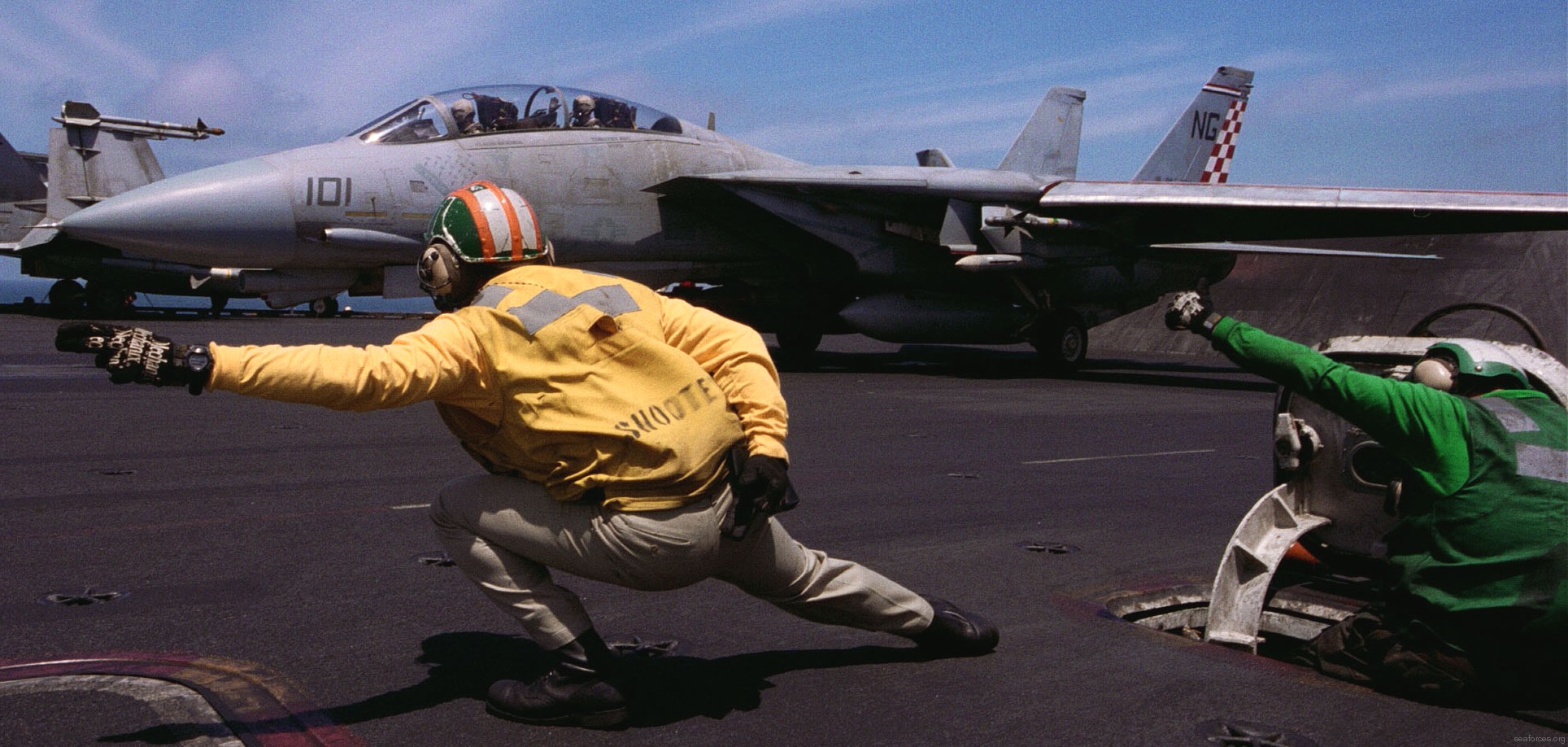 F-14A Tomcat (VF-211 / CVW-9) embarked on USS John C. Stennis (CVN 74) - April 2002 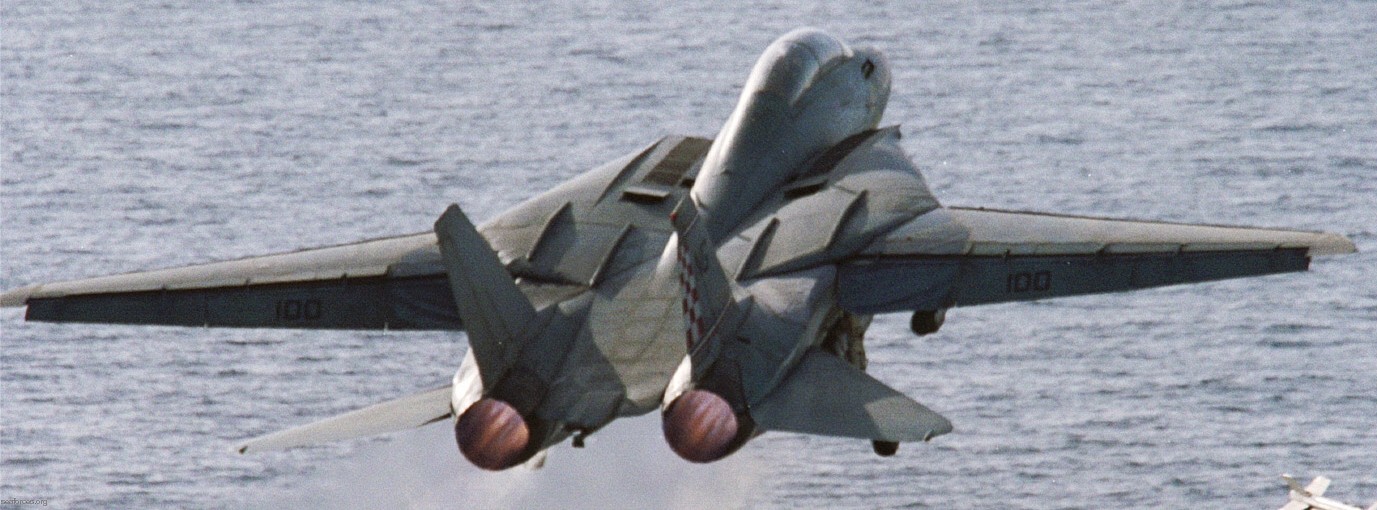 F-14A Tomcat (VF-211 / CVW-9) embarked on USS John C. Stennis (CVN 74) - March 2002 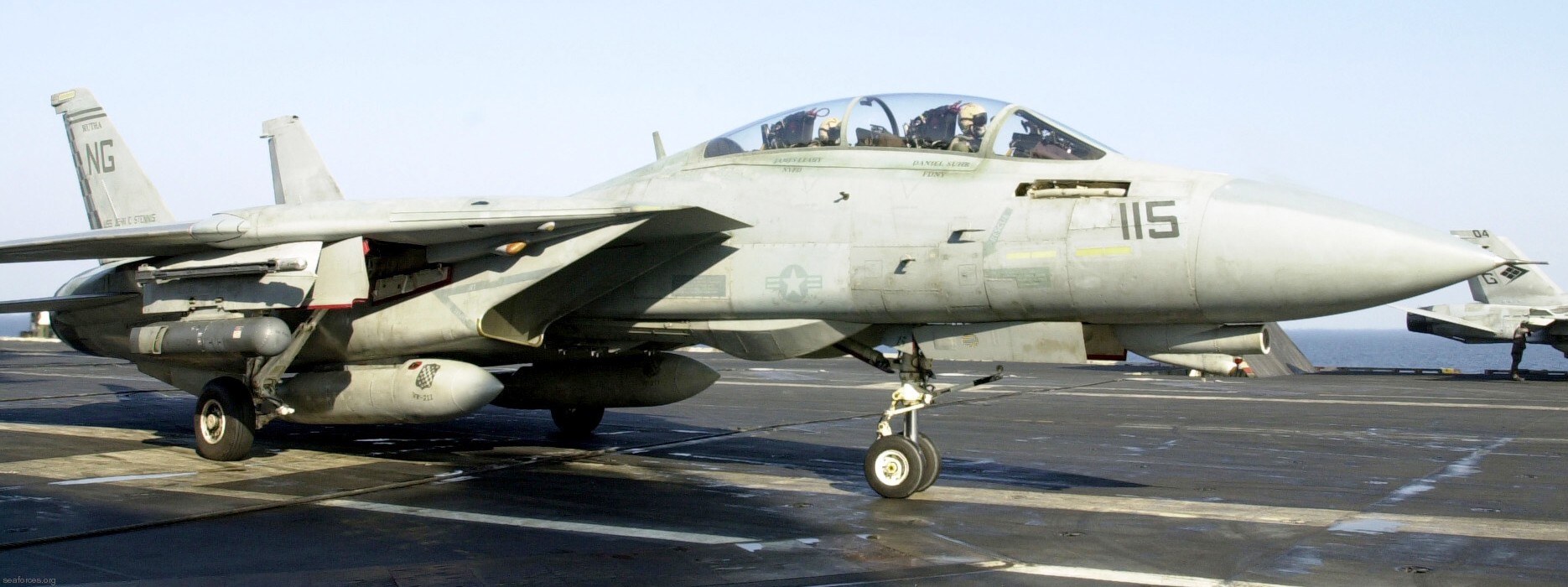 F-14A Tomcat (VF-211 / CVW-9) embarked on USS John C. Stennis (CVN 74) - January 2002 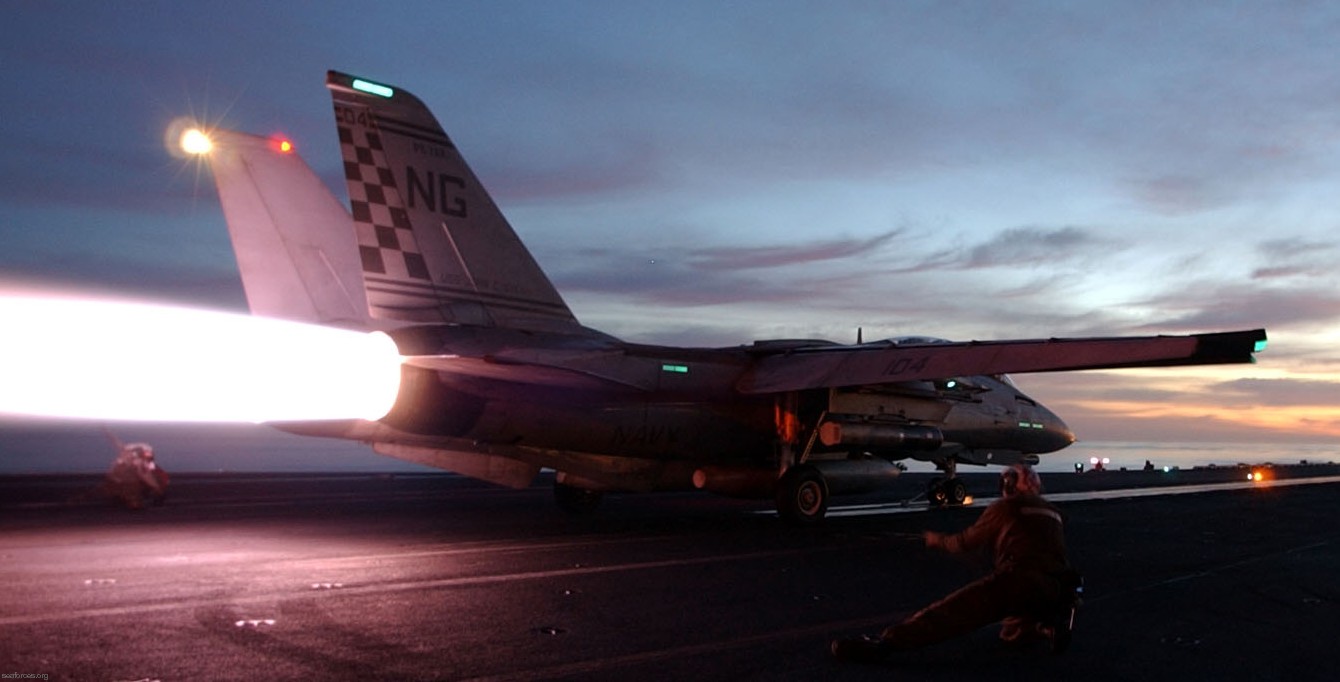 F-14A Tomcat (VF-211 / CVW-9) embarked on USS John C. Stennis (CVN 74) - January 2002 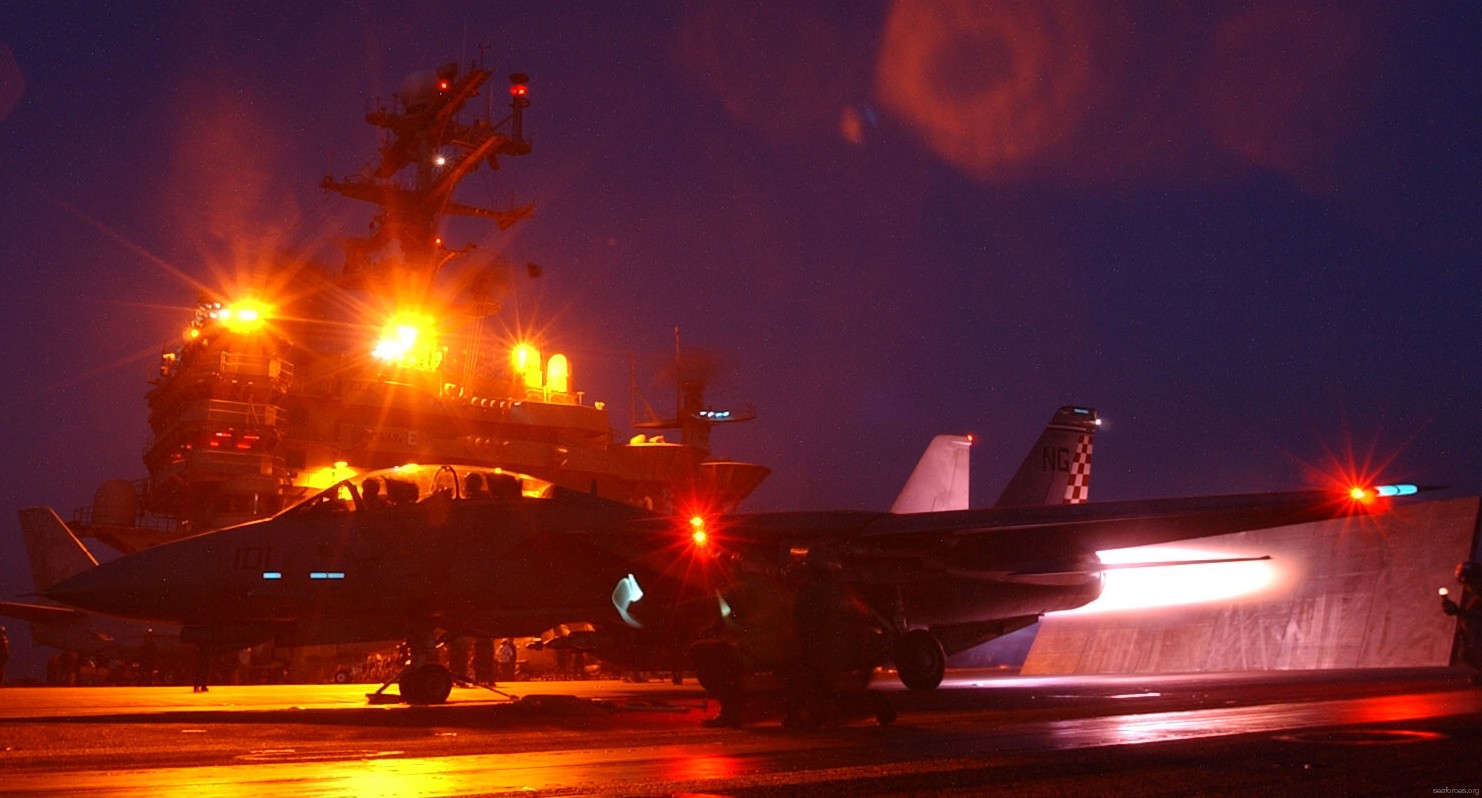 F-14A Tomcat (VF-211 / CVW-9) embarked on USS John C. Stennis (CVN 74) - January 2002 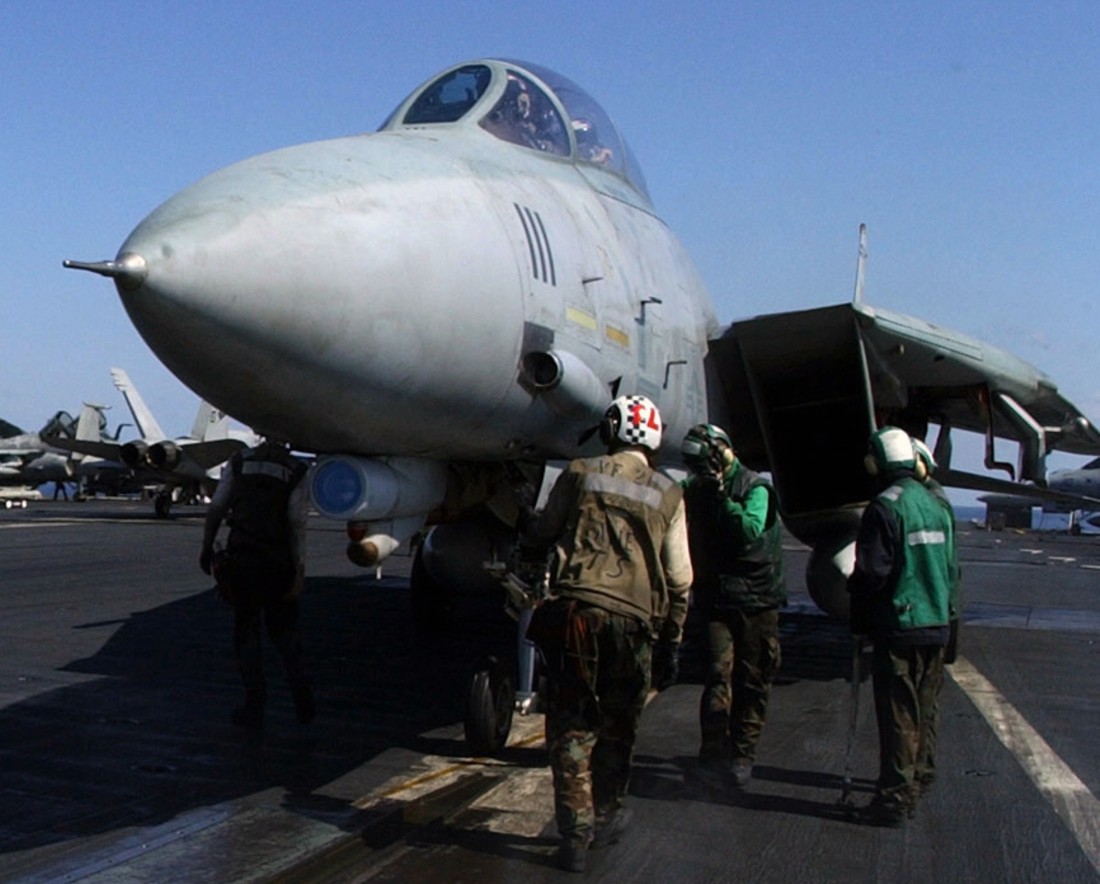 F-14A Tomcat (VF-211 / CVW-9) embarked on USS John C. Stennis (CVN 74) - January 2002 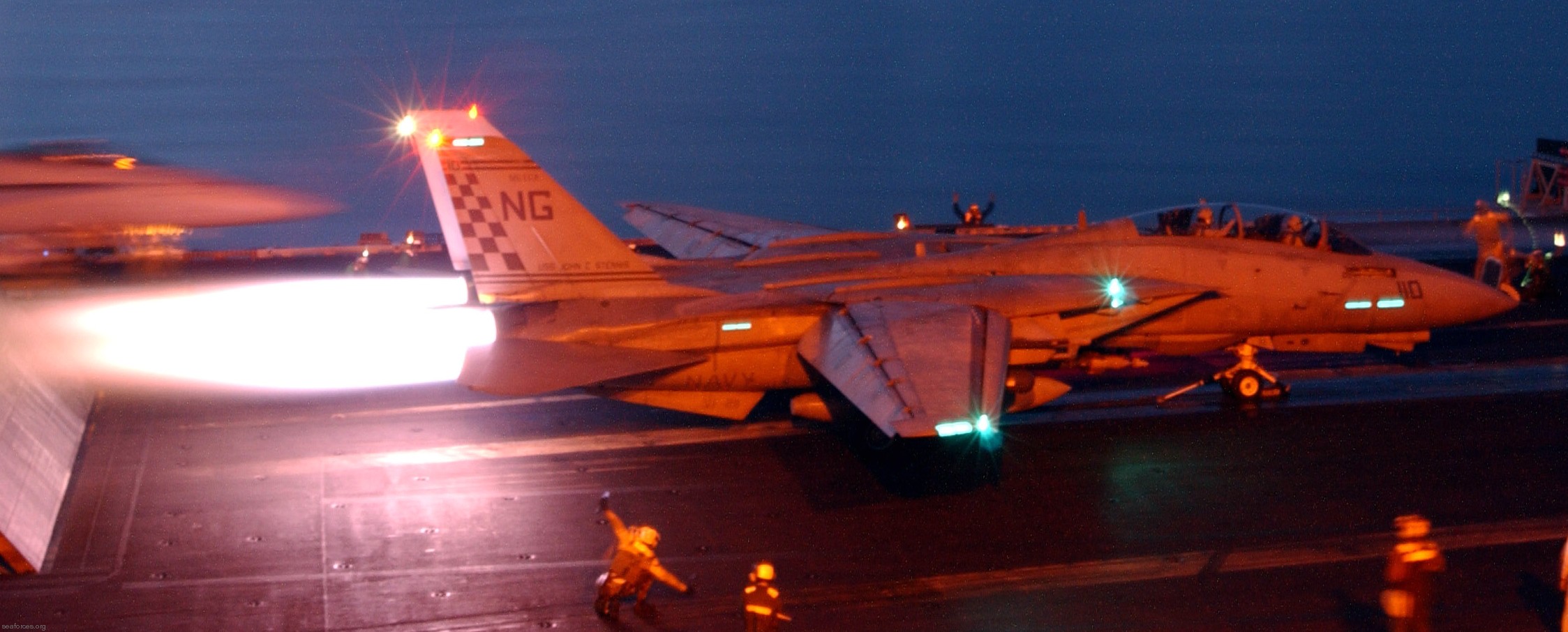 F-14A Tomcat (VF-211 / CVW-9) embarked on USS John C. Stennis (CVN 74) - December 2001 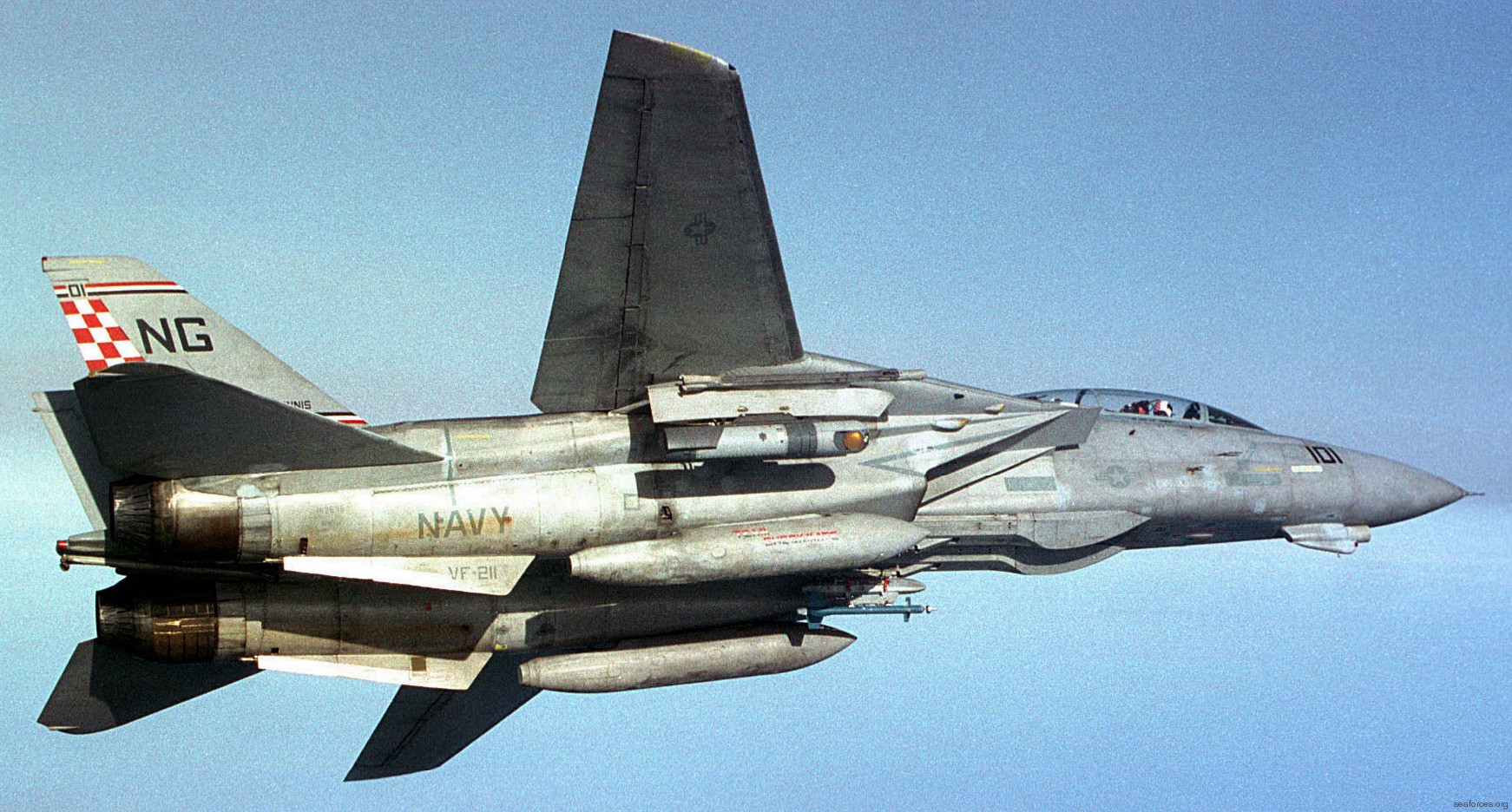 F-14A Tomcat (VF-211 / CVW-9) embarked on USS John C. Stennis (CVN 74) - January 2000 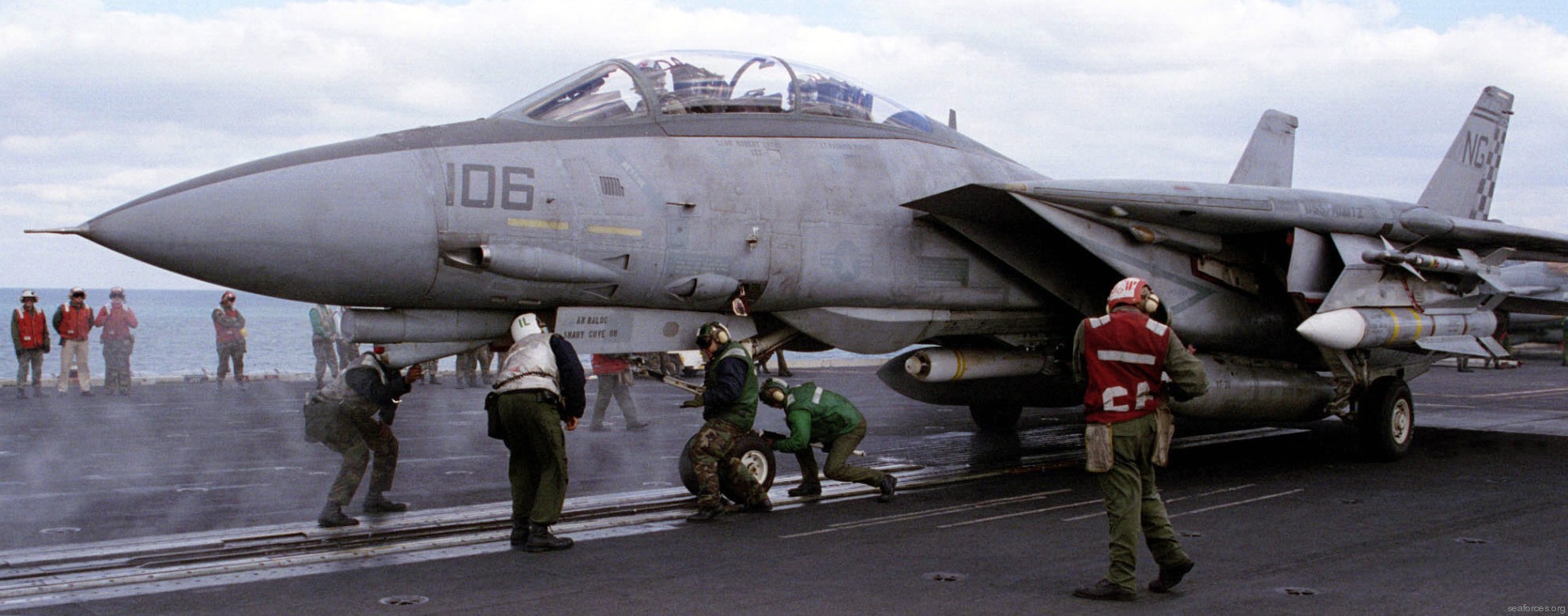 F-14A Tomcat (VF-211 / CVW-9) embarked on USS Nimitz (CVN 68) - January 1998 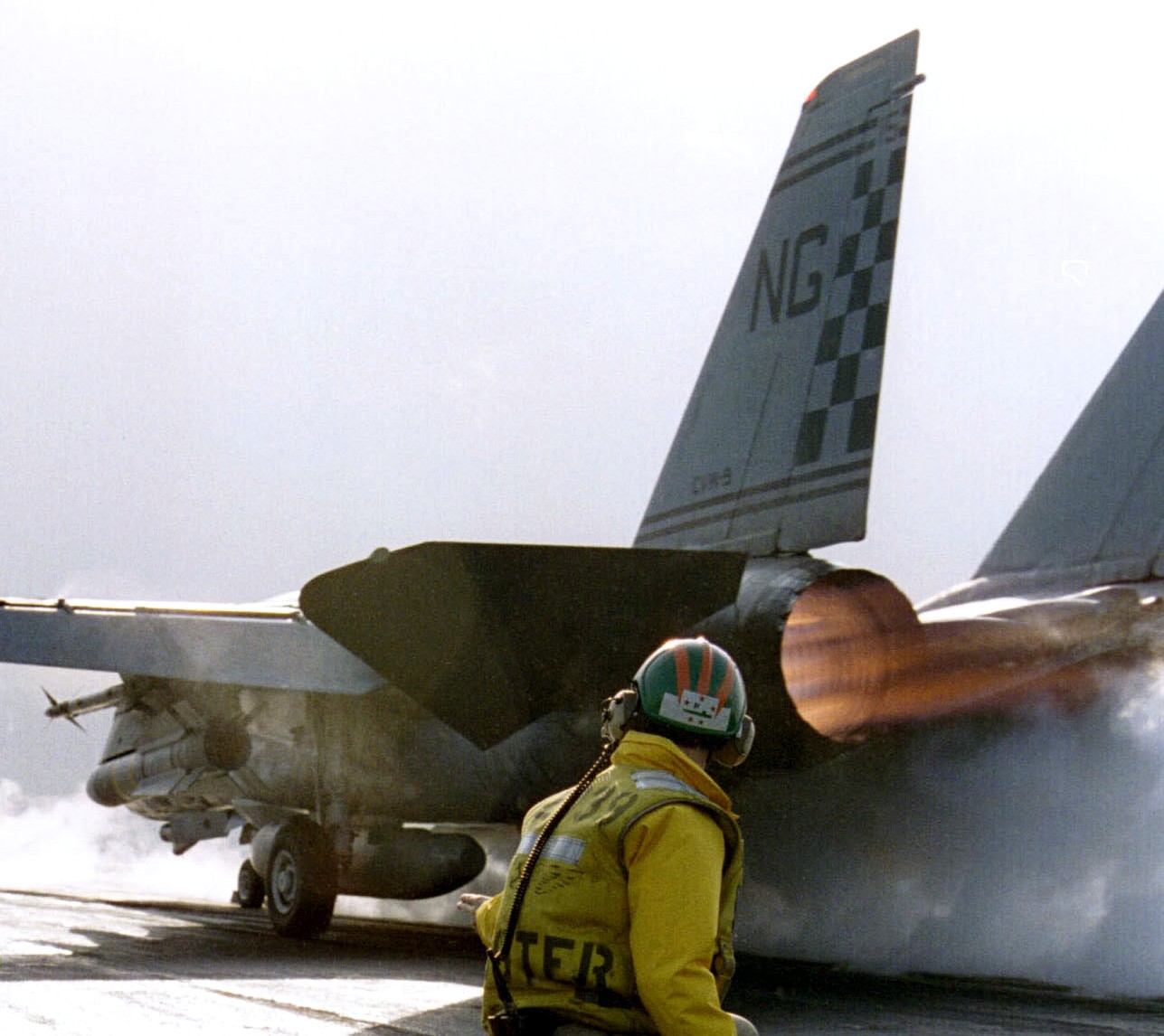 F-14A Tomcat (VF-211 / CVW-9) embarked on USS Nimitz (CVN 68) - January 1998 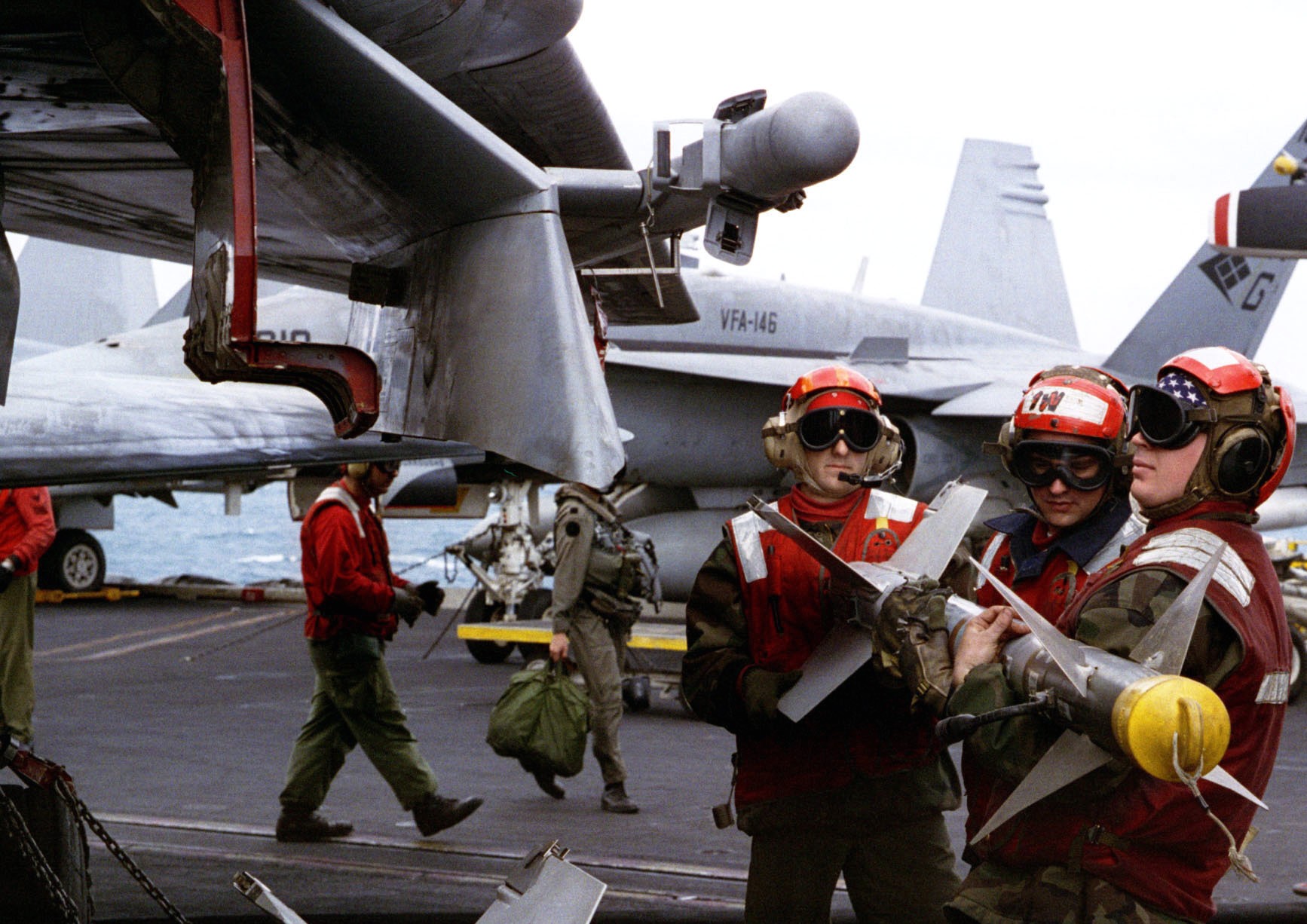 F-14A Tomcat (VF-211 / CVW-9) embarked on USS Nimitz (CVN 68) was loaded with an AIM-9 Sidewinder missile - January 1998 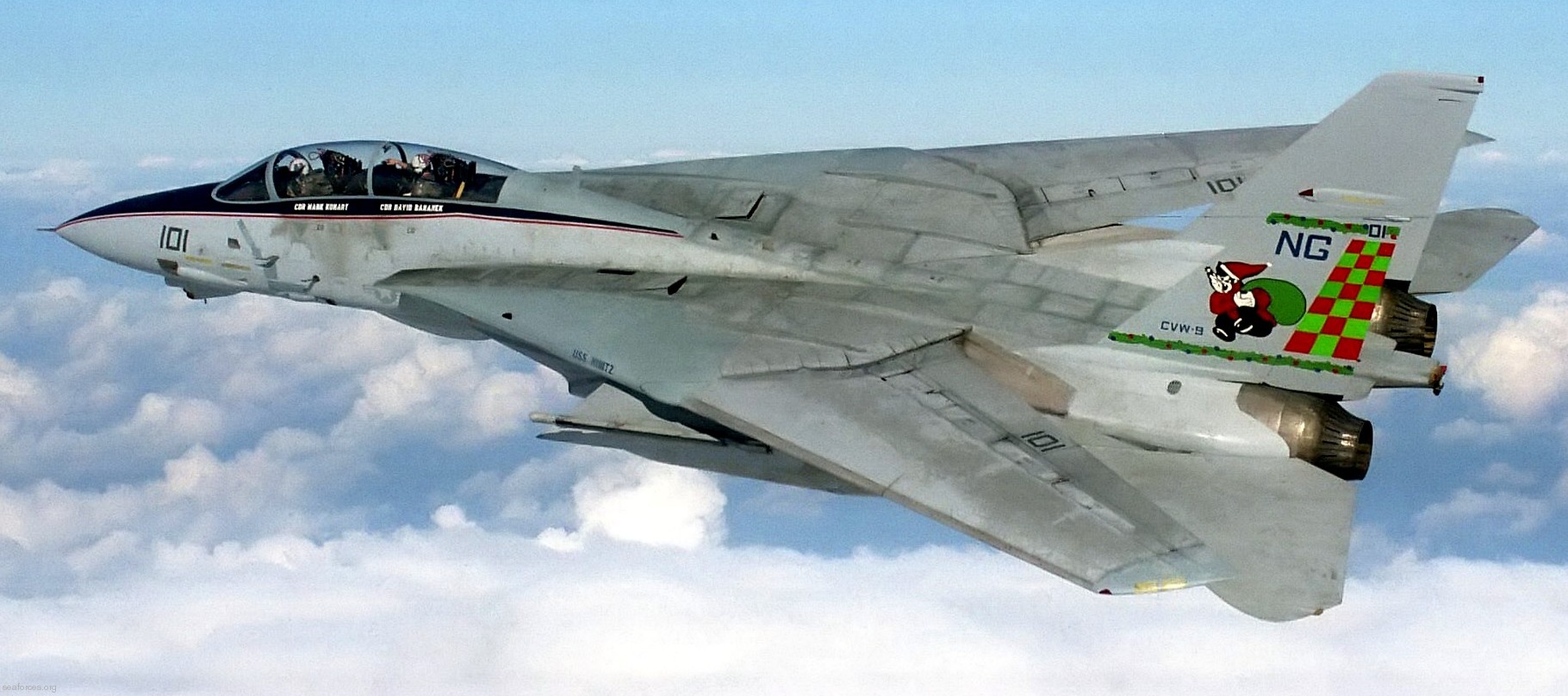 F-14A Tomcat (VF-211 / CVW-9) embarked on USS Nimitz (CVN 68) - December 1997 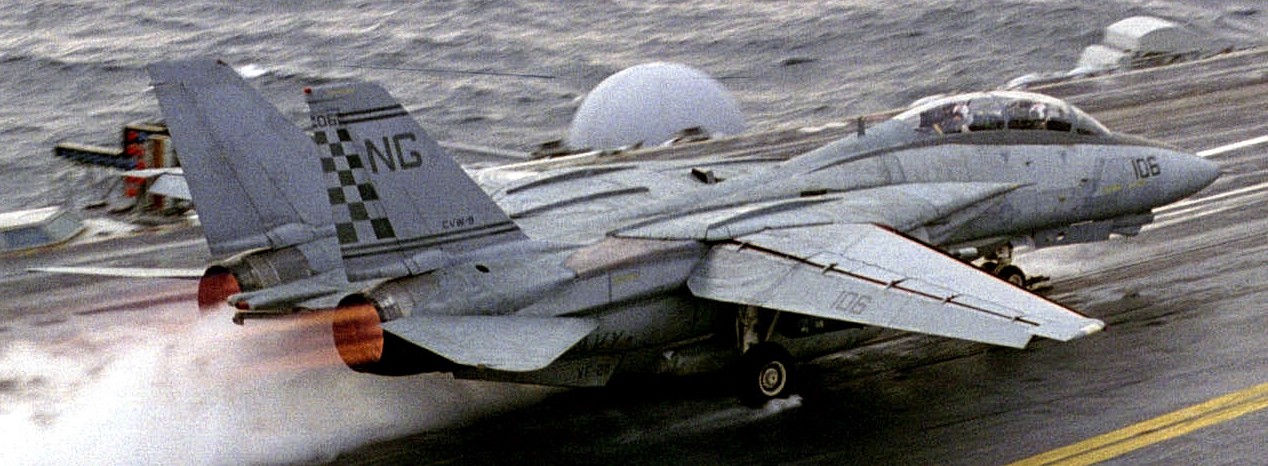 F-14A Tomcat (VF-211 / CVW-9) embarked on USS Nimitz (CVN 68) during Operation Southern Watch - November 1997 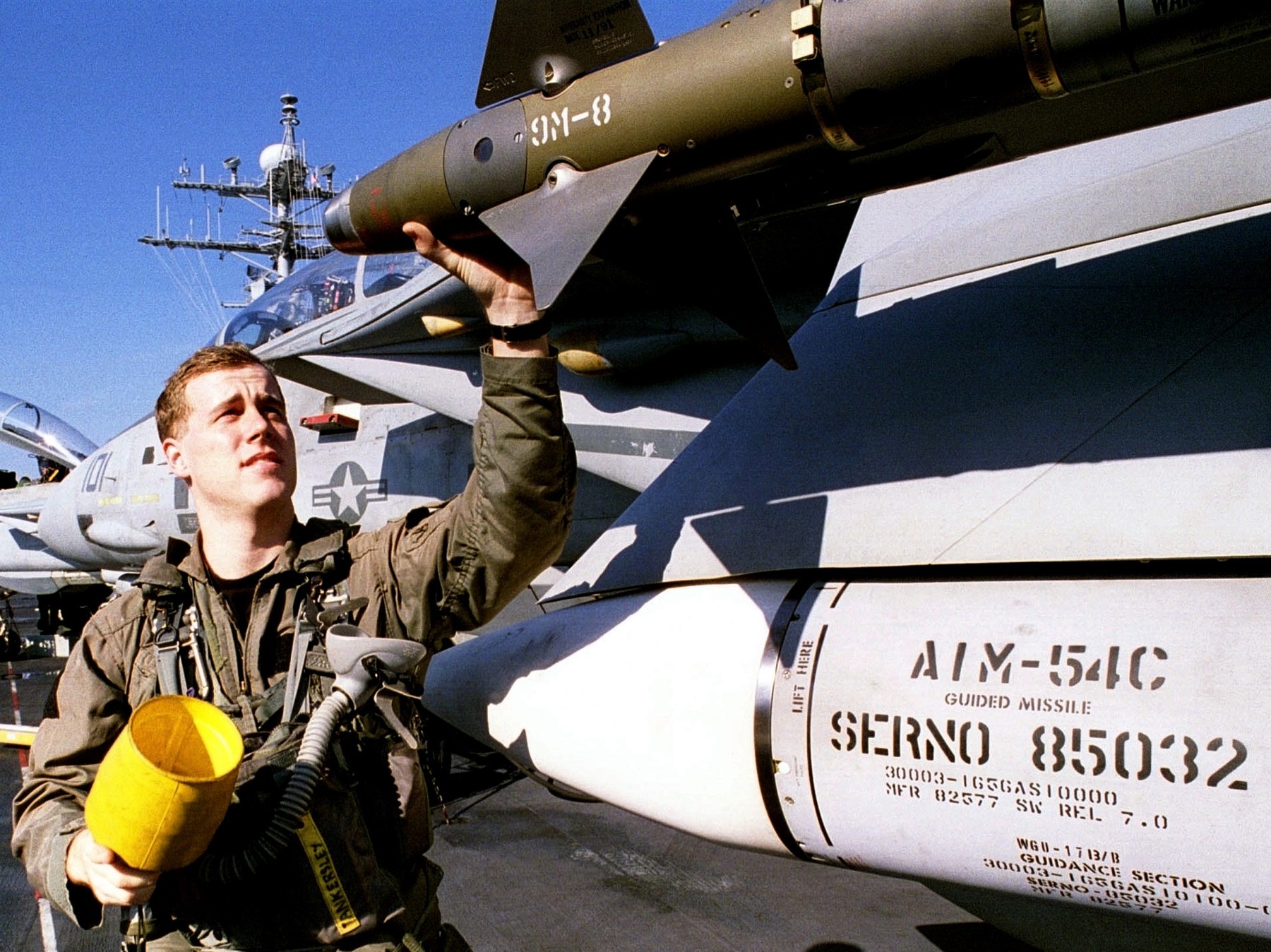 F-14A Tomcat (VF-211 / CVW-9) embarked on USS Nimitz (CVN 68) - November 1997 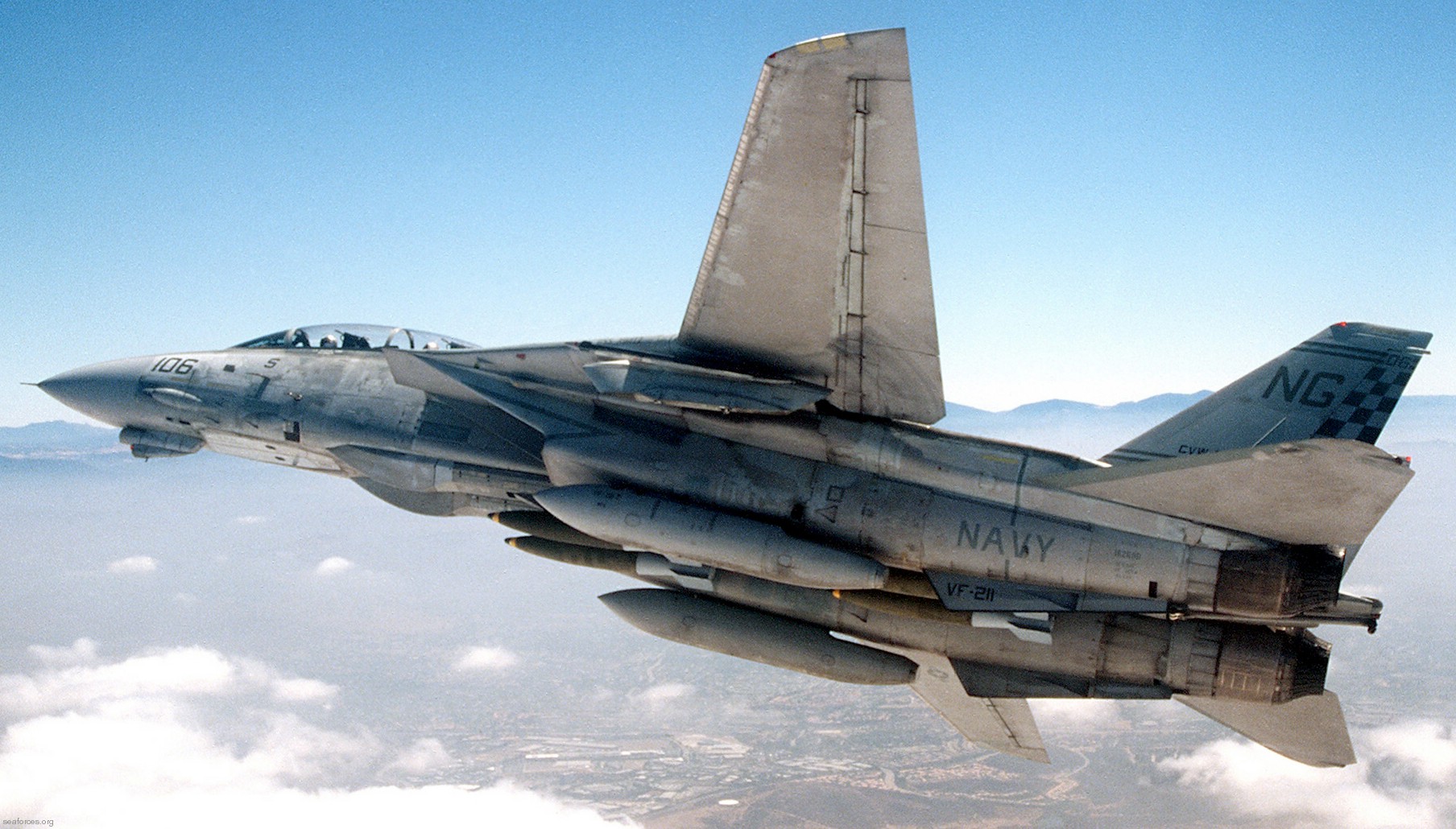 F-14A Tomcat (VF-211 / CVW-9) over California - July 1996 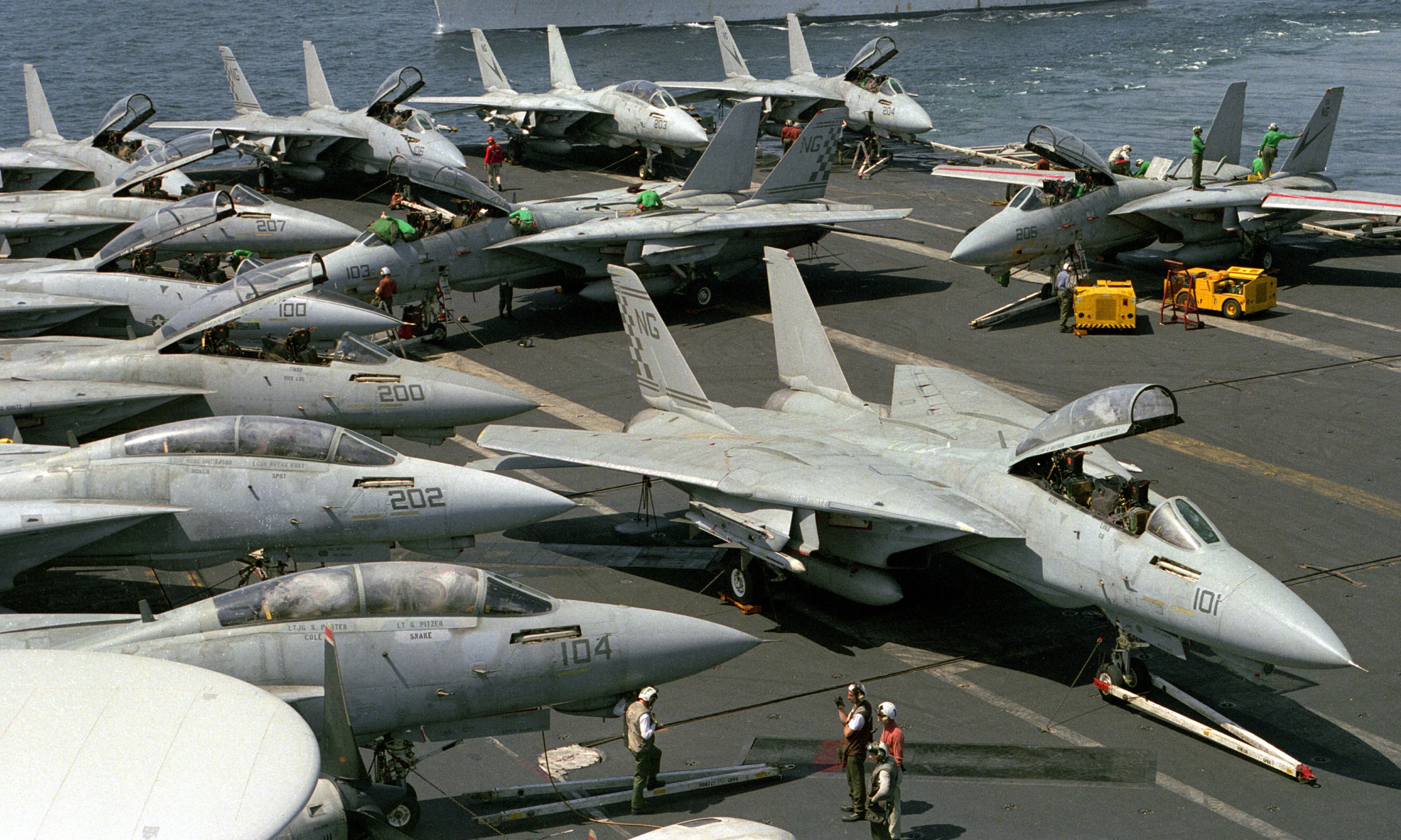 F-14A Tomcats, 1xx (VF-211 / CVW-9) embarked on USS Nimitz (CVN 68) - 1993 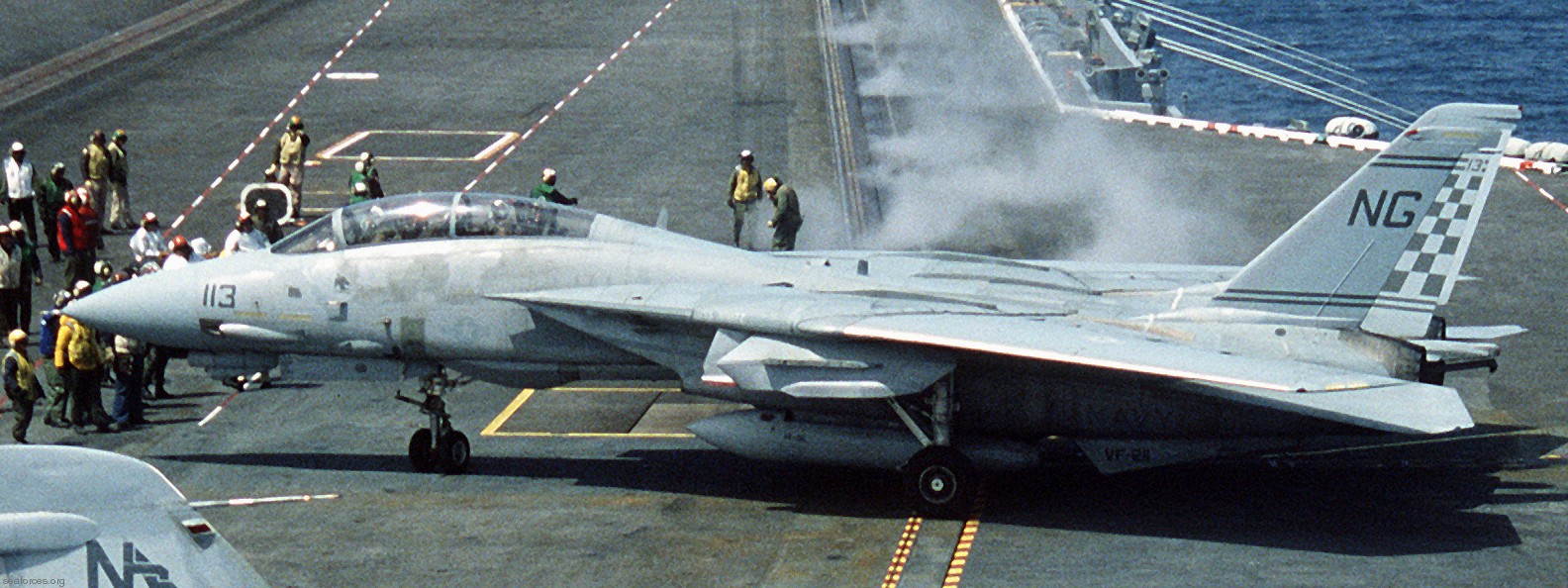 F-14A Tomcat (VF-211 / CVW-9) embarked on USS Nimitz (CVN 68) - 1992 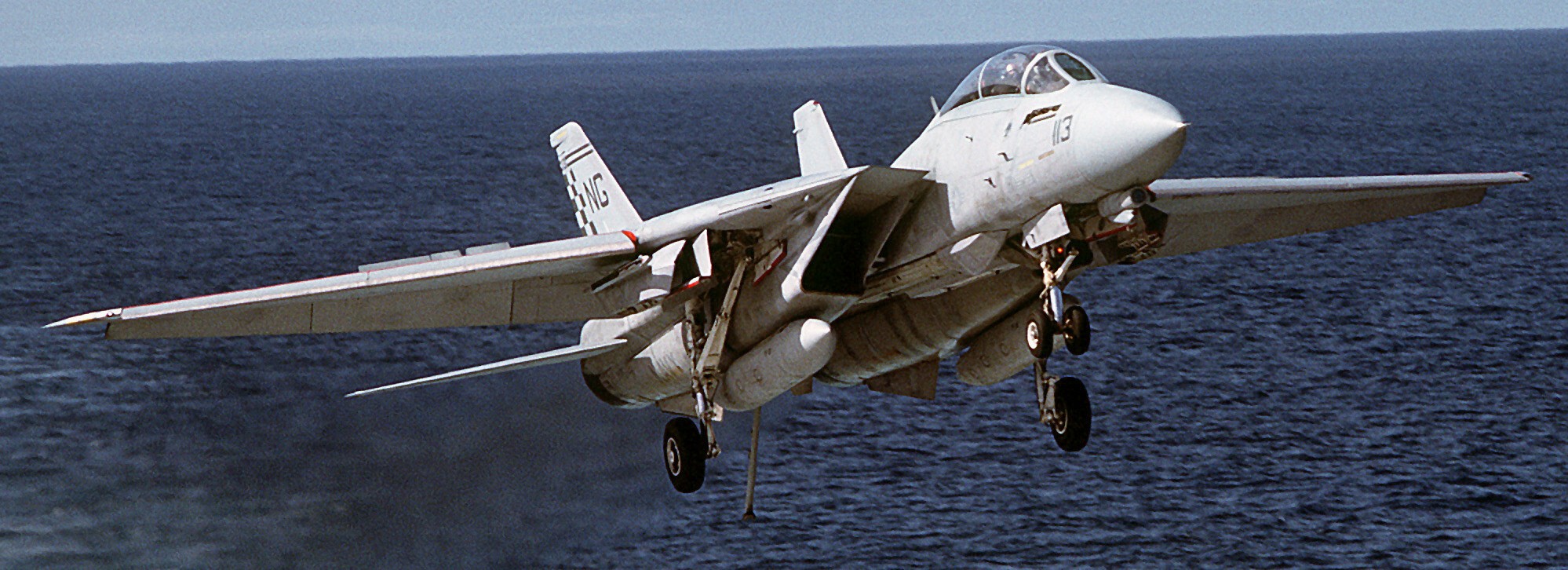 F-14A Tomcat (VF-211 / CVW-9) embarked on USS Nimitz (CVN 68) - 1992 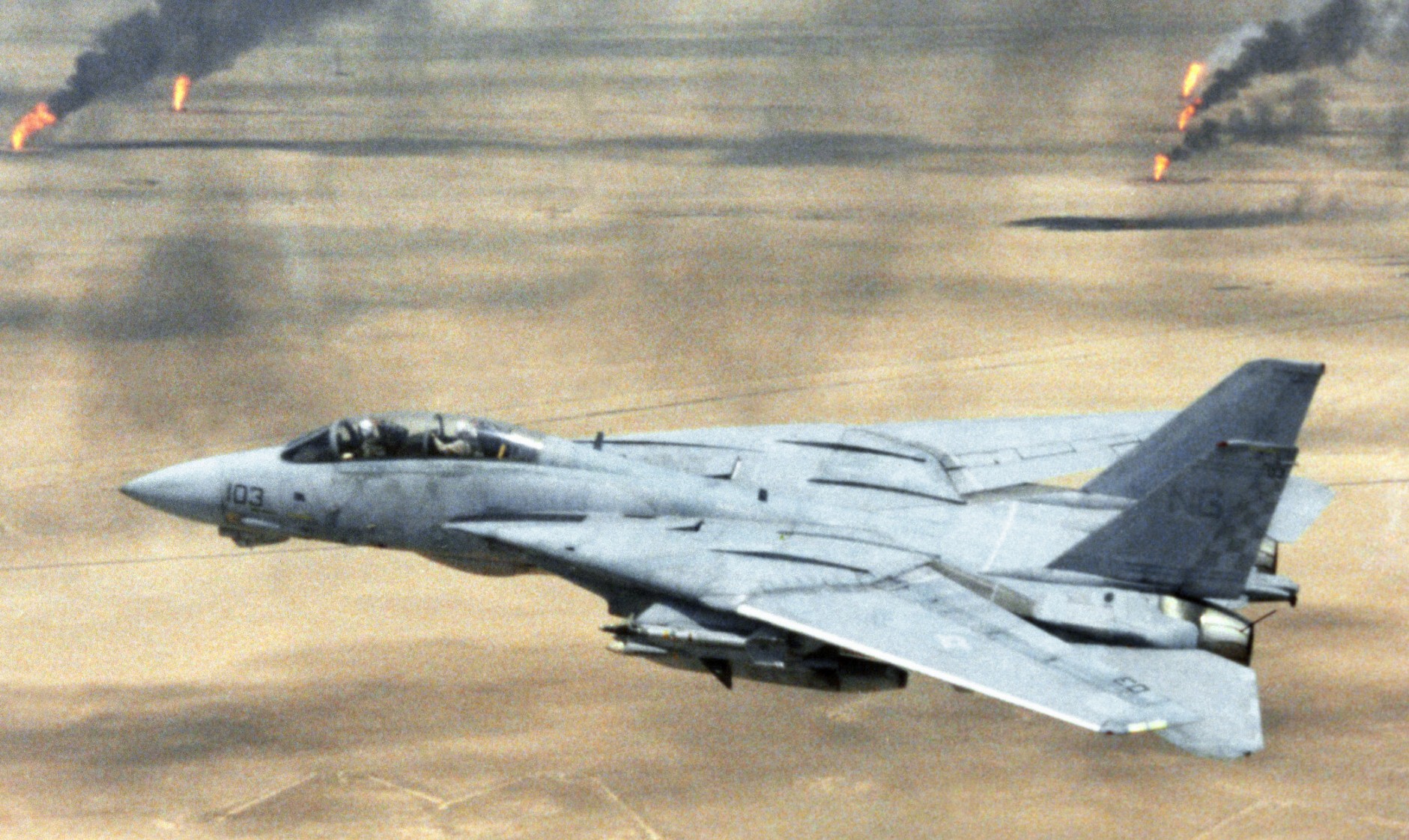 F-14B Tomcat (VF-211 / CVW-9) embarked on USS Nimitz (CVN 68) over Kuwait - 1991 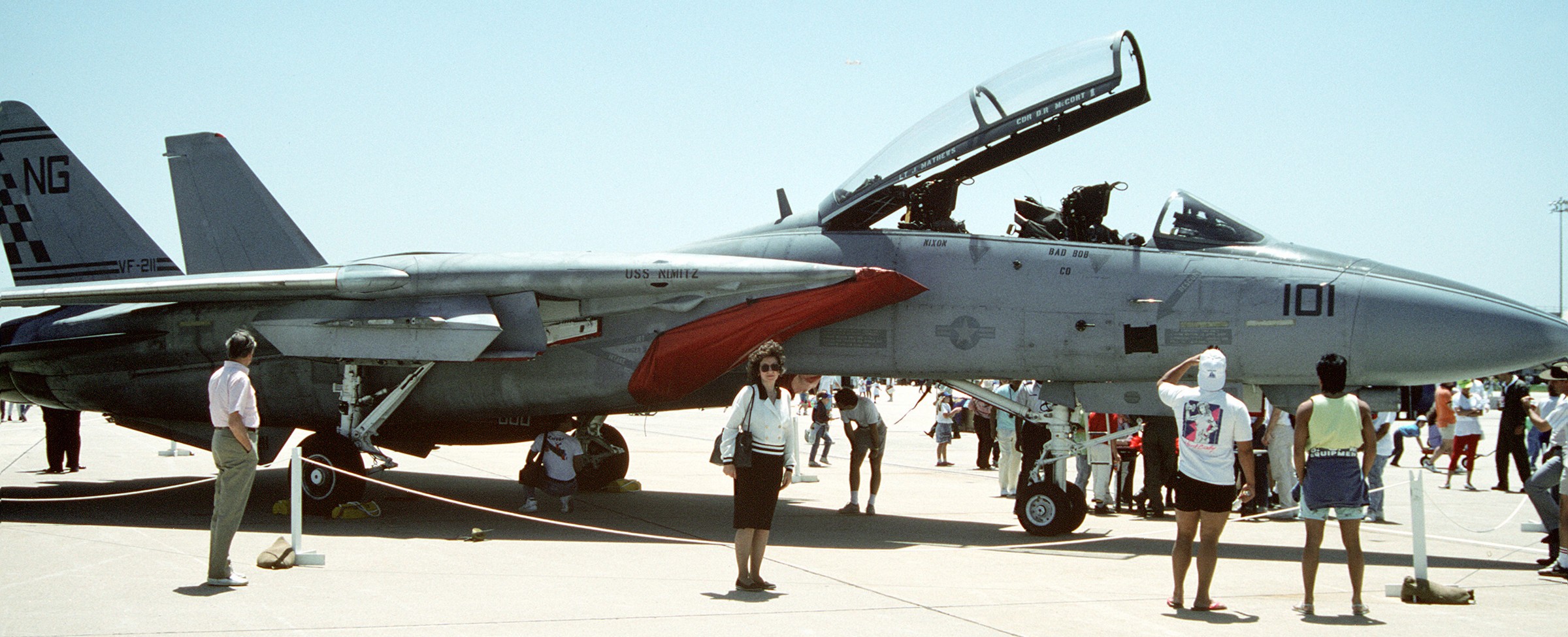 F-14B Tomcat (VF-211 / CVW-9) at Andrews AFB, Maryland - May 1990 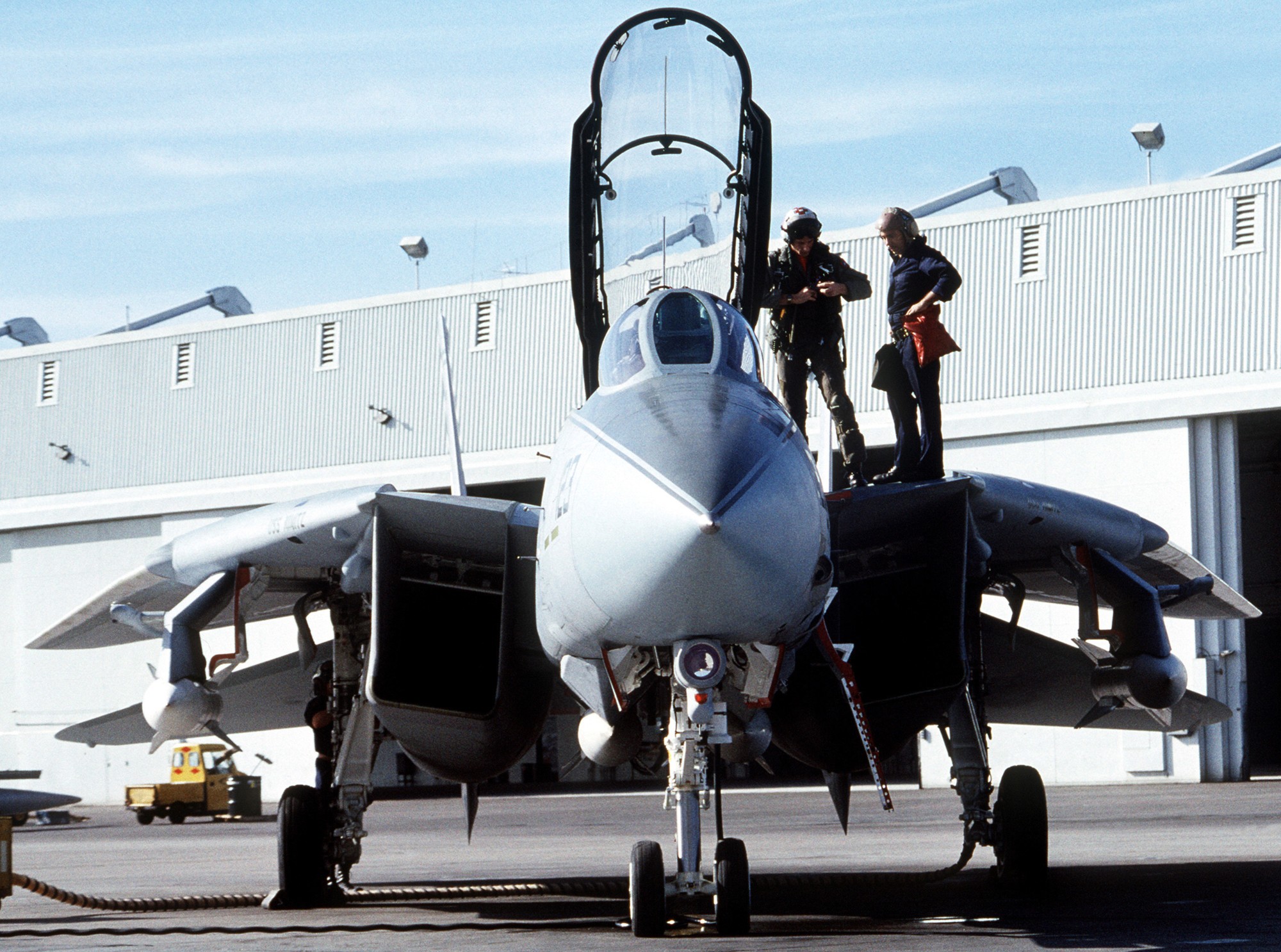 F-14A Tomcat (VF-211 / CVW-9) at NAS Miramar, California - November 1989 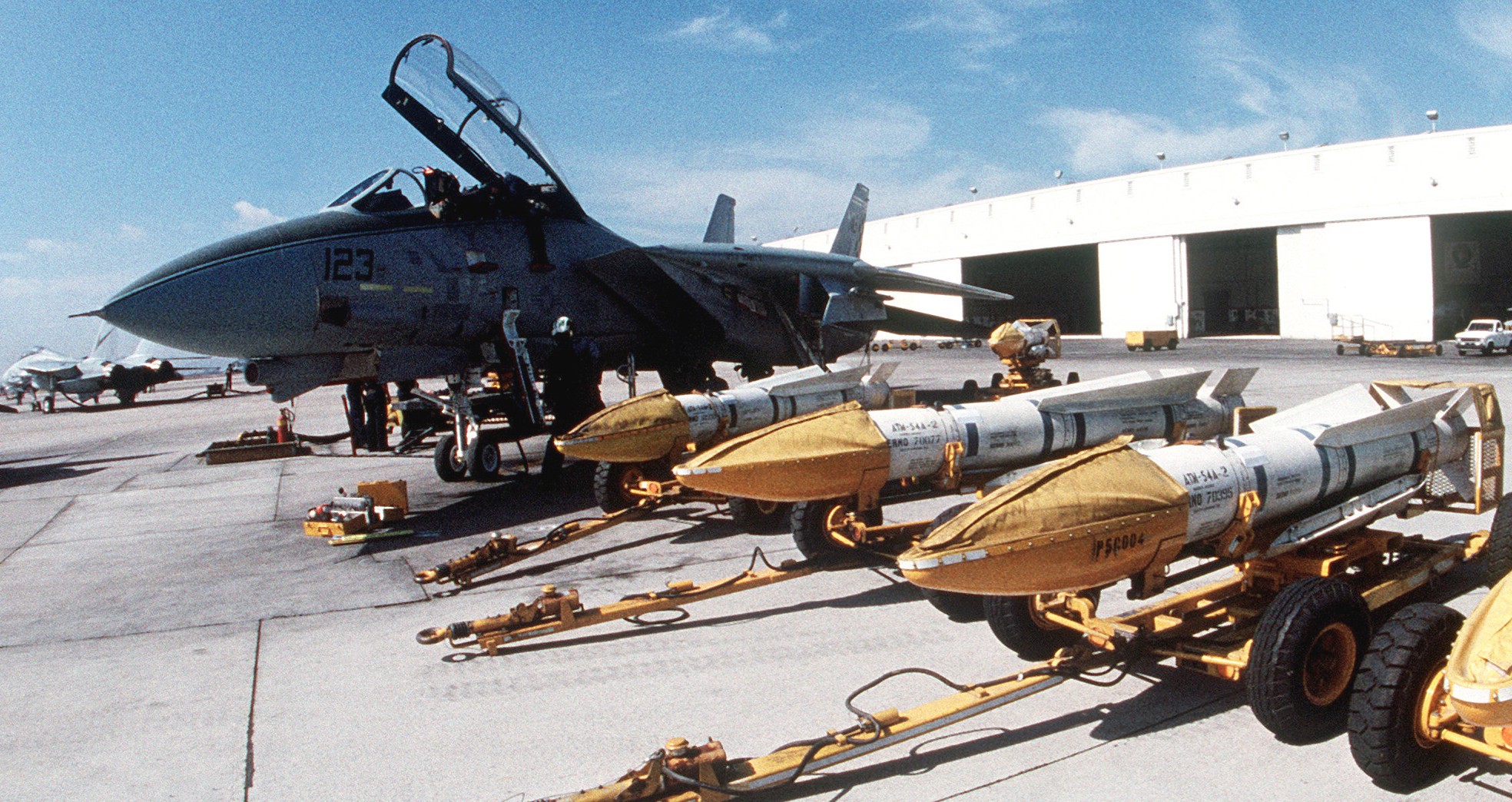 F-14A Tomcat (VF-211 / CVW-9) at NAS Miramar, California - note the prepared ATM-54 Phoenix training missiles - November 1989 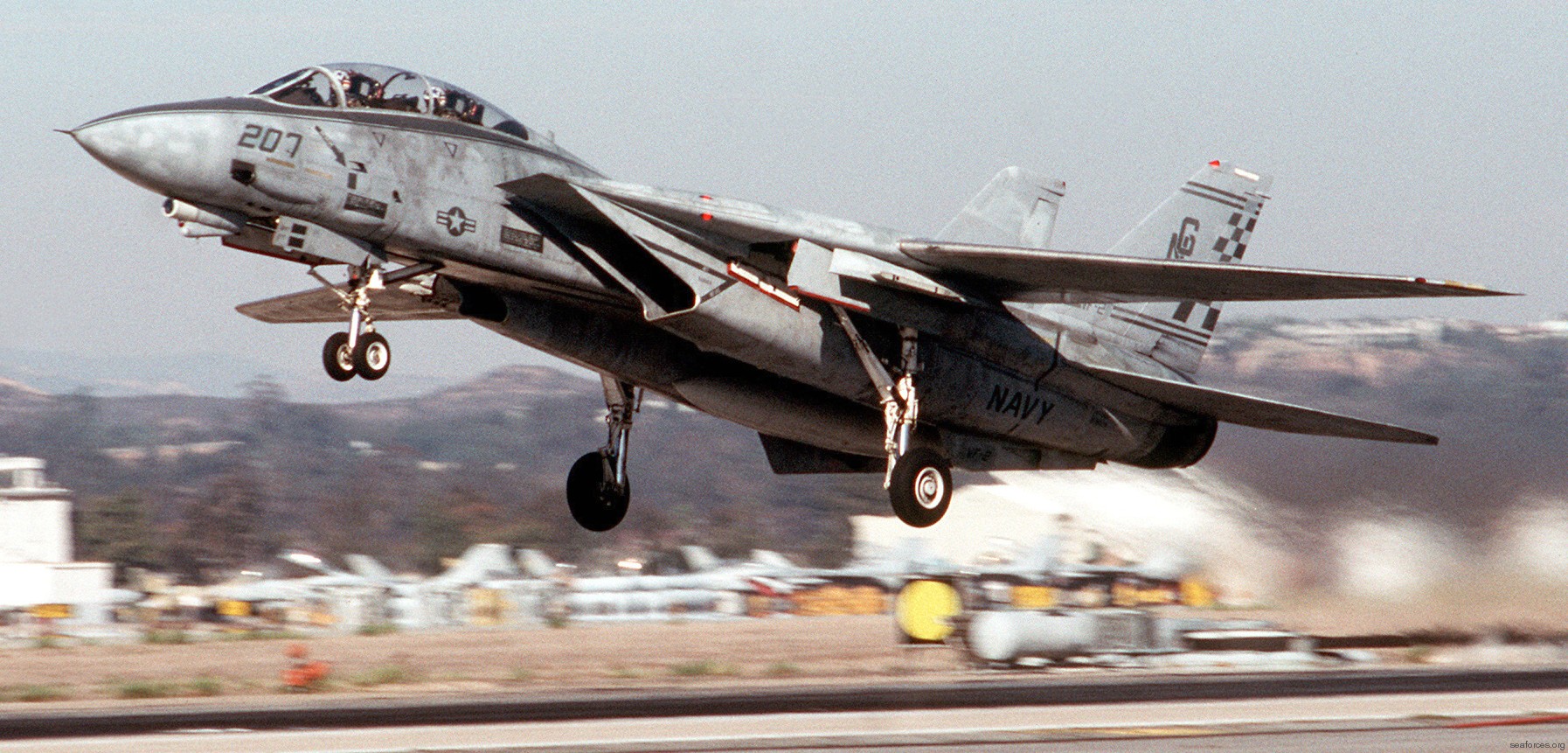 F-14A Tomcat (VF-211 / CVW-9) at NAS Miramar, California - October 1989 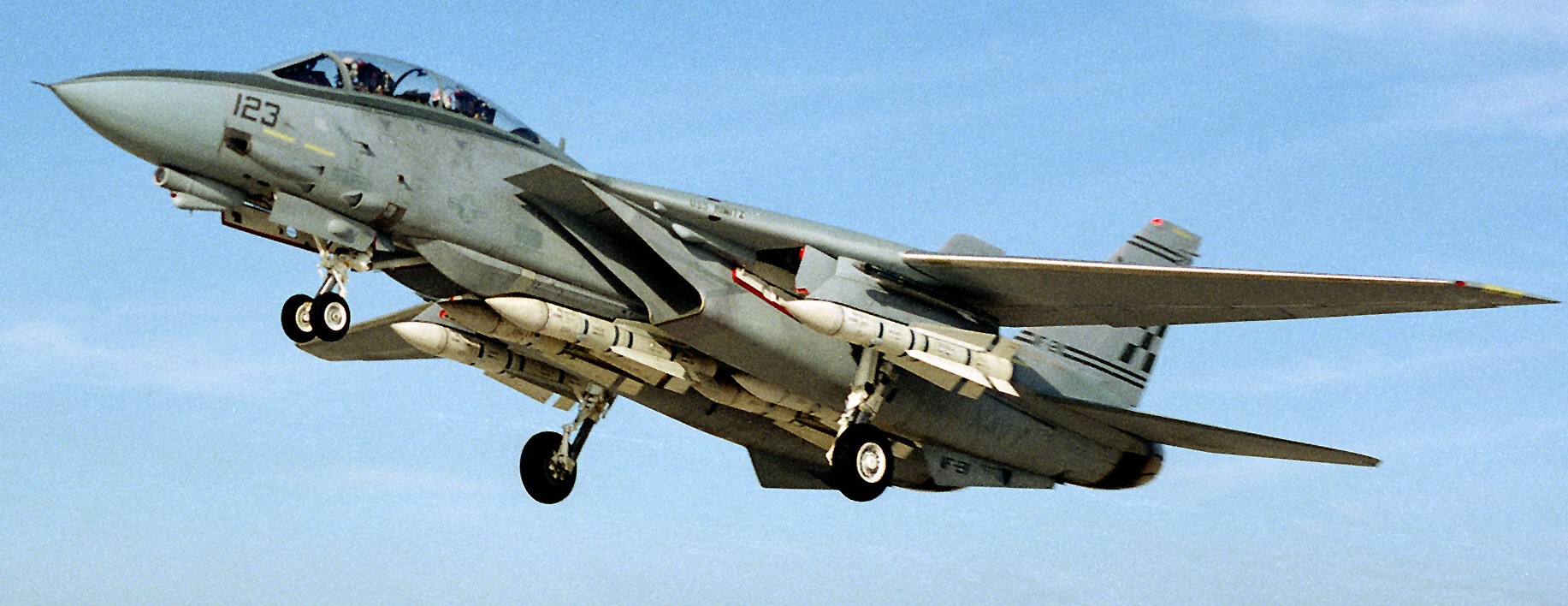 F-14A Tomcat (VF-211 / CVW-9) at NAS Miramar, California - October 1989 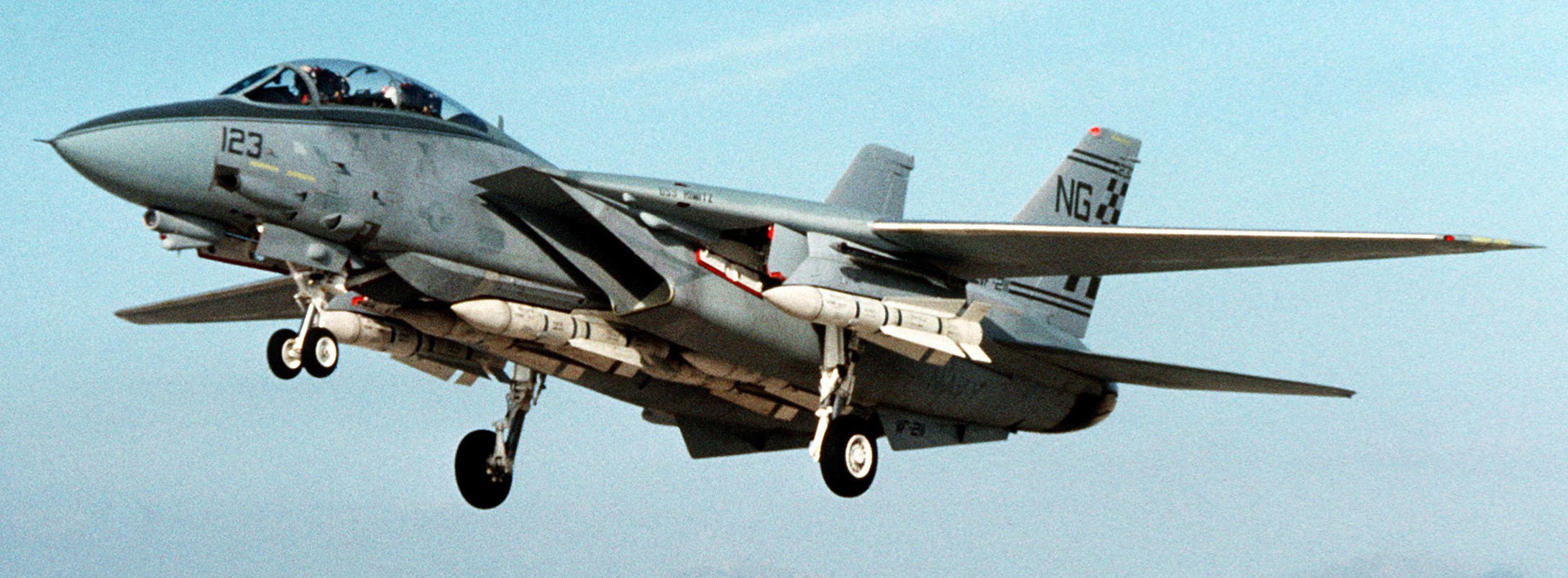 F-14A Tomcat (VF-211 / CVW-9) at NAS Miramar, California - October 1989 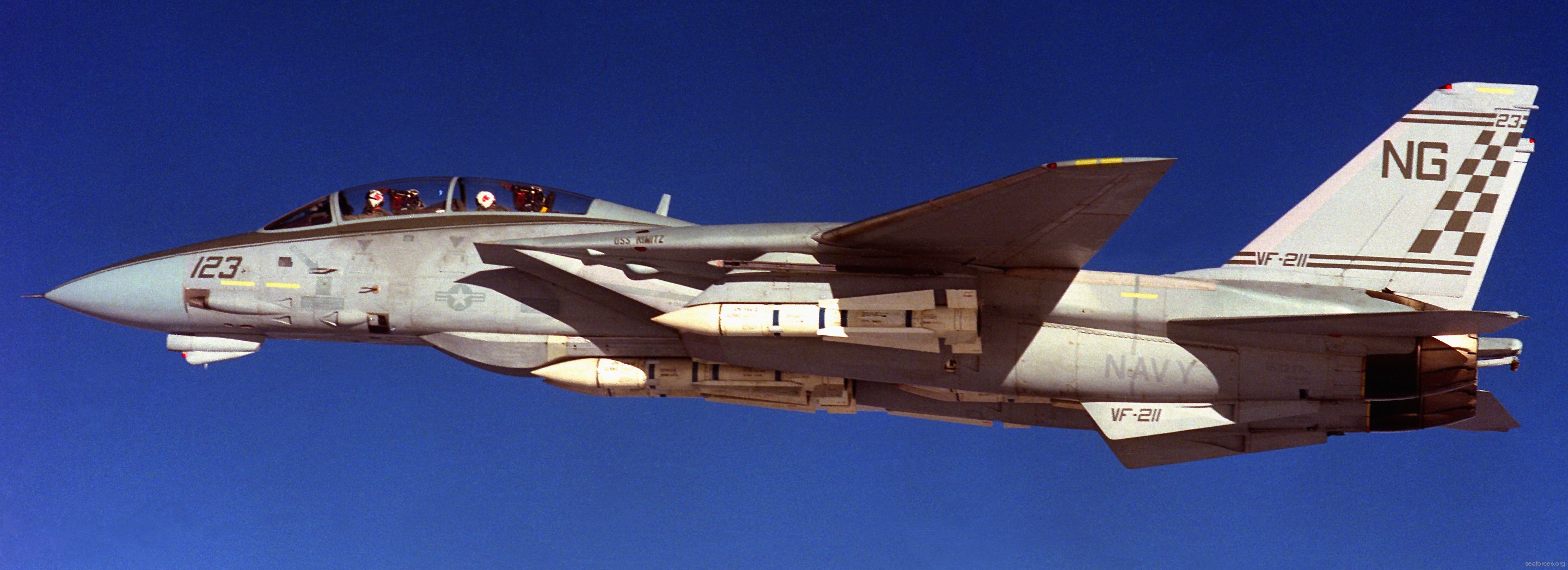 F-14B Tomcat (VF-211 / CVW-9) with AIM-54 Phoenix missiles loaded - 1989 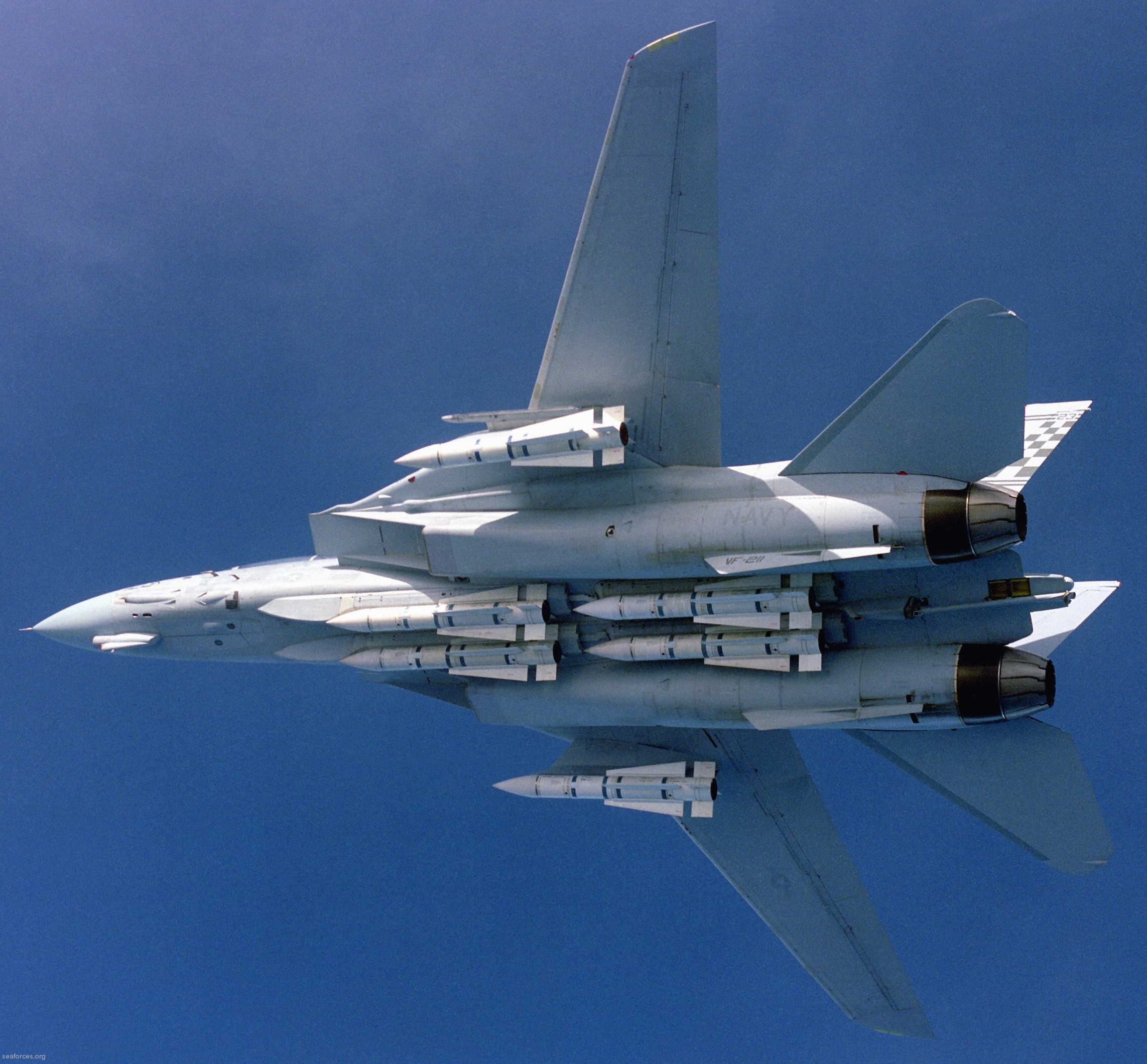 F-14B Tomcat (VF-211 / CVW-9) with six AIM-54 Phoenix missiles loaded - 1989 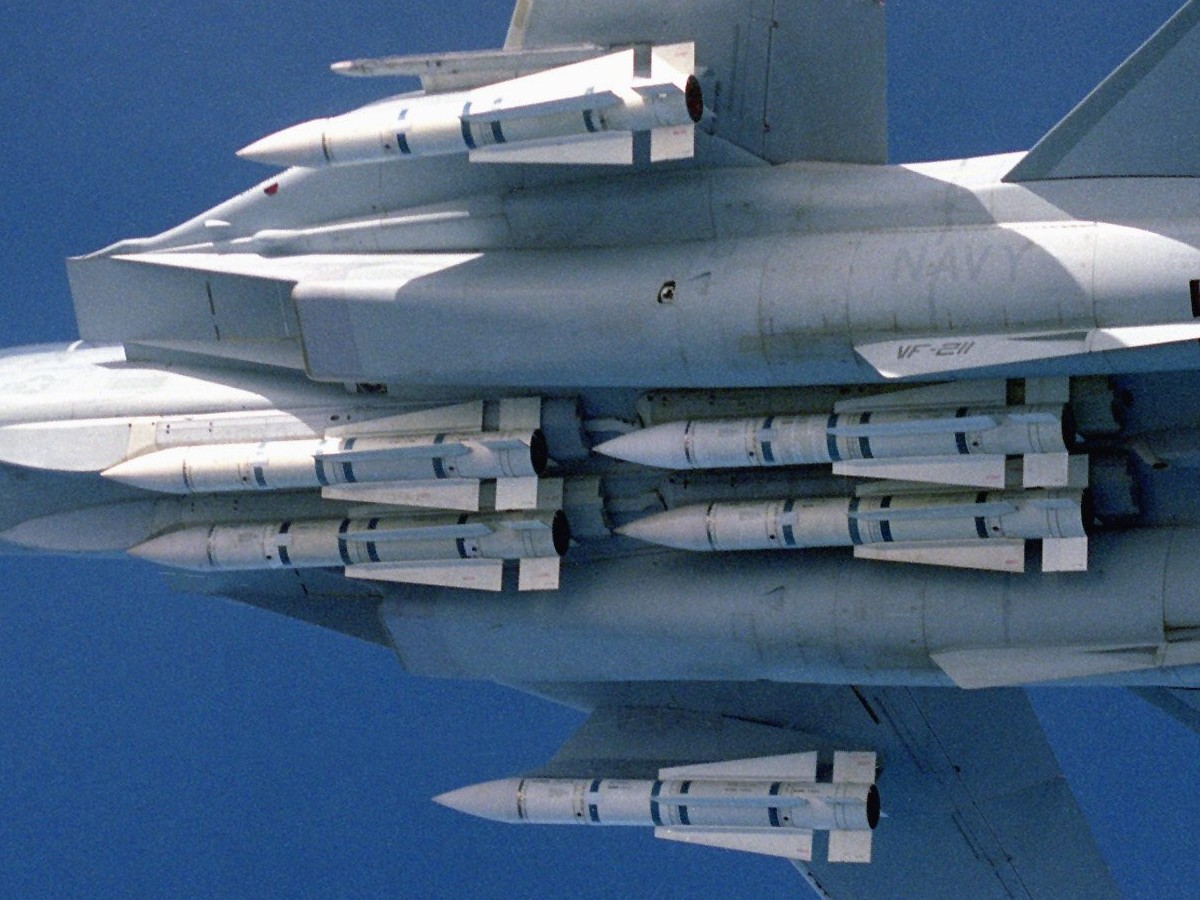 as above 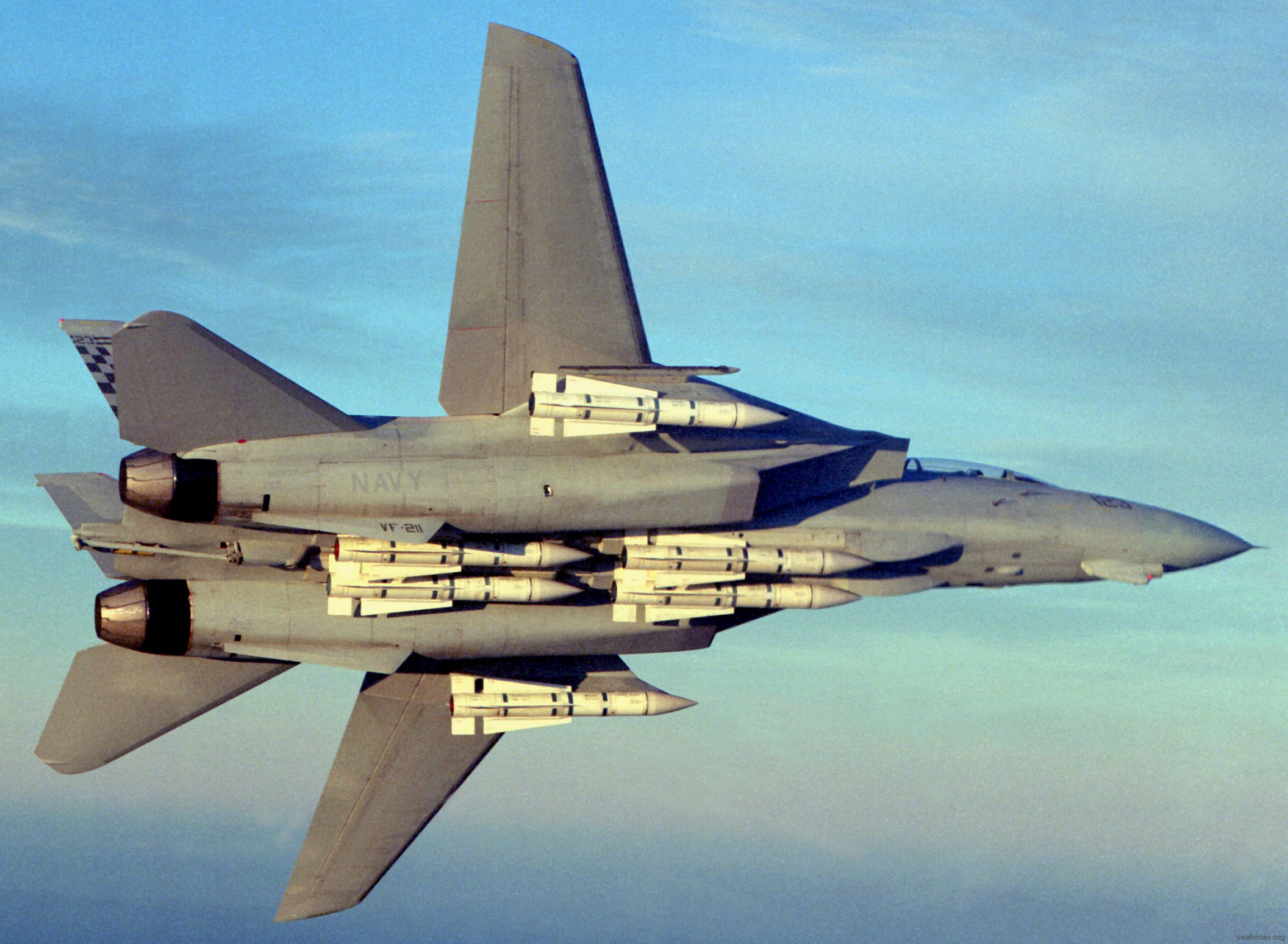 F-14B Tomcat (VF-211 / CVW-9) with six AIM-54 Phoenix missiles loaded - 1989 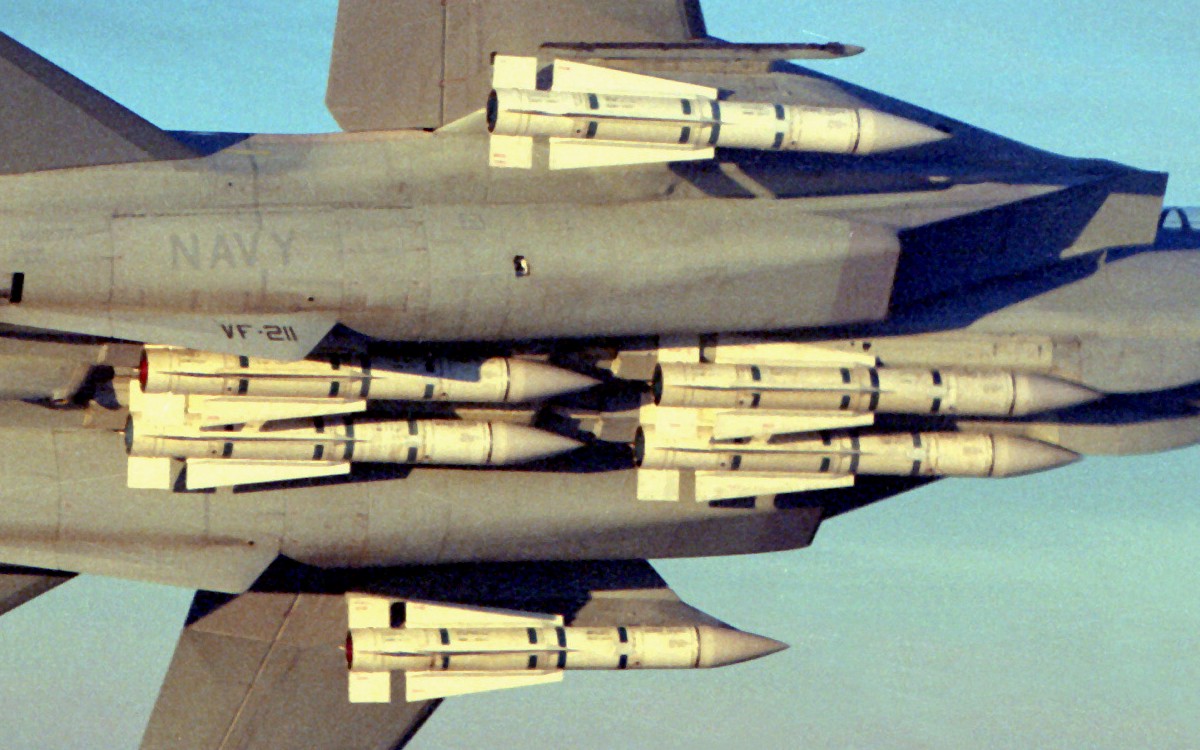 as above 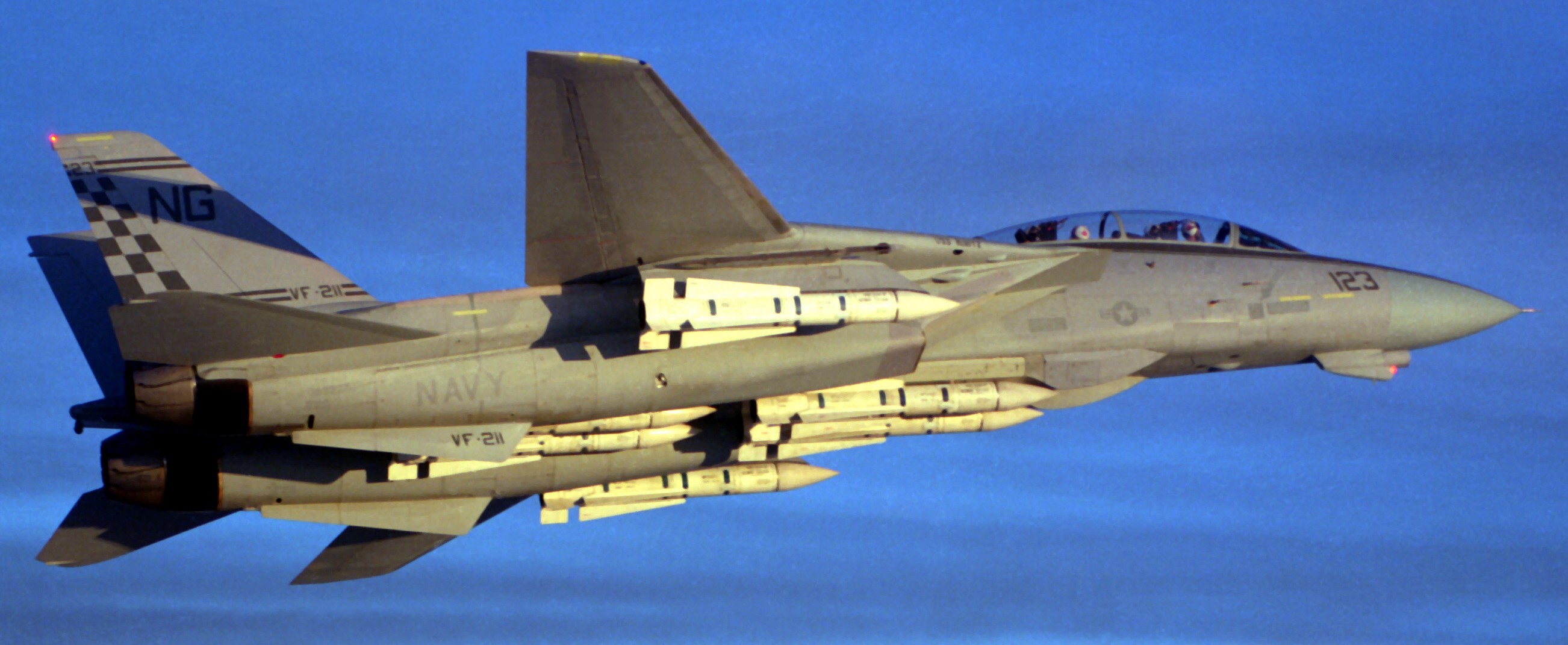 F-14B Tomcat (VF-211 / CVW-9) with AIM-54 Phoenix missiles loaded - 1989 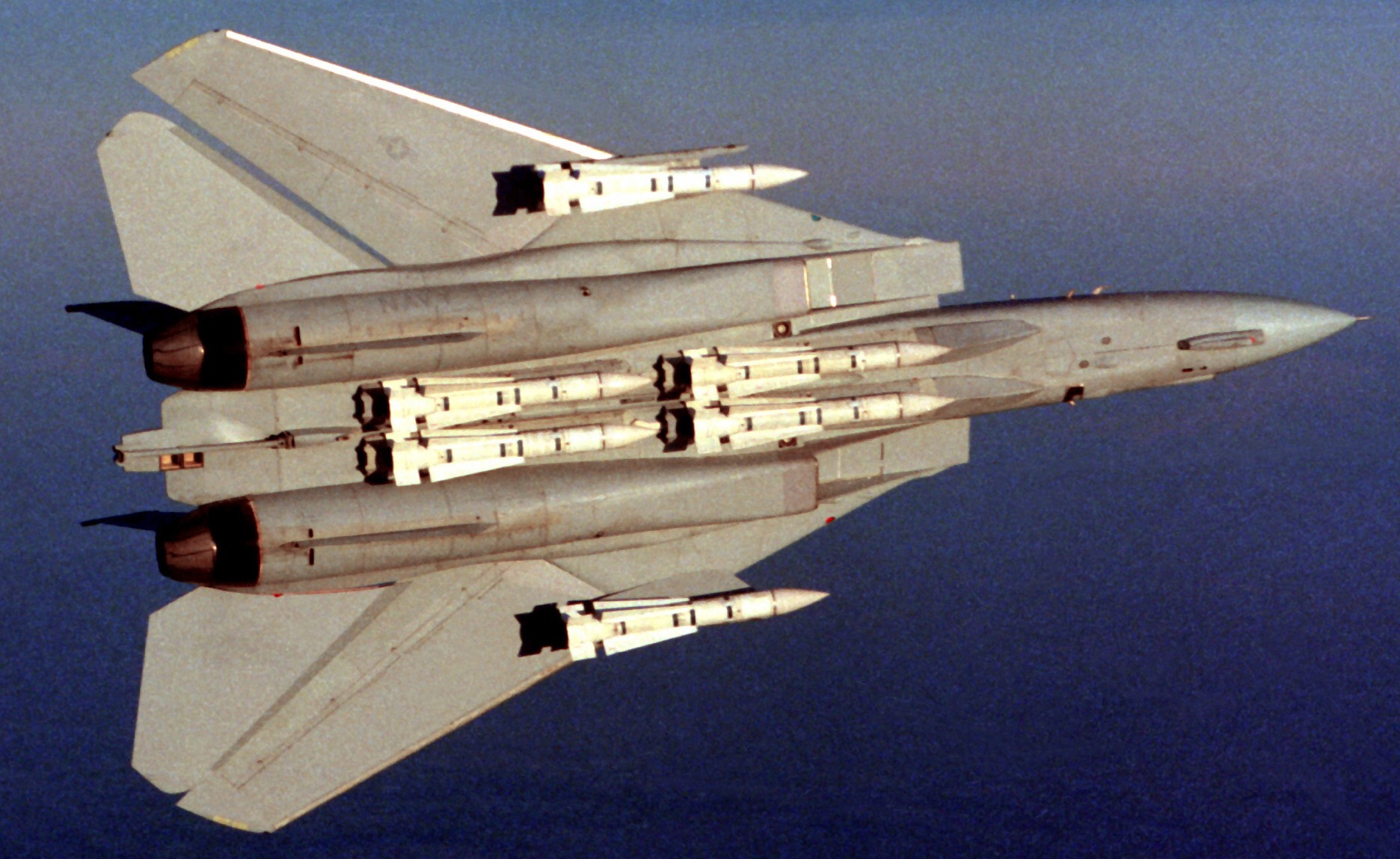 F-14B Tomcat (VF-211 / CVW-9) with AIM-54 Phoenix missiles loaded - 1989 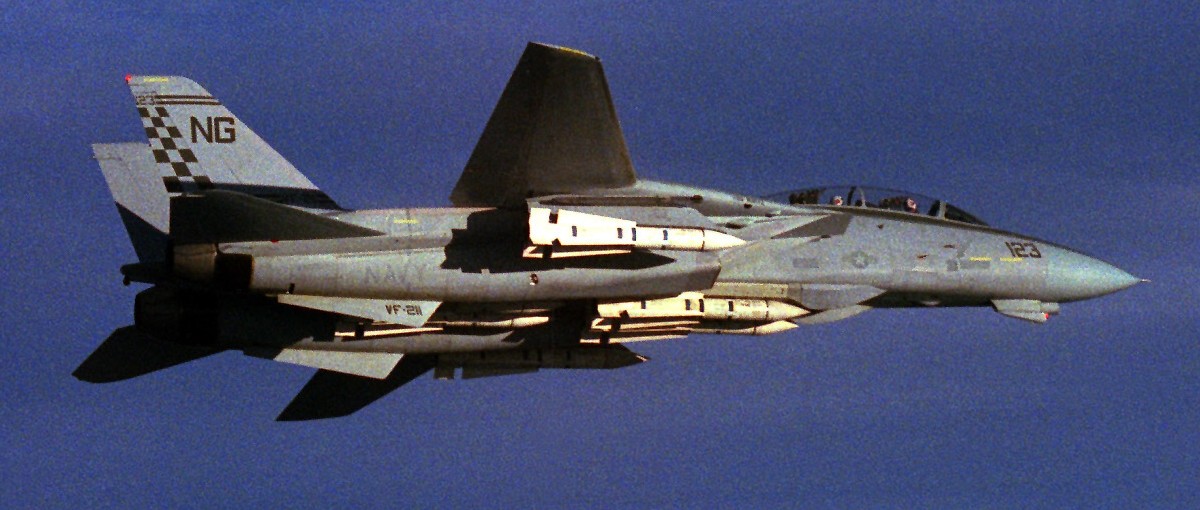 F-14B Tomcat (VF-211 / CVW-9) with AIM-54 Phoenix missiles loaded - 1989 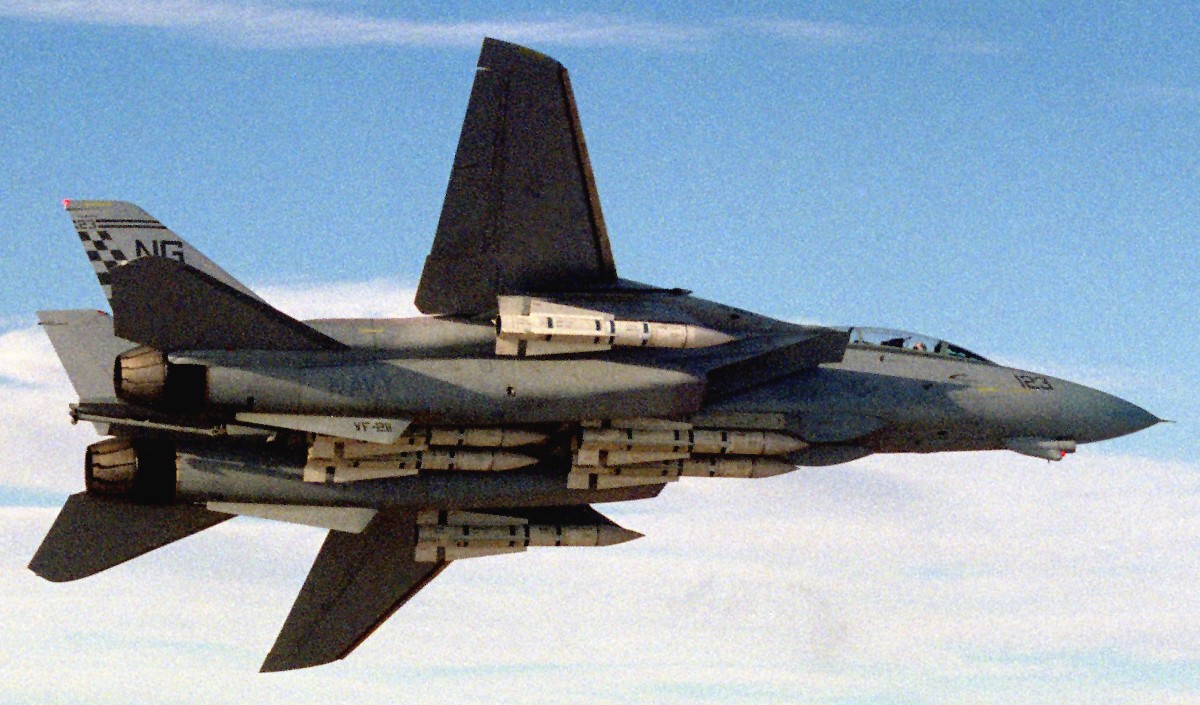 F-14B Tomcat (VF-211 / CVW-9) with AIM-54 Phoenix missiles loaded - 1989 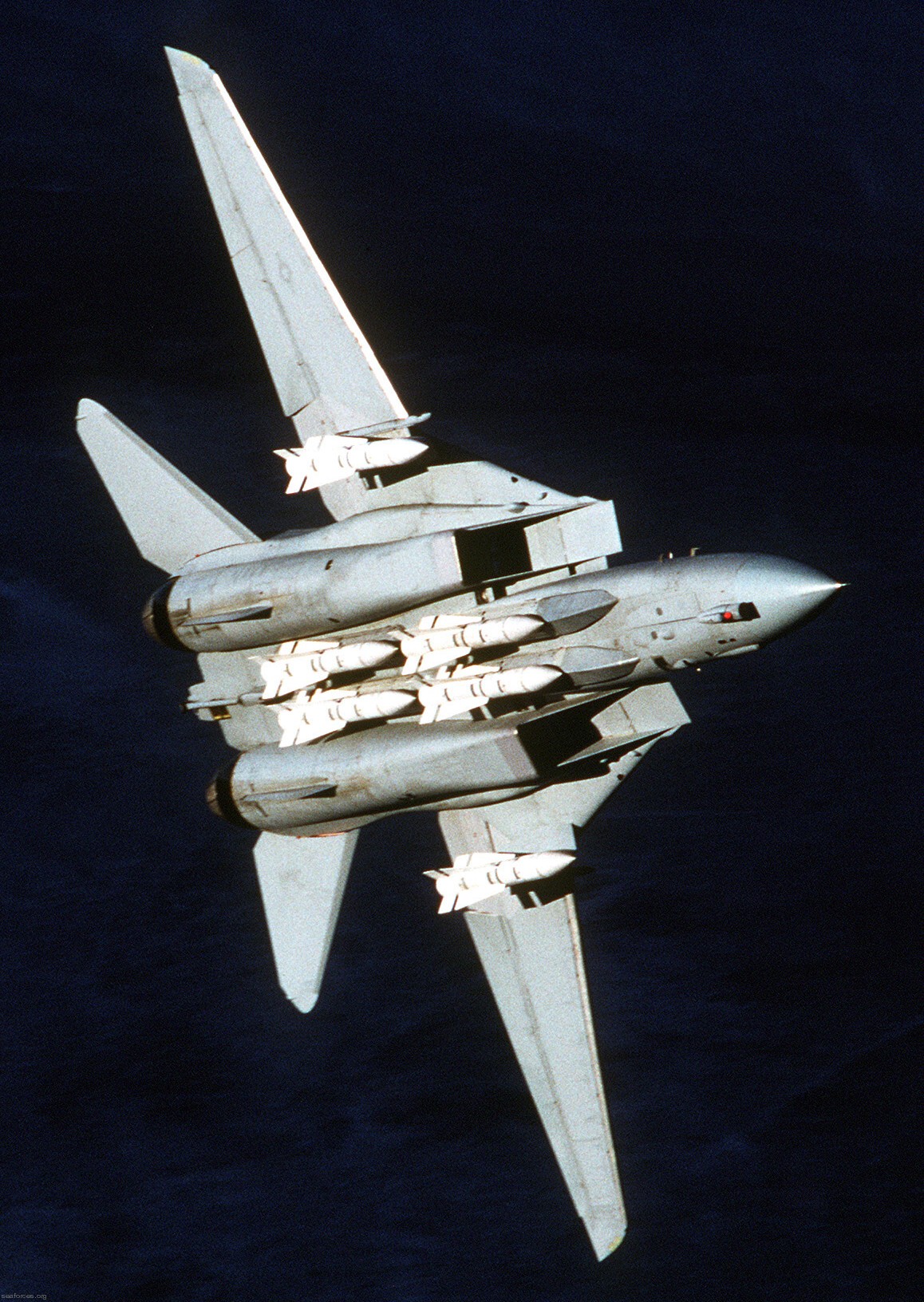 F-14B Tomcat (VF-211 / CVW-9) with AIM-54 Phoenix missiles loaded - 1989 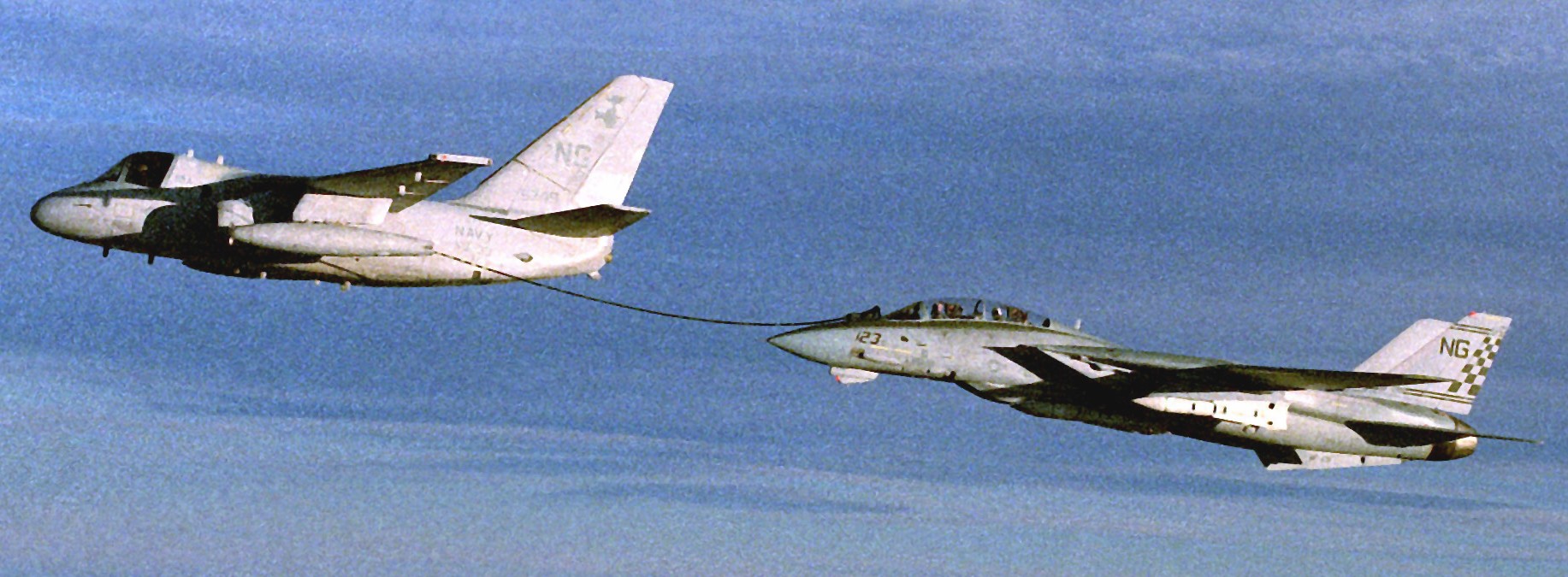 F-14B Tomcat (VF-211 / CVW-9) takes fuel from a S-3A Viking (VS-33) - 1989 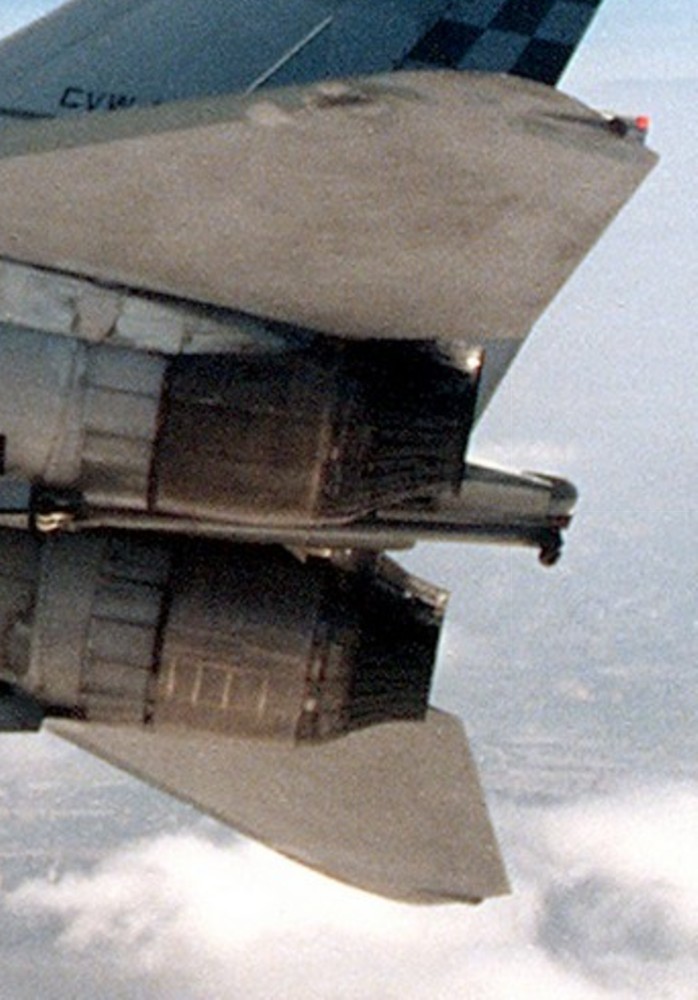
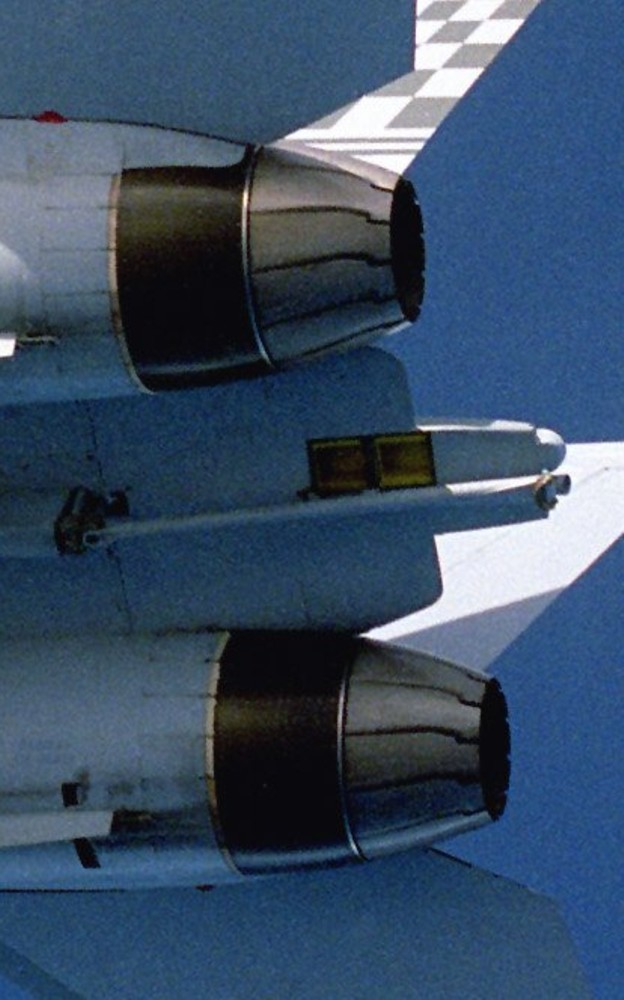 note the difference: F-14A = Pratt & Whitney TF30-P-414A engines / F-14B = General Electric GE F110-GE-400 engines 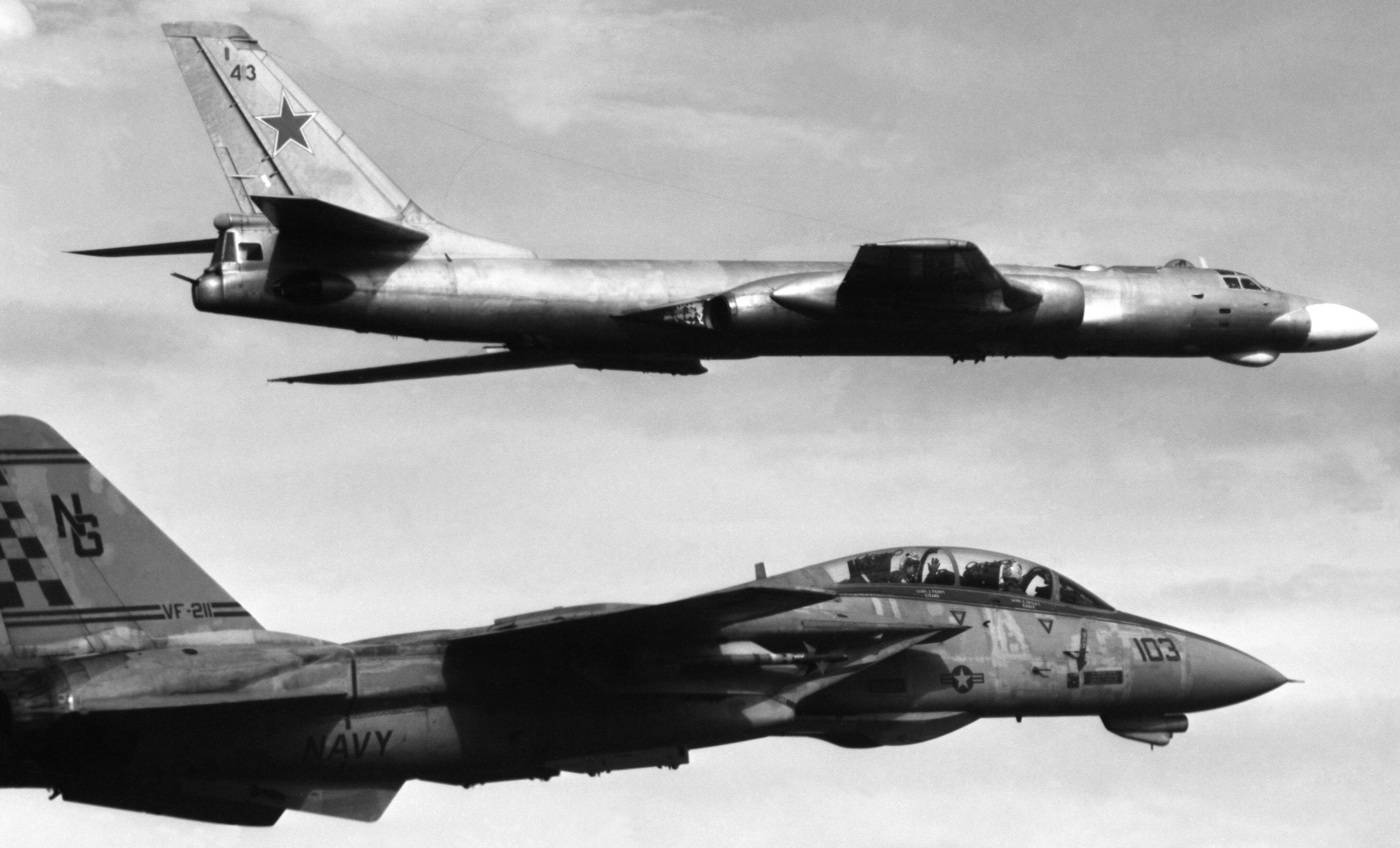 F-14 Tomcat (VF-211 / CVW-9) embarked on USS Nimitz (CVN 68) intercepting a Soviet Tu-16 Badger-C aircraft - undated (late 1980's?) 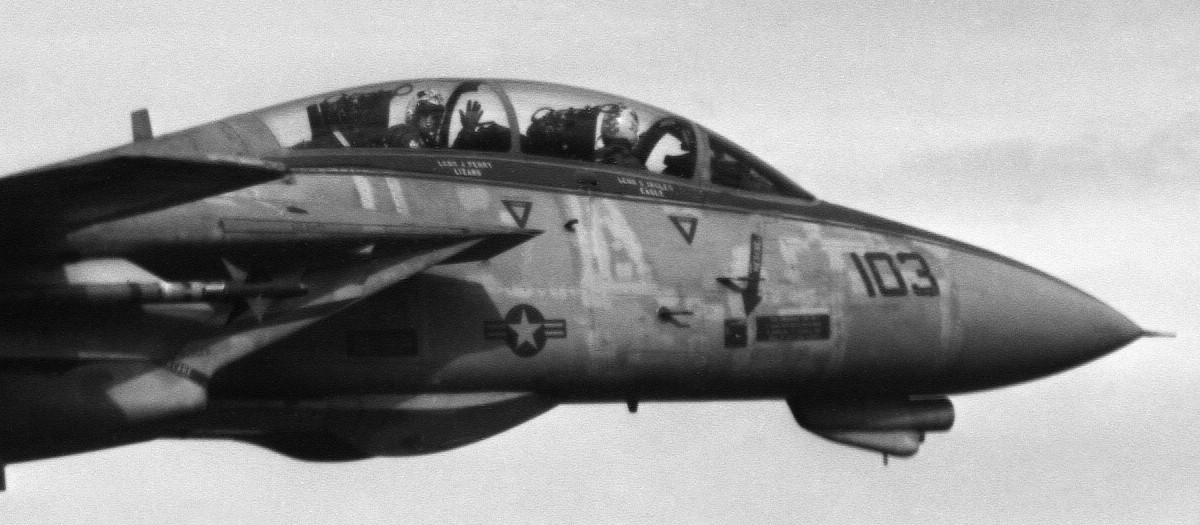 excerpt 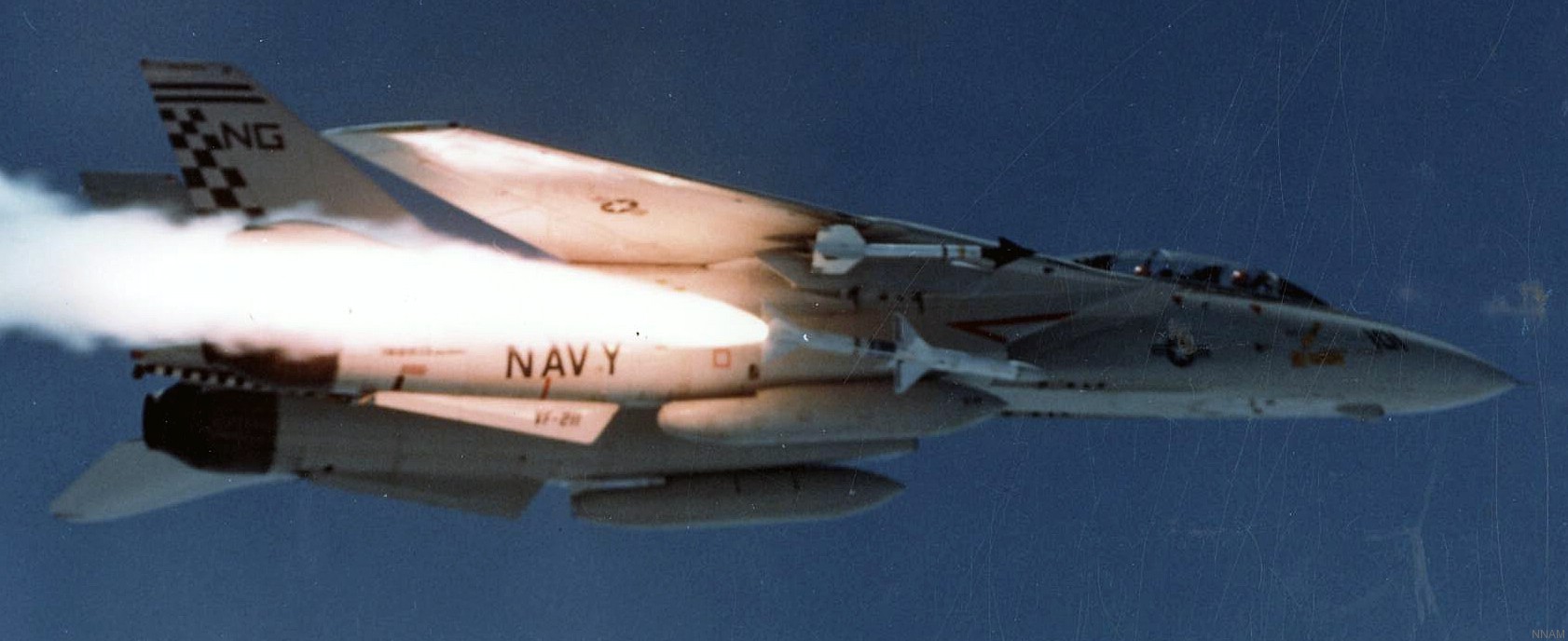 F-14A Tomcat (VF-211 / CVW-9) firing an AIM-7 Sparrow missile - 1988-89 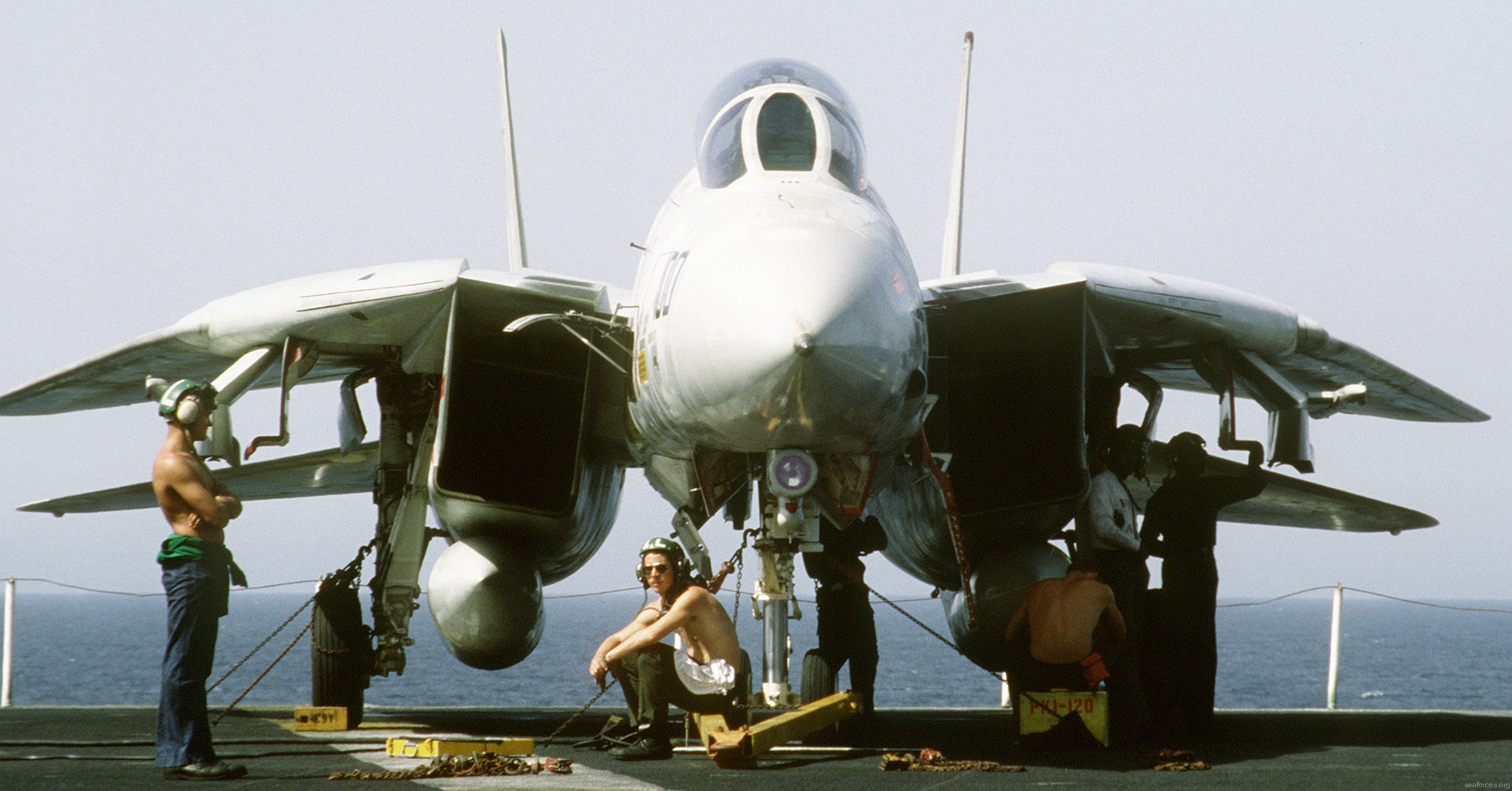 F-14A Tomcat (VF-211 / CVW-9) embarked on USS Kitty Hawk (CV 63) - July 1987 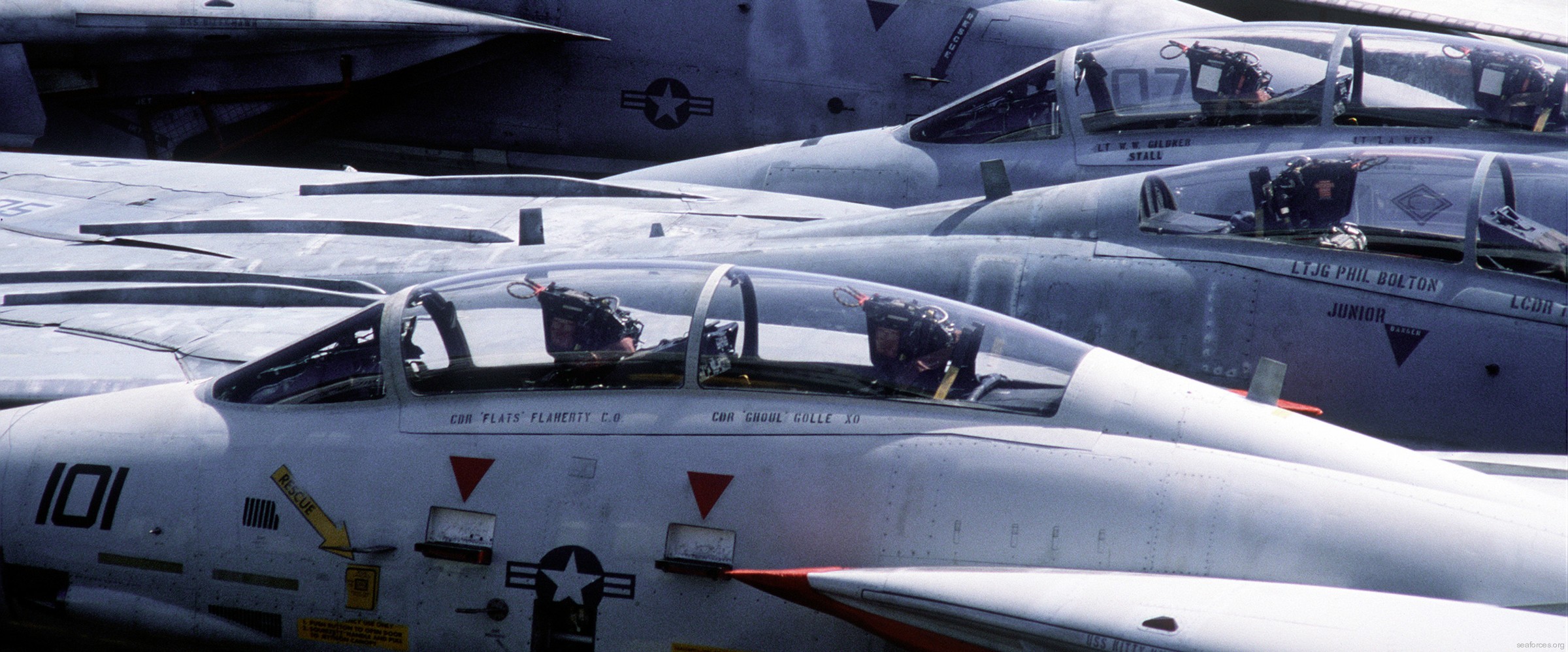 F-14A Tomcat (VF-211 / CVW-9) embarked on USS Kitty Hawk (CV 63) - July 1987 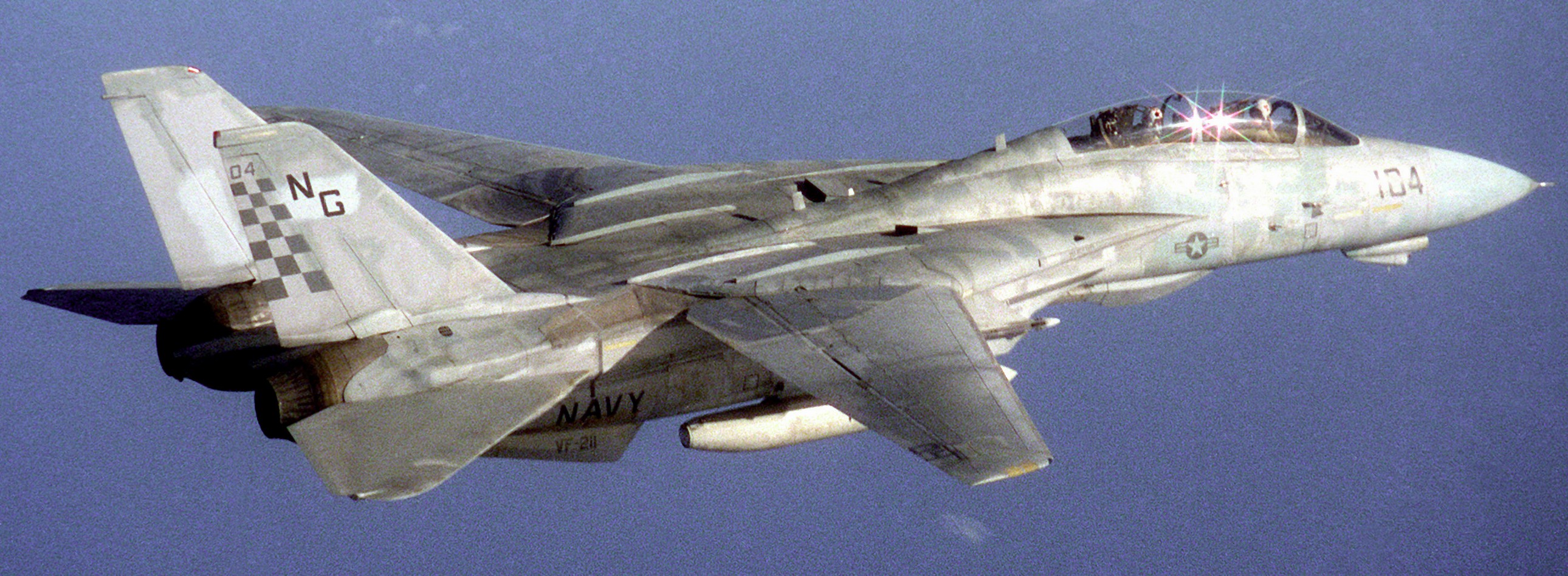 F-14A Tomcat (VF-211 / CVW-9) embarked on USS Kitty Hawk (CV 63) - May 1987  F-14A Tomcat (VF-211 / CVW-9) embarked on USS Kitty Hawk (CV 63) - 1987 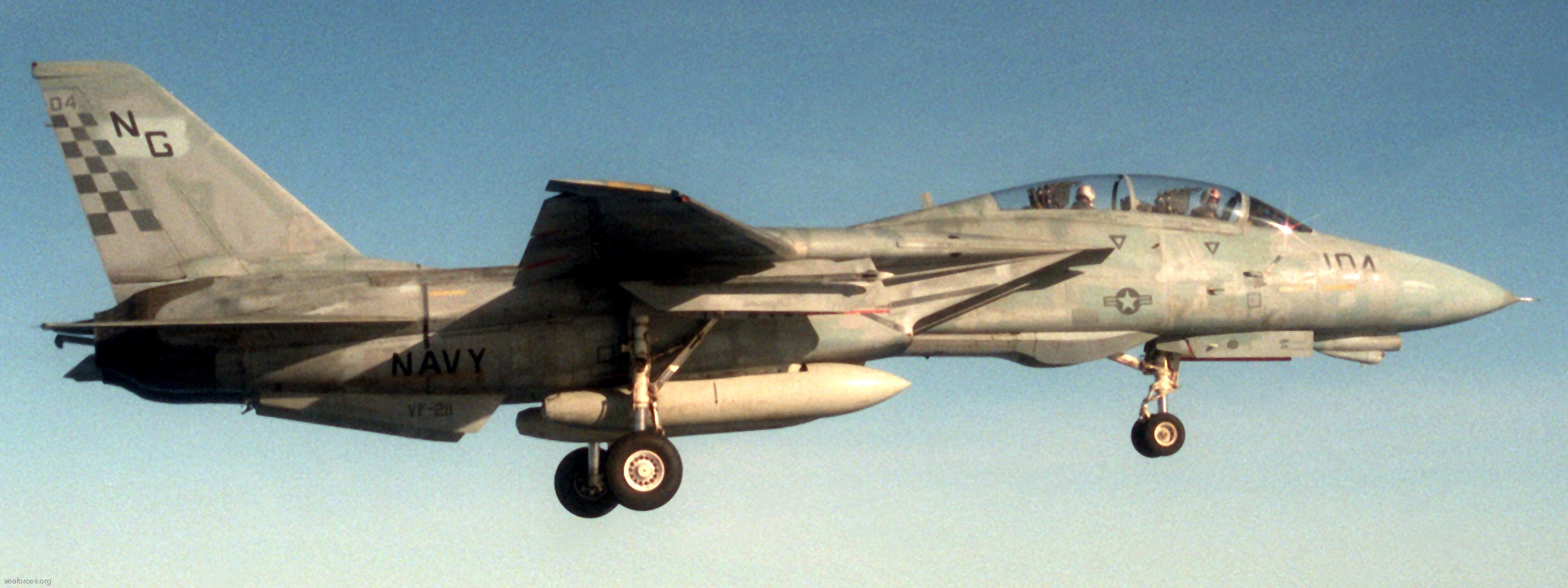 F-14A Tomcat (VF-211 / CVW-9) embarked on USS Kitty Hawk (CV 63) - 1987 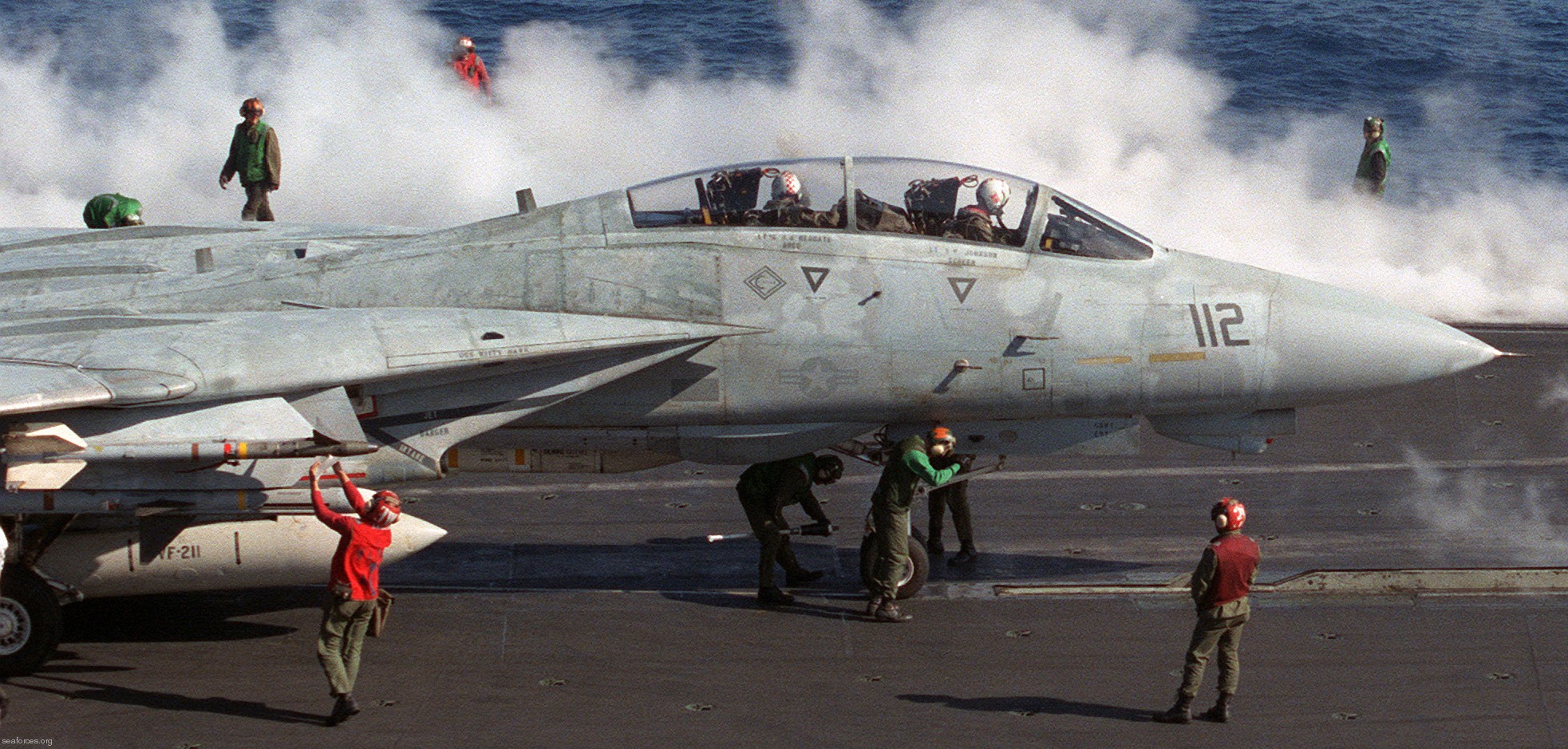 F-14A Tomcat (VF-211 / CVW-9) embarked on USS Kitty Hawk (CV 63) - February 1987 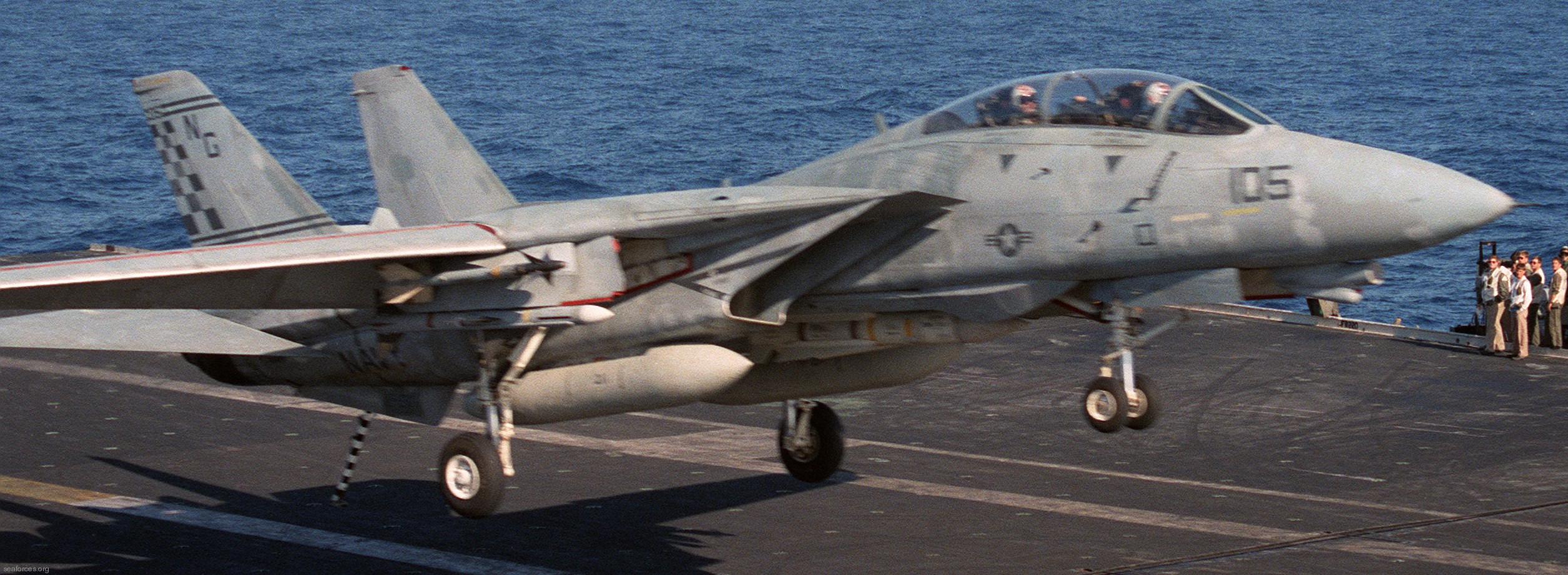 F-14A Tomcat (VF-211 / CVW-9) embarked on USS Kitty Hawk (CV 63) - February 1987 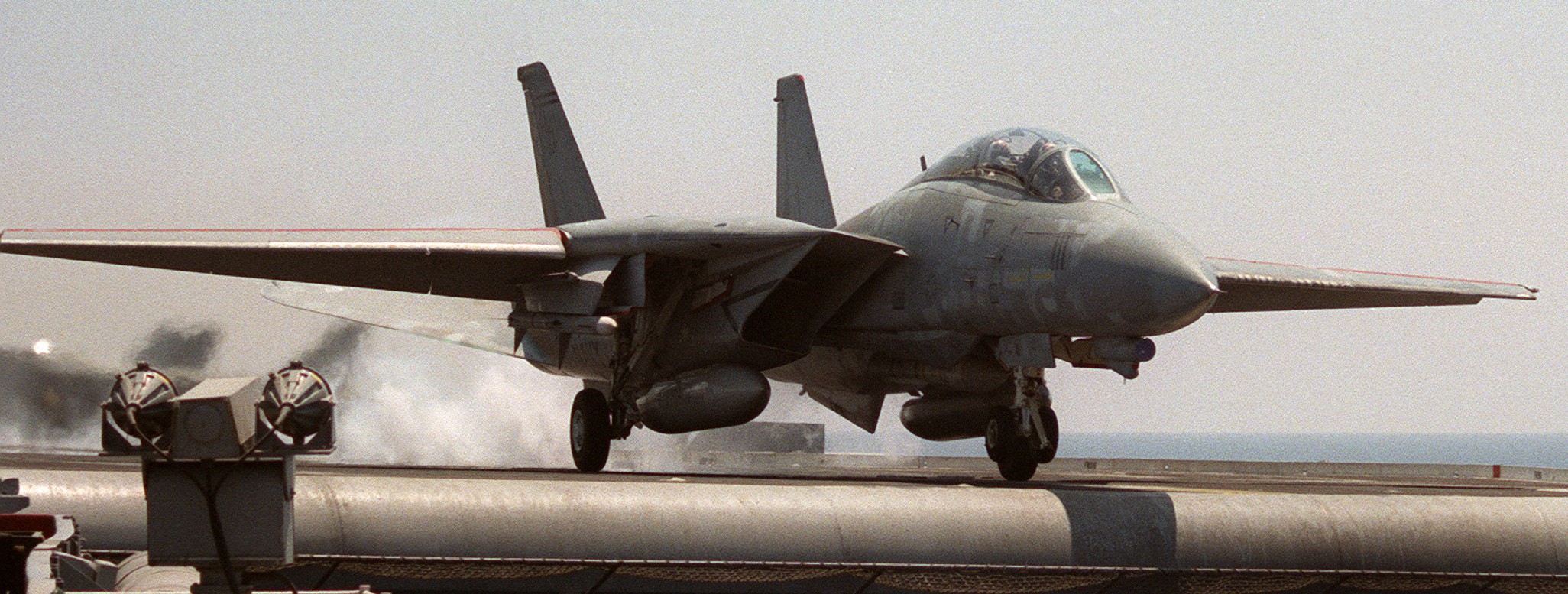 F-14A Tomcat (VF-211 / CVW-9) embarked on USS Kitty Hawk (CV 63) - February 1987 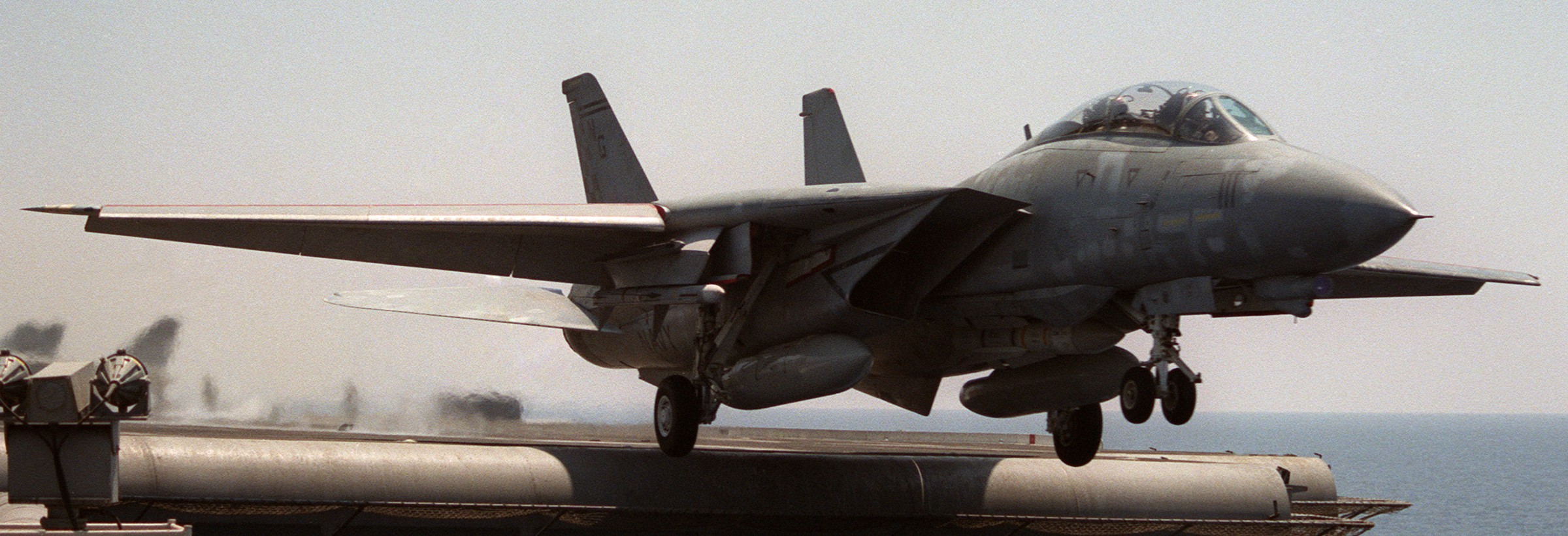 F-14A Tomcat (VF-211 / CVW-9) embarked on USS Kitty Hawk (CV 63) - February 1987 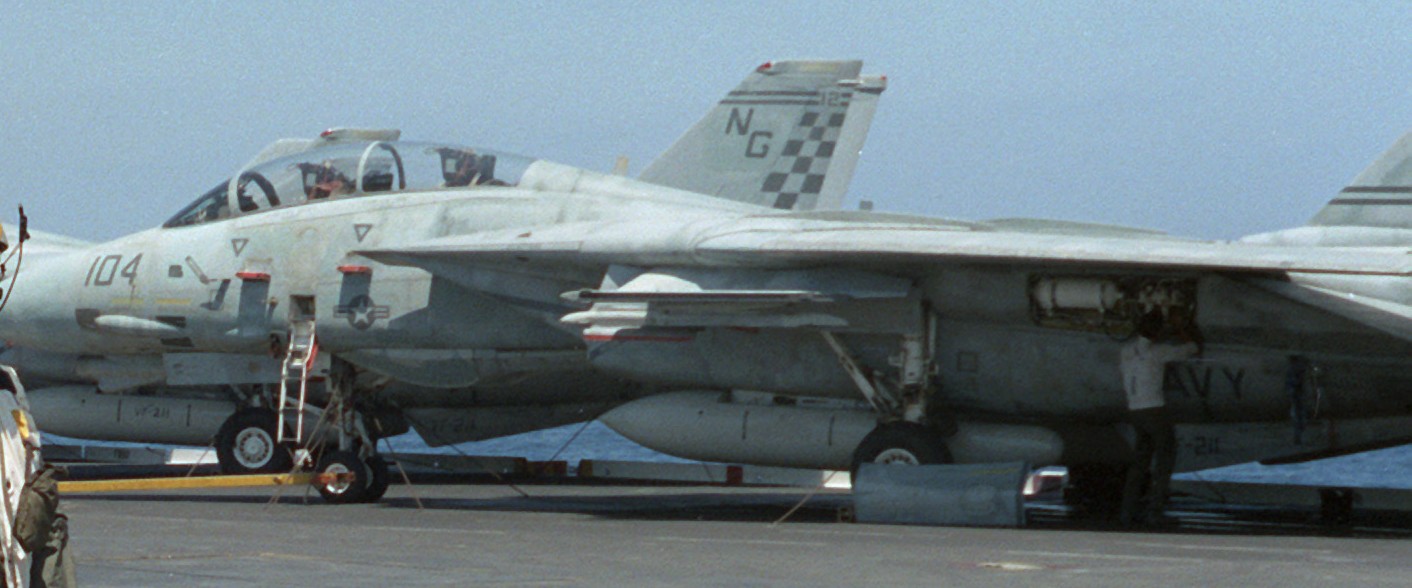 F-14A Tomcat (VF-211 / CVW-9) embarked on USS Kitty Hawk (CV 63) - February 1987 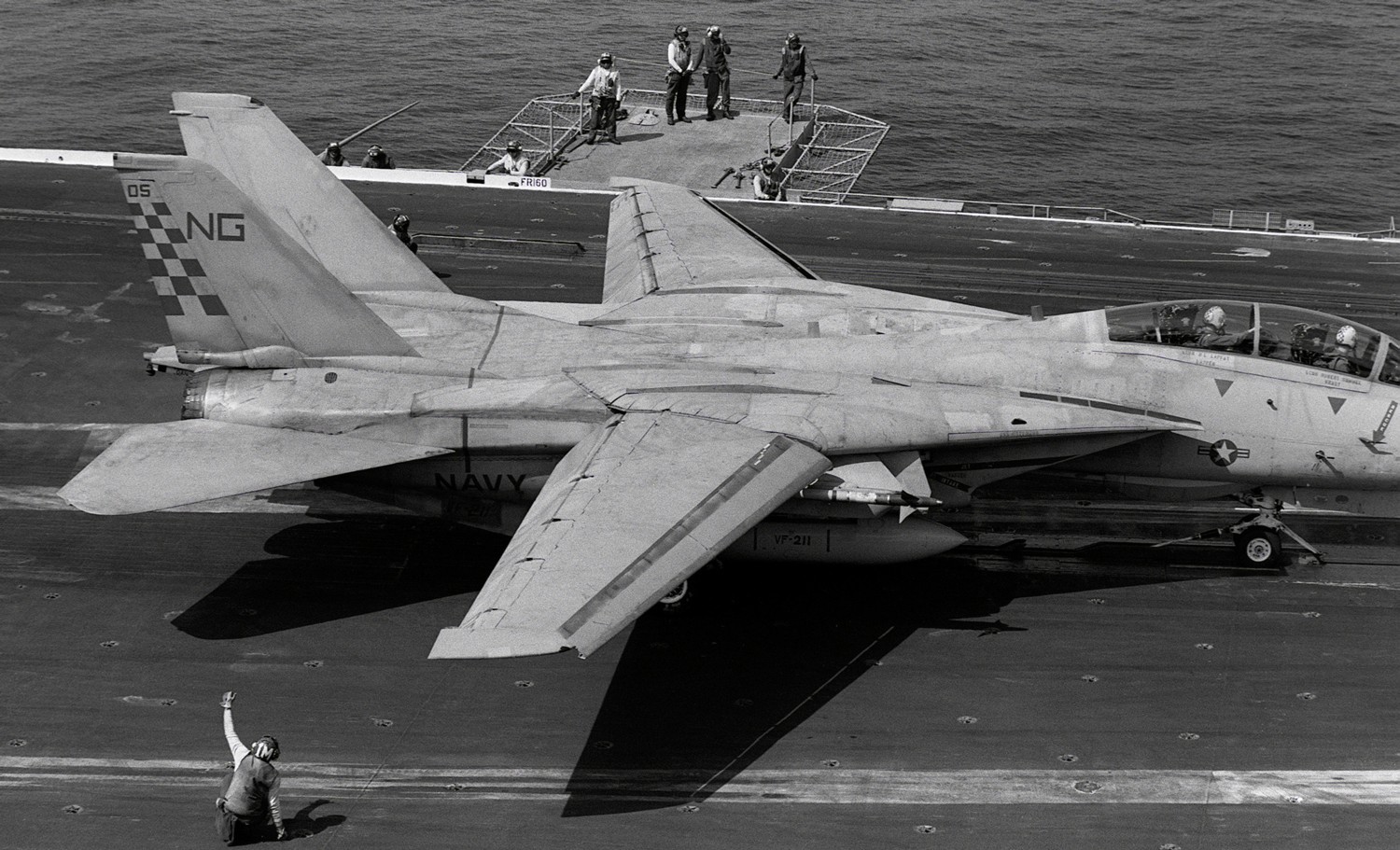 F-14A Tomcat (VF-211 / CVW-9) embarked on USS Kitty Hawk (CV 63) - 1987 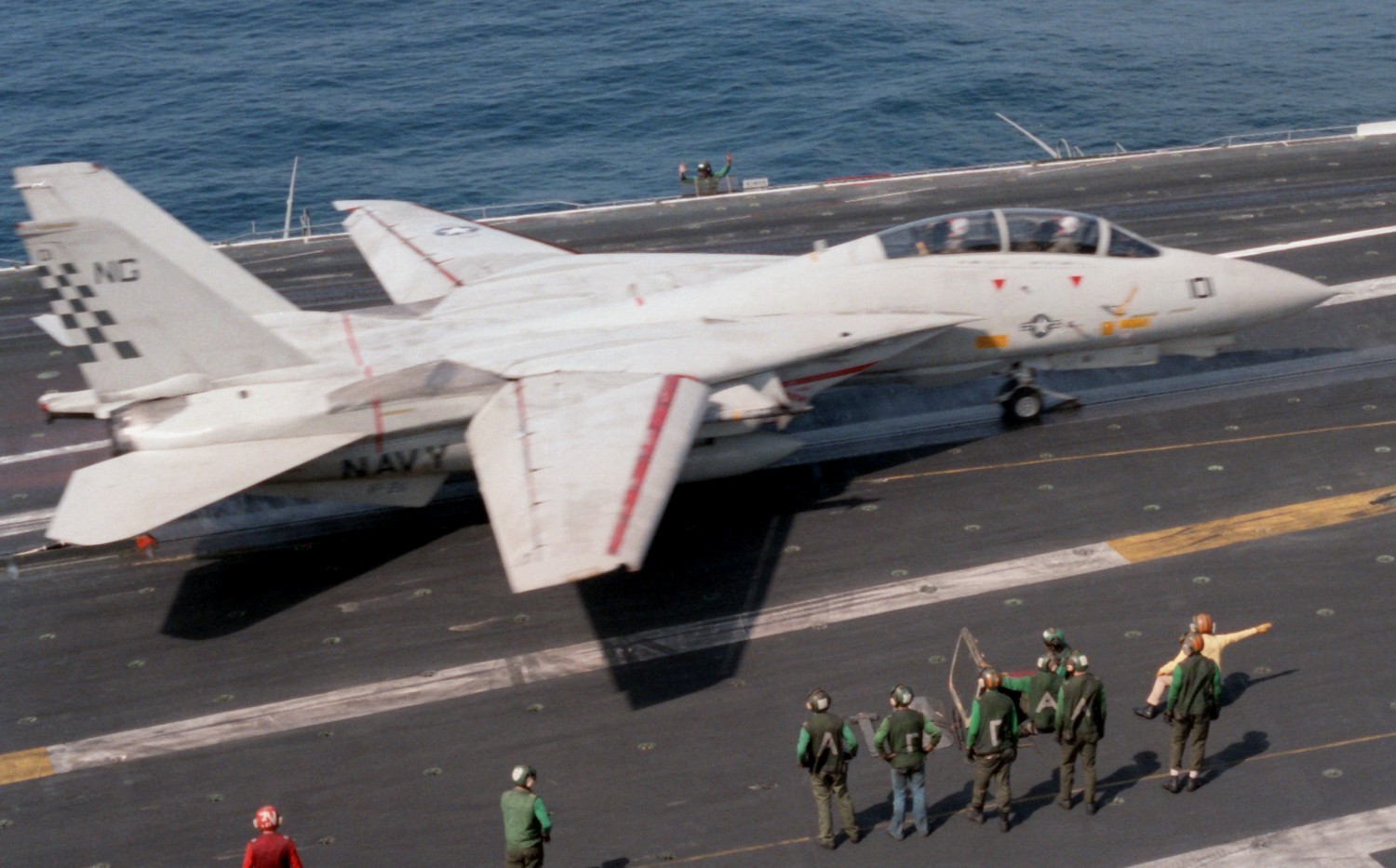 F-14A Tomcat (VF-211 / CVW-9) embarked on USS Kitty Hawk (CV 63) - 1987 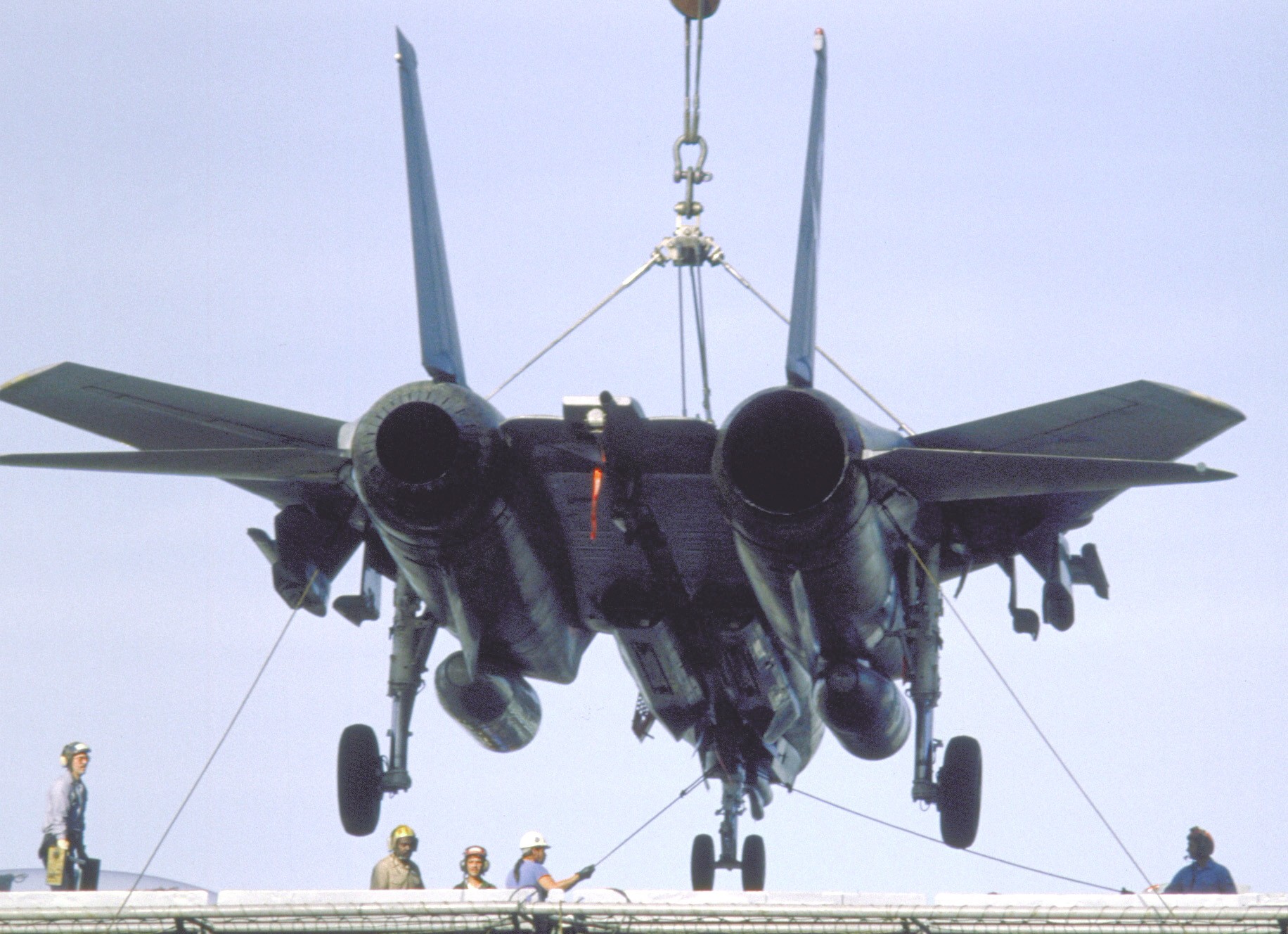 F-14A Tomcat (VF-211 / CVW-9) prior to be loaded on USS Kitty Hawk (CV 63) - January 1987 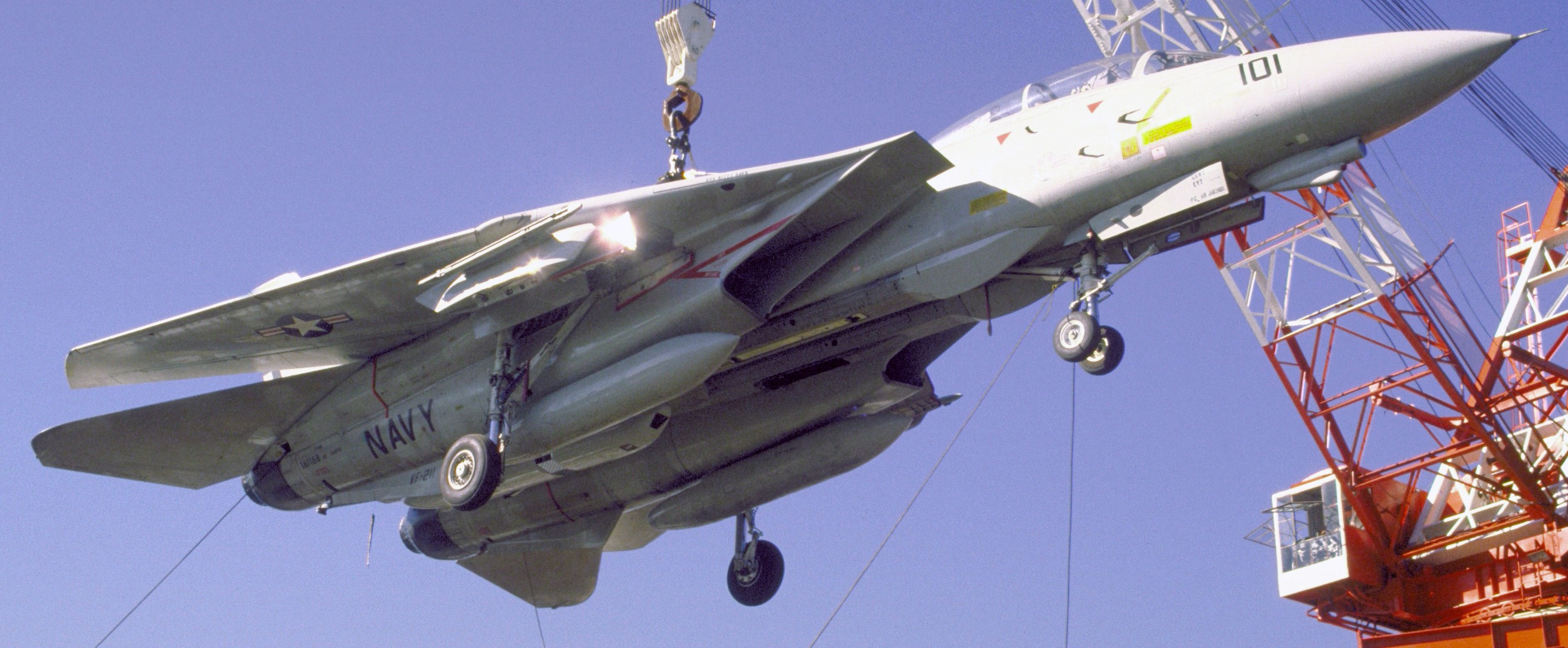 F-14A Tomcat (VF-211 / CVW-9) prior to be loaded on USS Kitty Hawk (CV 63) - January 1987 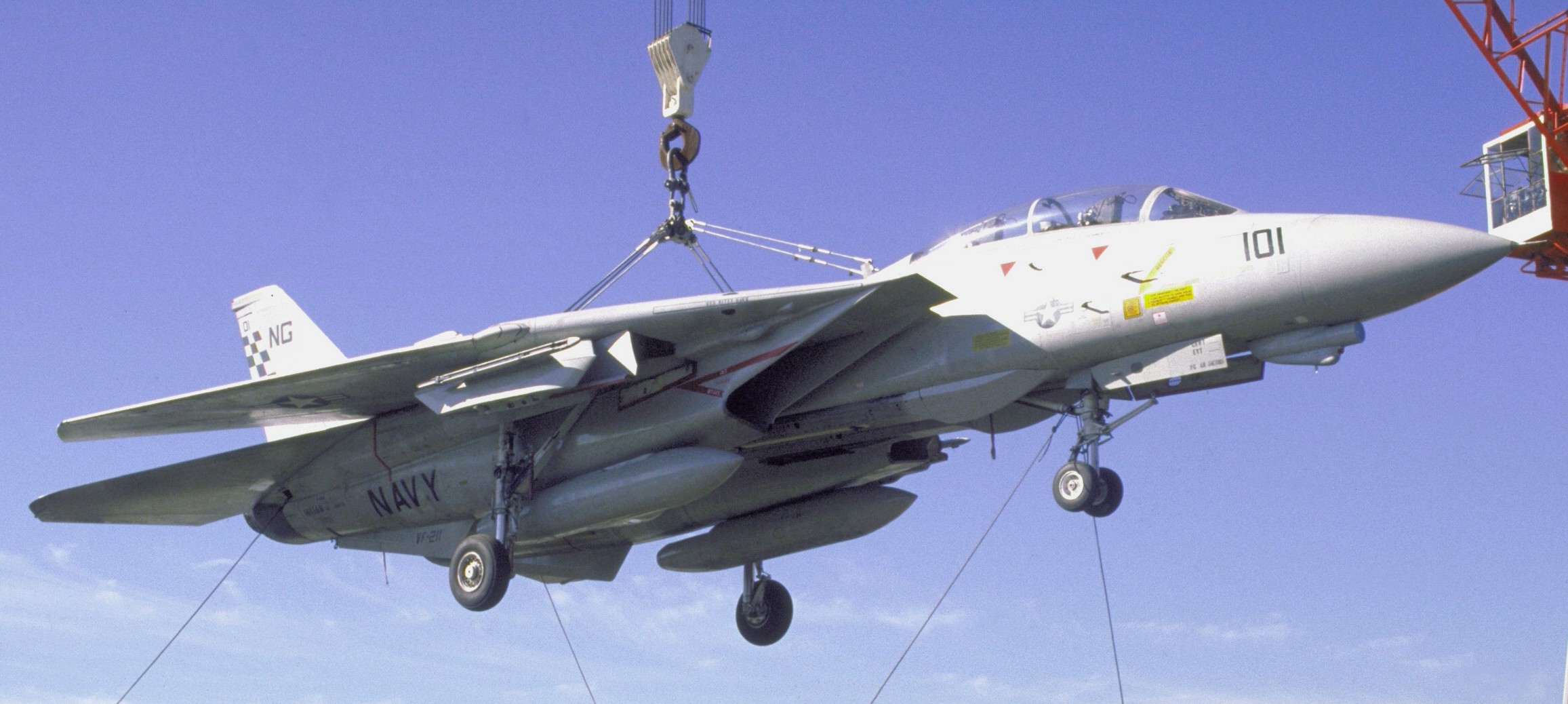 F-14A Tomcat (VF-211 / CVW-9) prior to be loaded on USS Kitty Hawk (CV 63) - January 1987 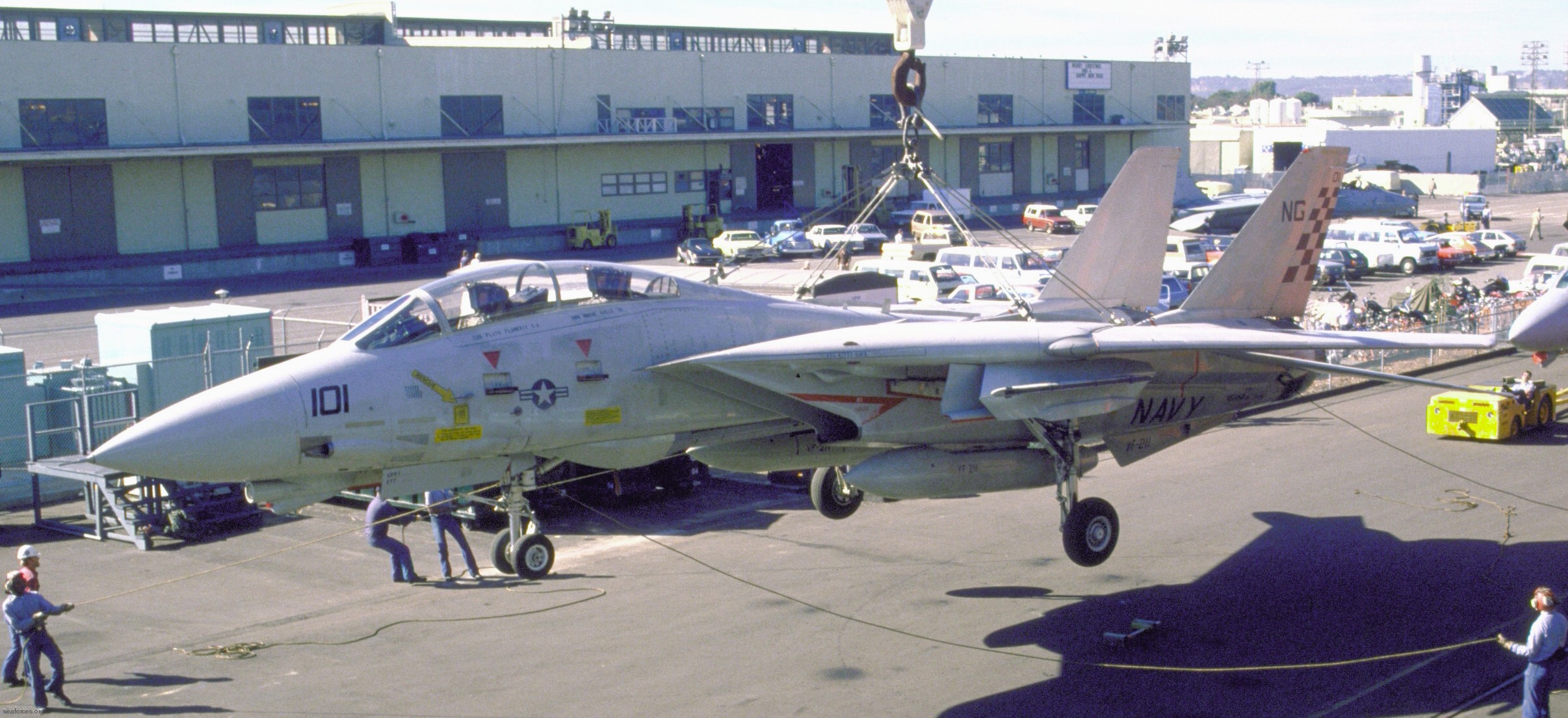 F-14A Tomcat (VF-211 / CVW-9) prior to be loaded on USS Kitty Hawk (CV 63) - January 1987 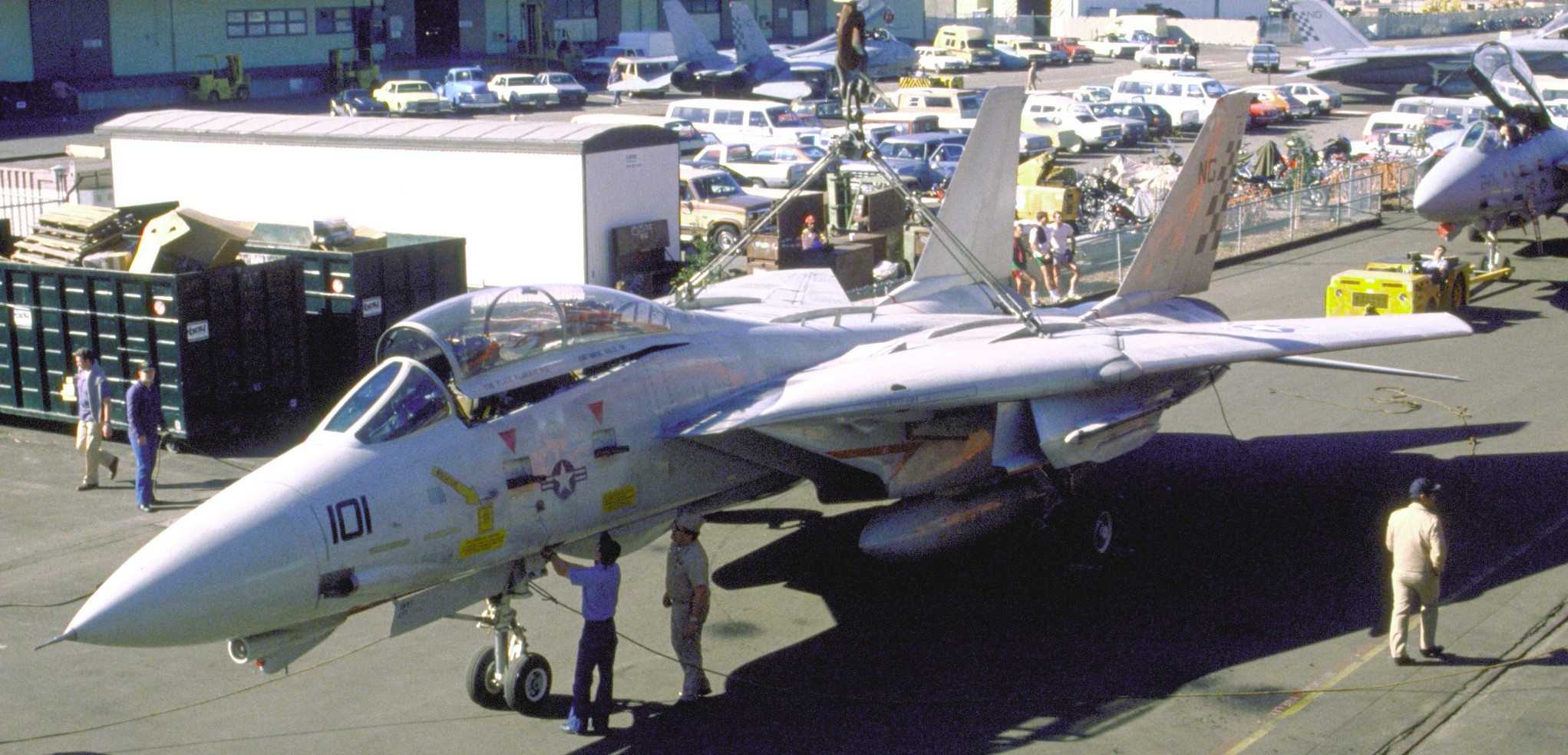 F-14A Tomcat (VF-211 / CVW-9) prior to be loaded on USS Kitty Hawk (CV 63) - January 1987 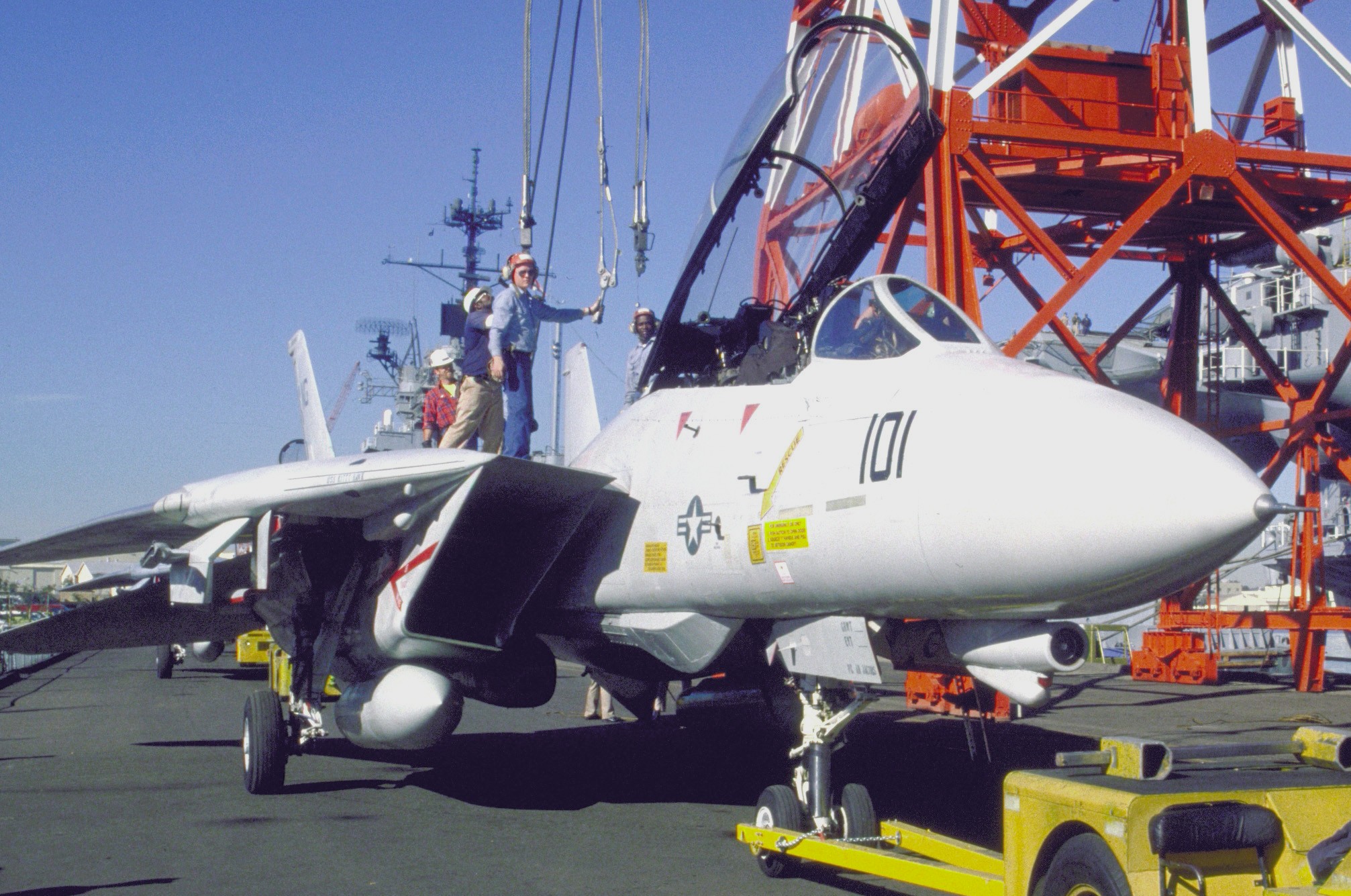 F-14A Tomcat (VF-211 / CVW-9) prior to be loaded on USS Kitty Hawk (CV 63) - January 1987 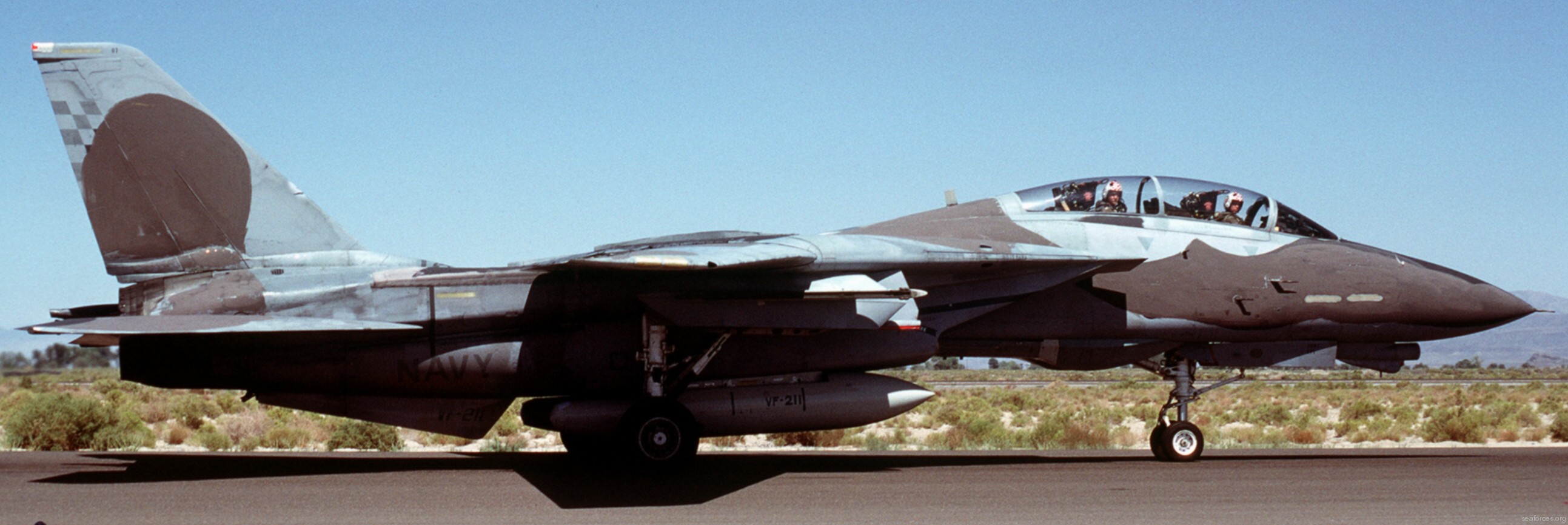 F-14A Tomcat (VF-211 / CVW-9) with an experimental campouflage paint at NAS Fallon, Nevada - July 1986 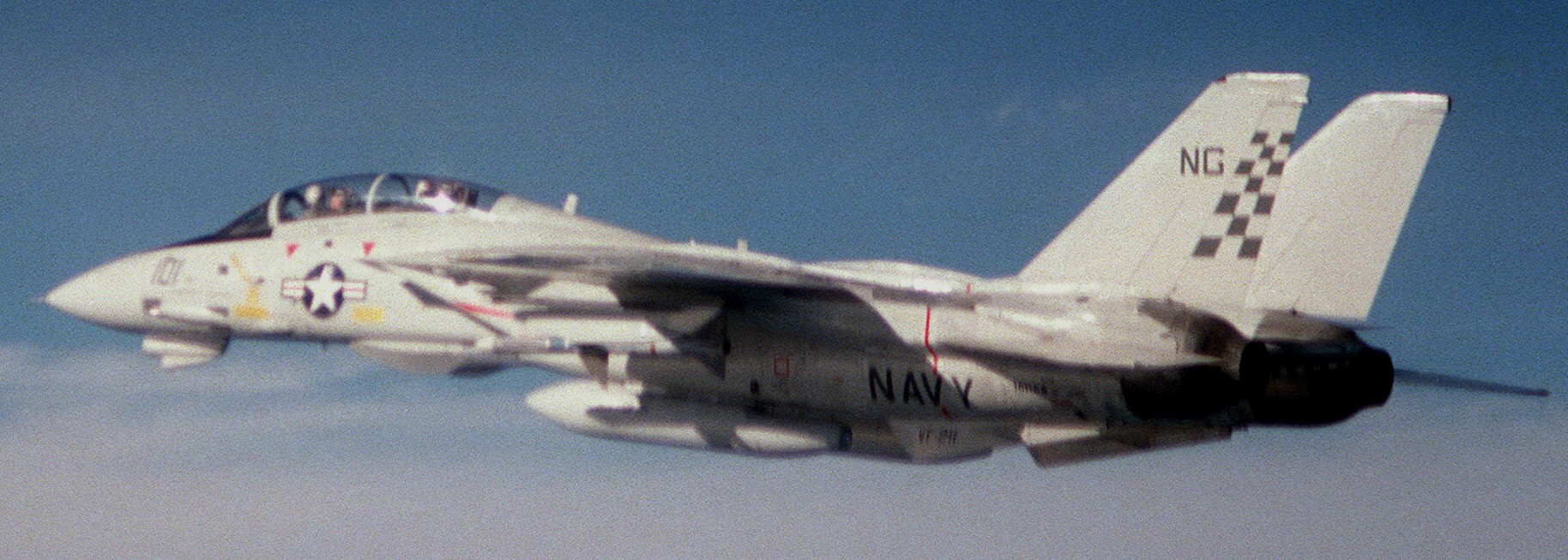 F-14A Tomcat (VF-211 / CVW-9) embarked on USS Kitty Hawk (CV 63) - December 1985 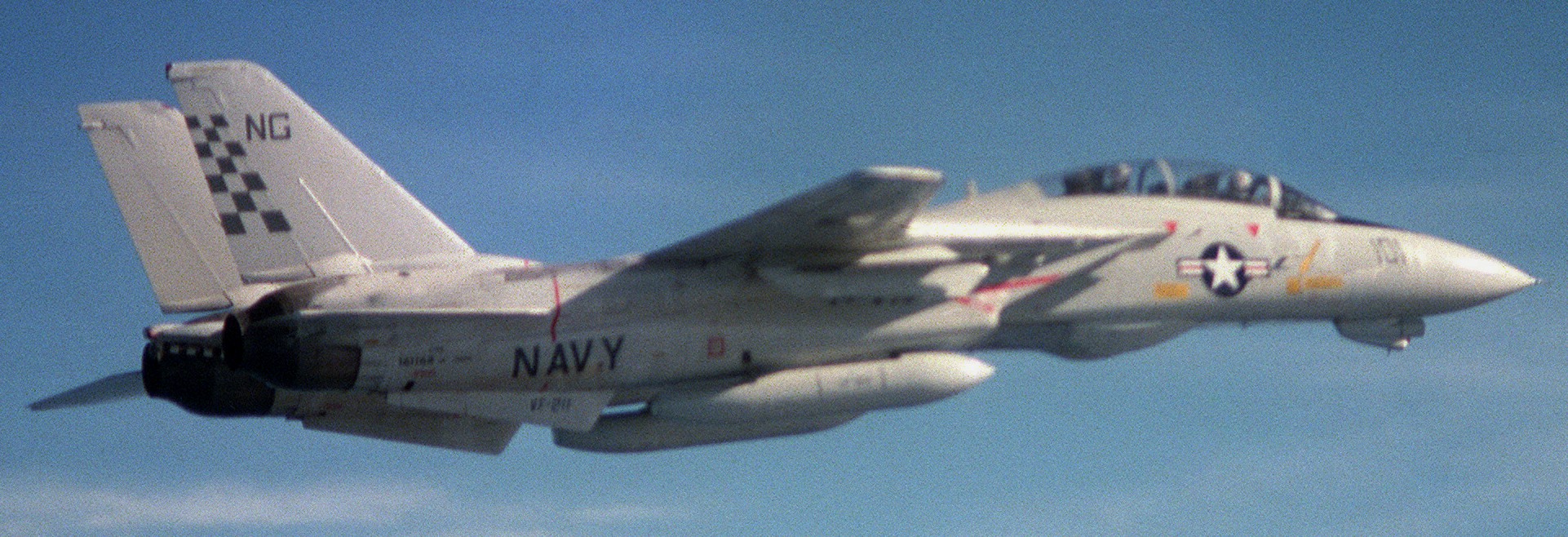 F-14A Tomcat (VF-211 / CVW-9) embarked on USS Kitty Hawk (CV 63) - December 1985  F-14A Tomcat (VF-211 / CVW-9) embarked on USS Kitty Hawk (CV 63) - November 1985 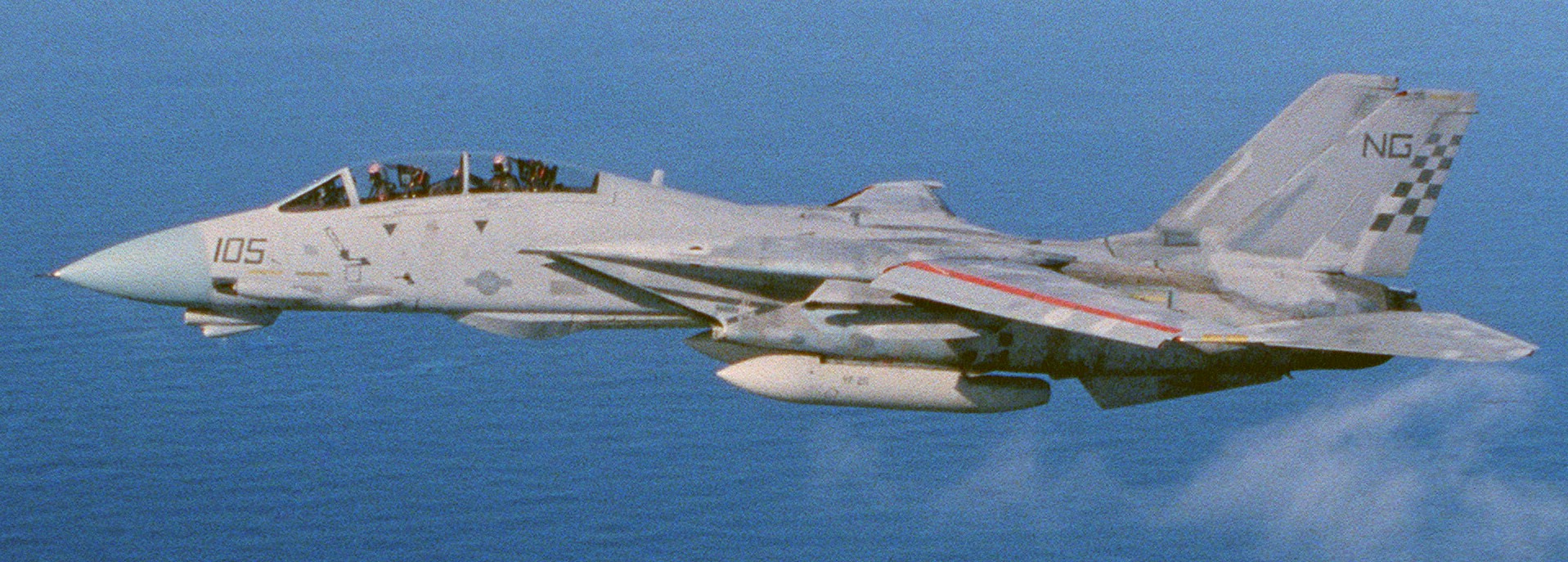 F-14A Tomcat (VF-211 / CVW-9) embarked on USS Kitty Hawk (CV 63) - November 1985 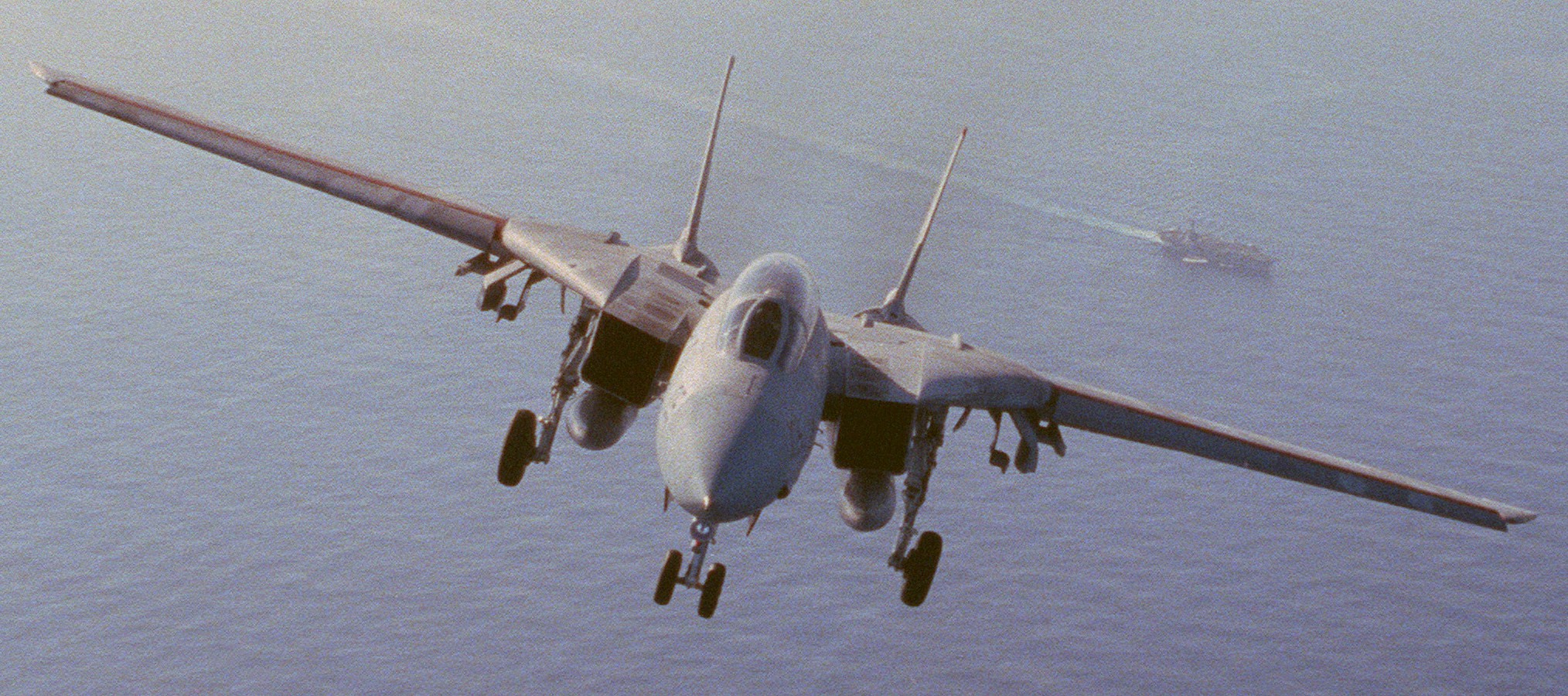 F-14A Tomcat (VF-211 / CVW-9) embarked on USS Kitty Hawk (CV 63) - November 1985 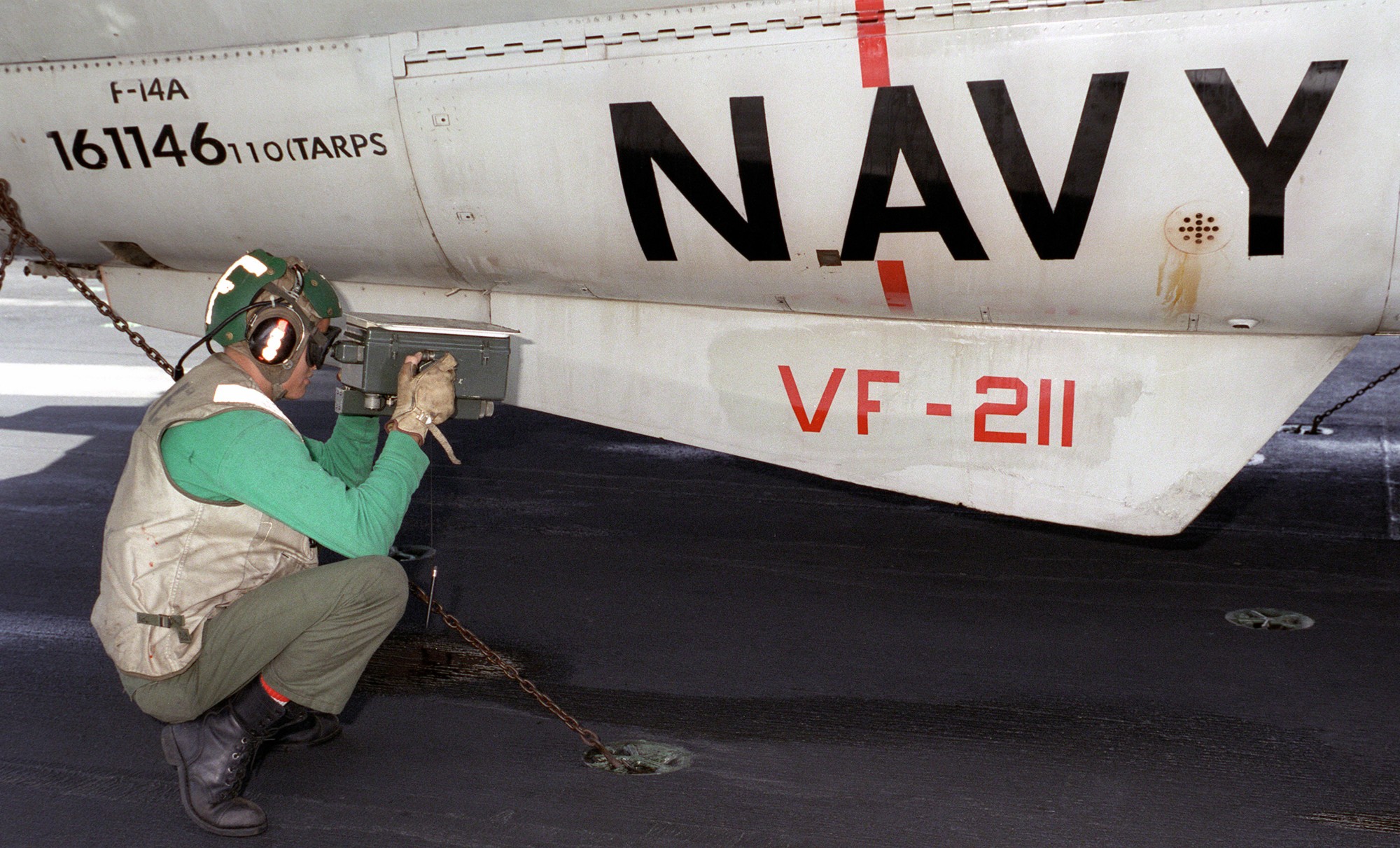 F-14A Tomcat (VF-211 / CVW-9) - 1985 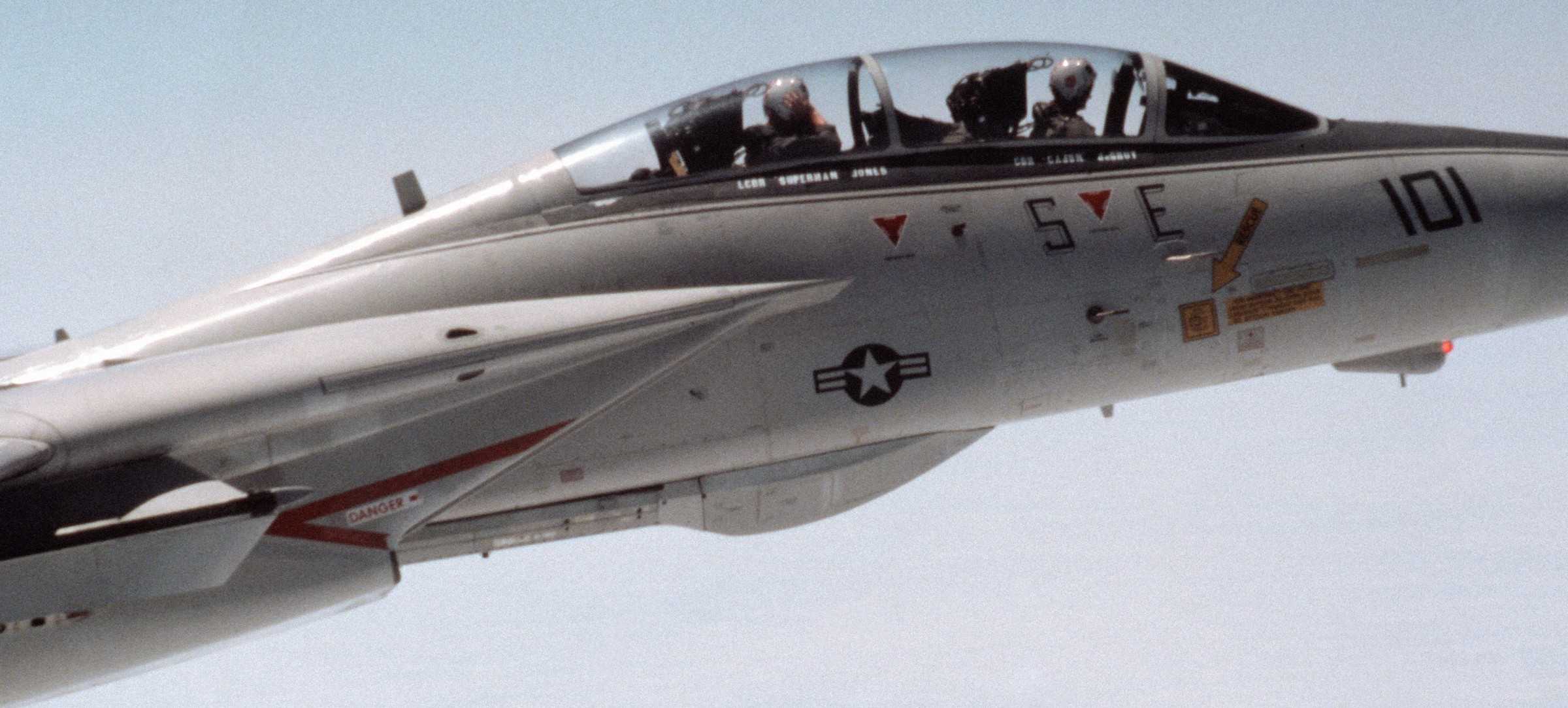 F-14A Tomcat (VF-211 / CVW-9) over San Diego - June 1984 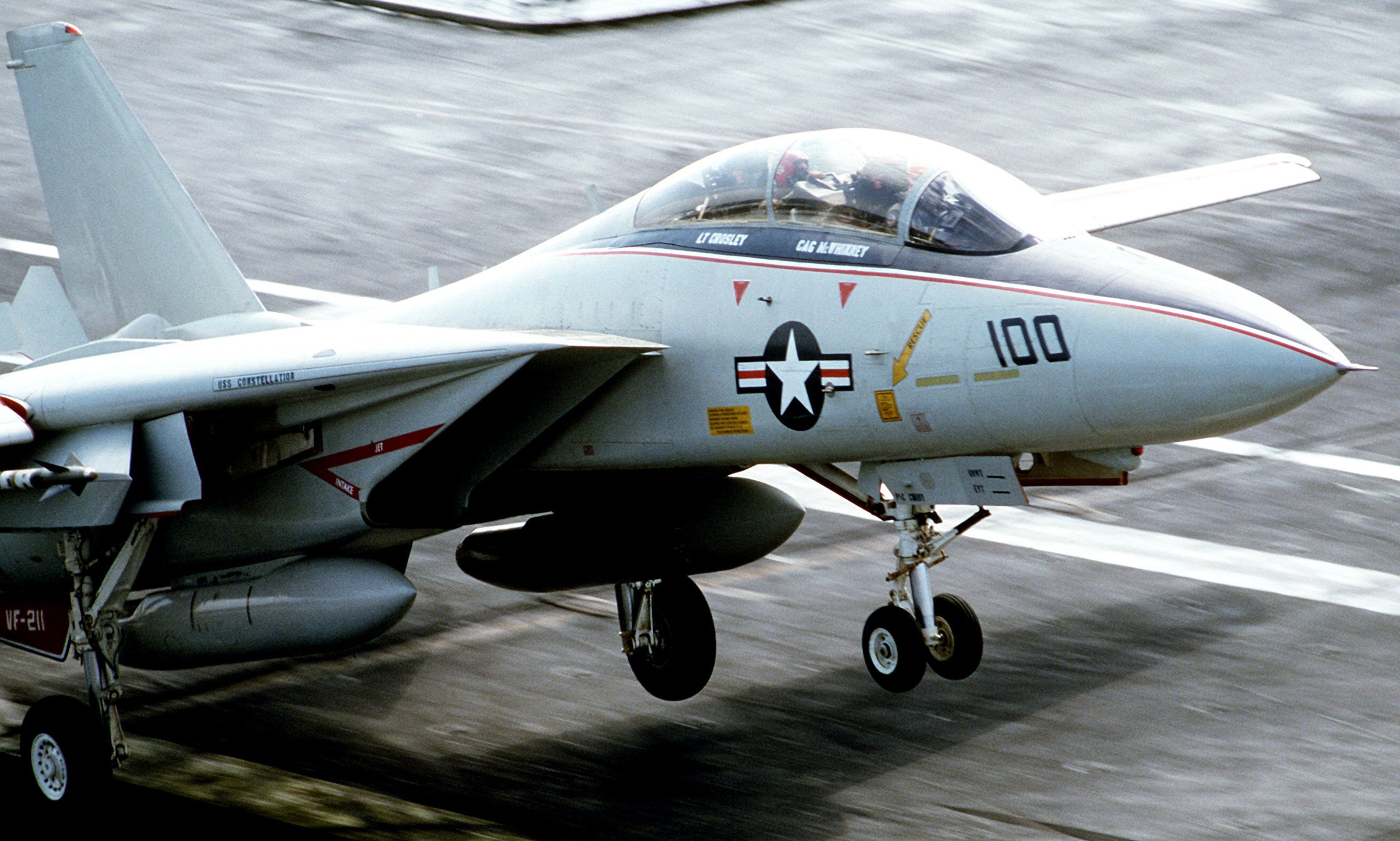 F-14A Tomcat (VF-211 / CVW-9) embarked on USS Constellation (CV 64) - February 1982 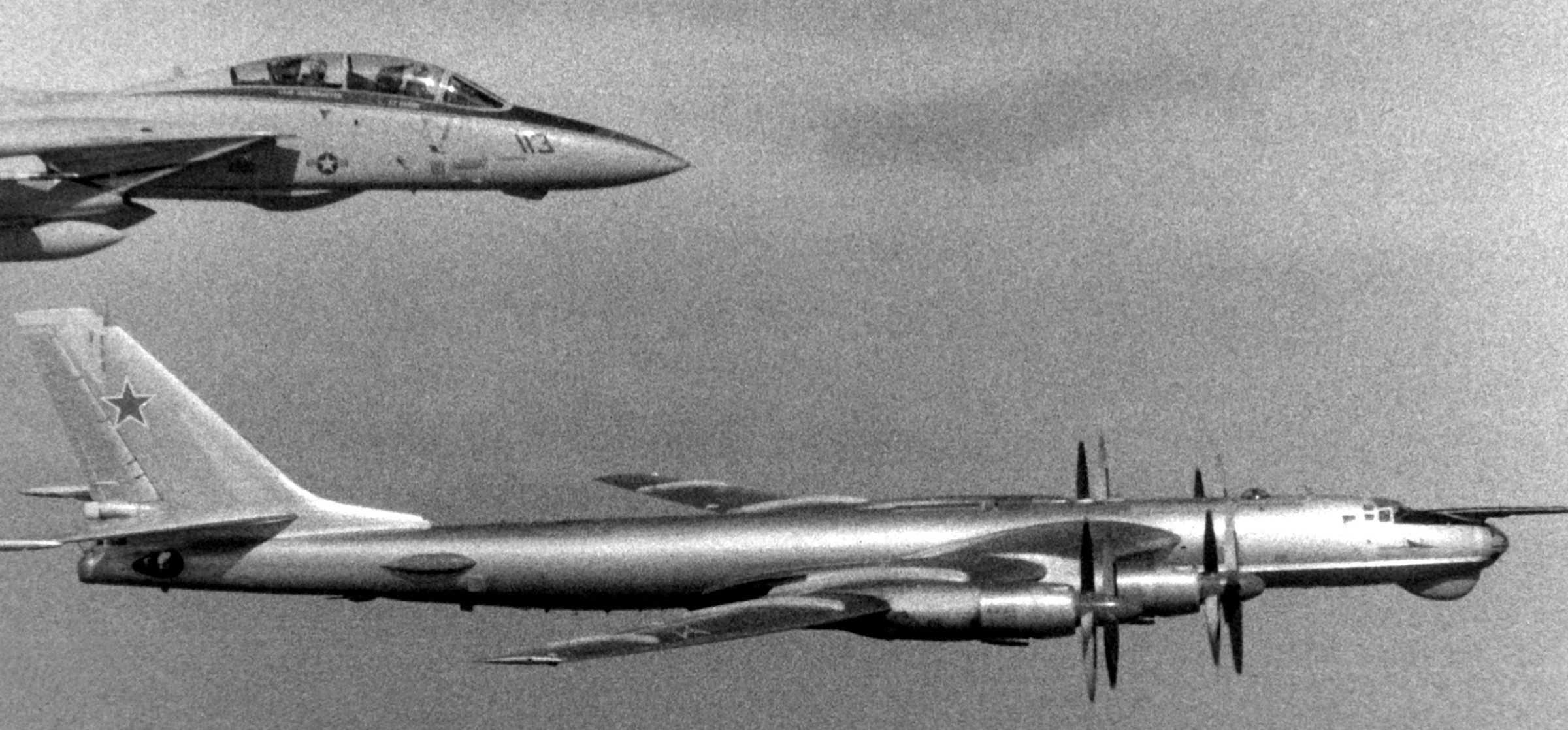 F-14A Tomcat (VF-211 / CVW-9) embarked on USS Constellation (CV 64) intercepting a Soviet Tu-95 Bear aircraft - January 1982 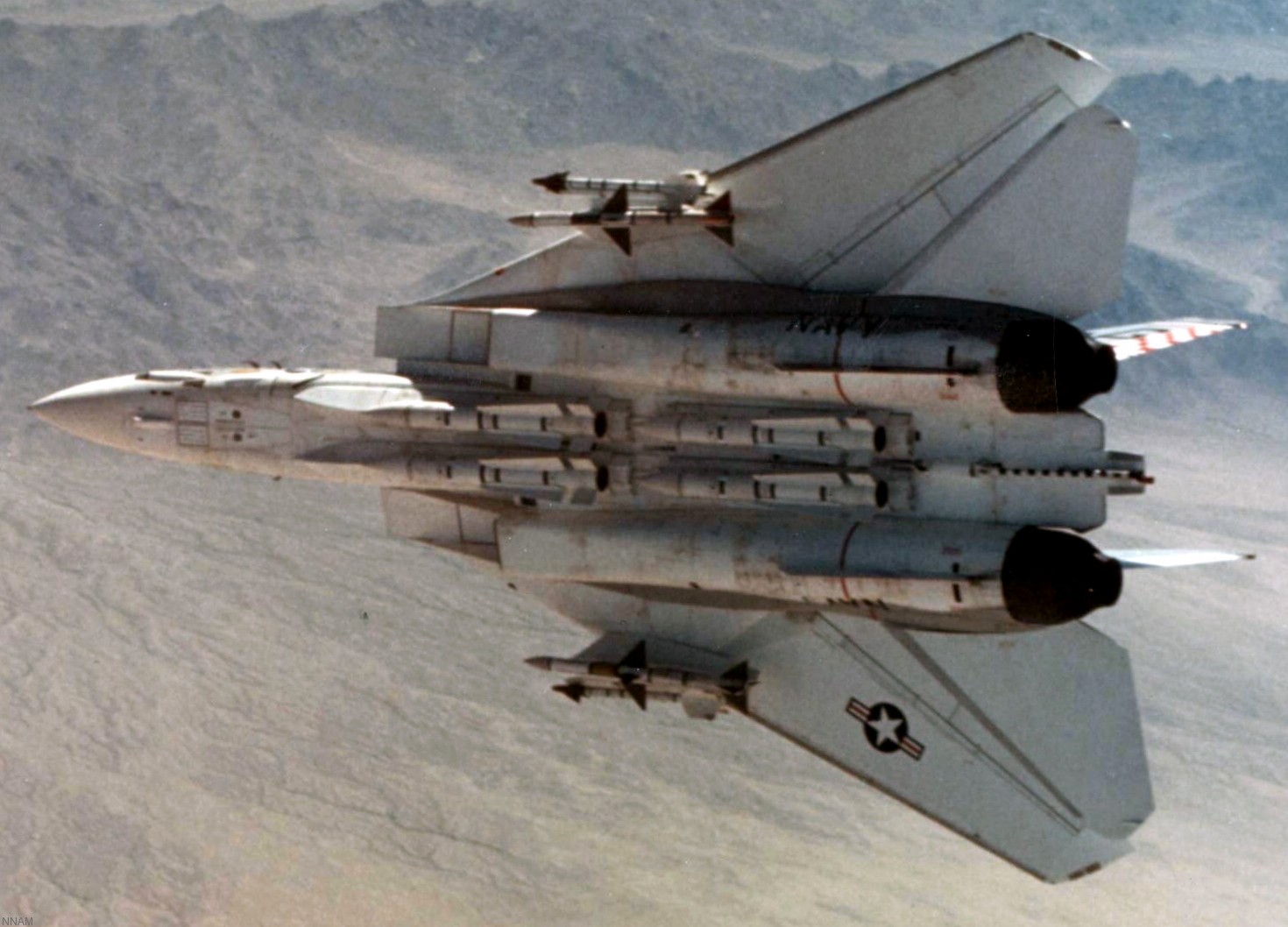 F-14A Tomcat (VF-211 / CVW-9) with four AIM-54A Phoenix two AIM-7E Sparrow and two AIM-9D Sidewinder missiles - circa 1977 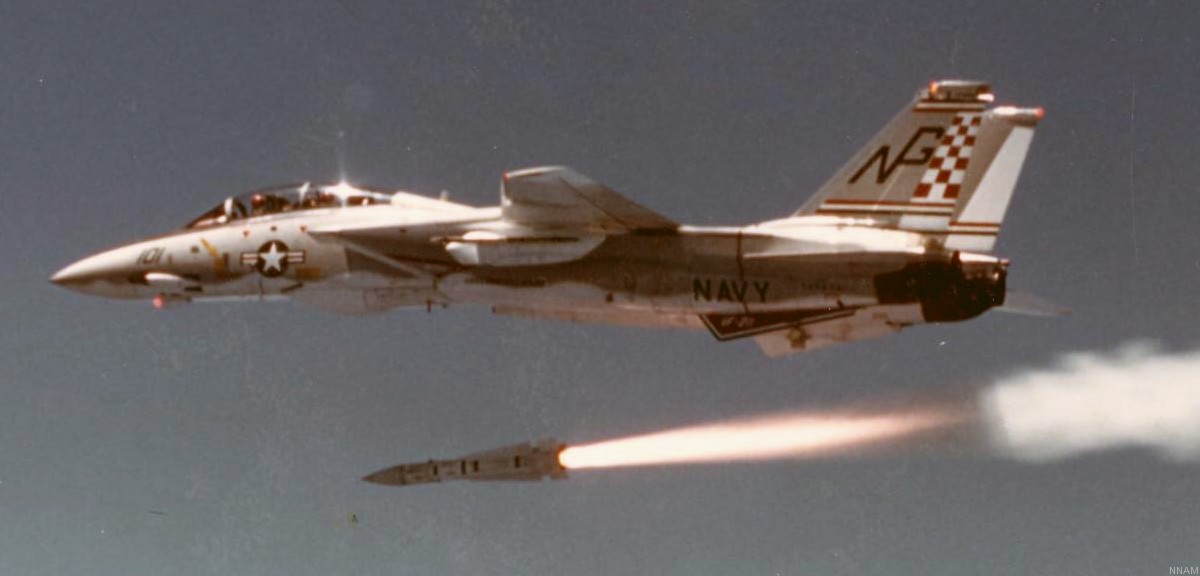 F-14A Tomcat (VF-211 / CVW-9) firing an AIM-54 Phoenix missile - 1976 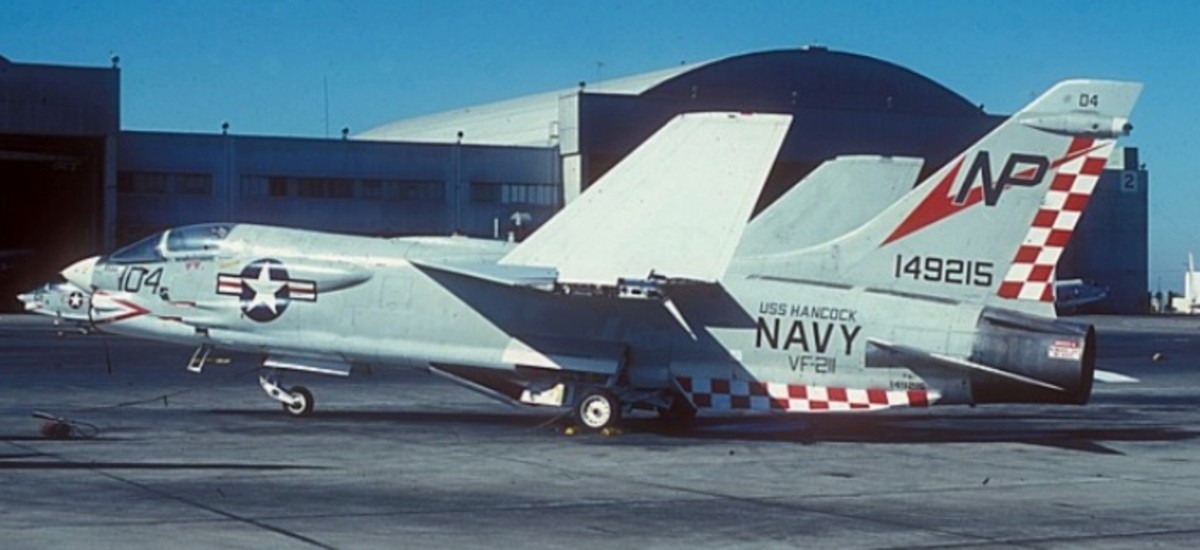 F-8J Crusader (VF-211 / CVW-21) - November 1975 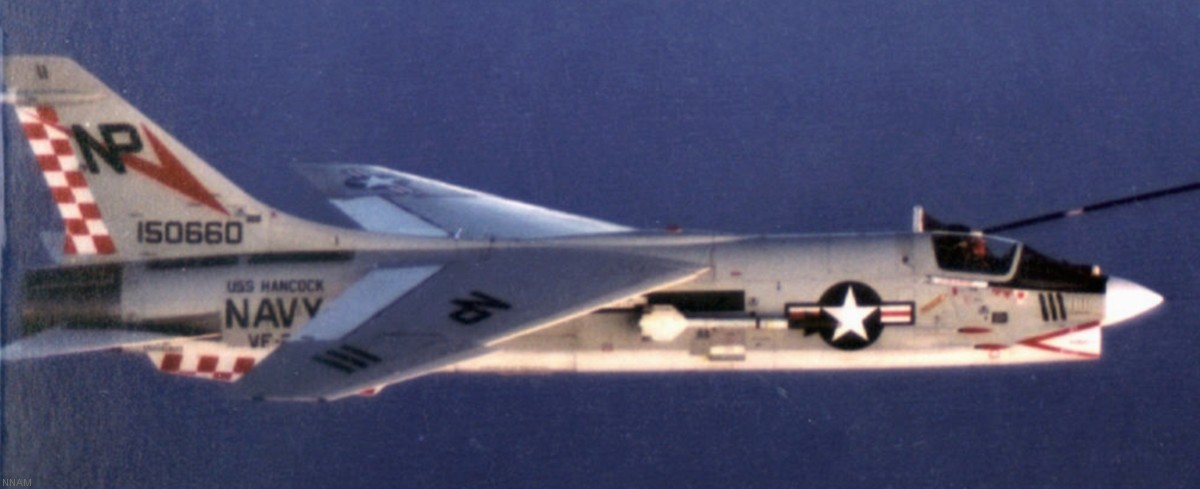 F-8J Crusader (VF-211 / CVW-21) embarked on USS Hancock (CVA 19) - 1972 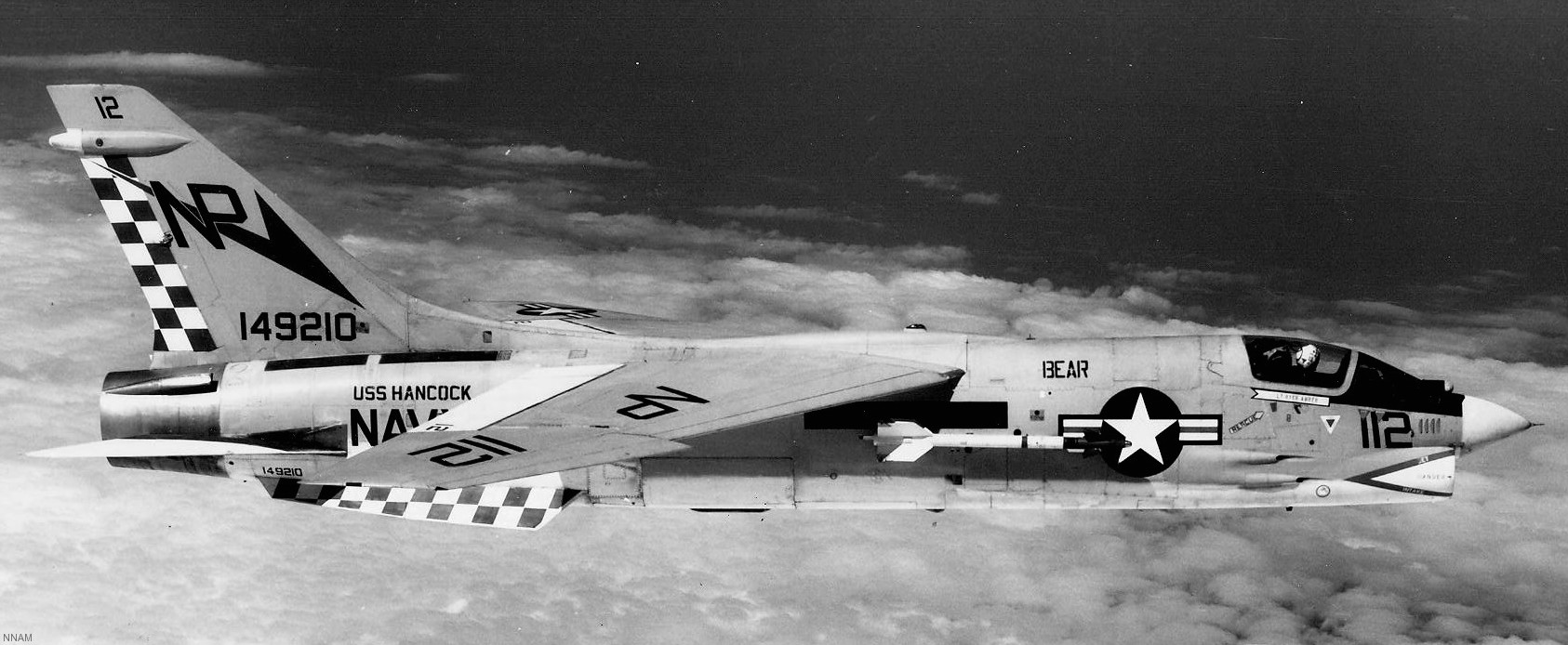 F-8J Crusader (VF-211 / CVW-21) embarked on USS Hancock (CVA 19) - March 1971 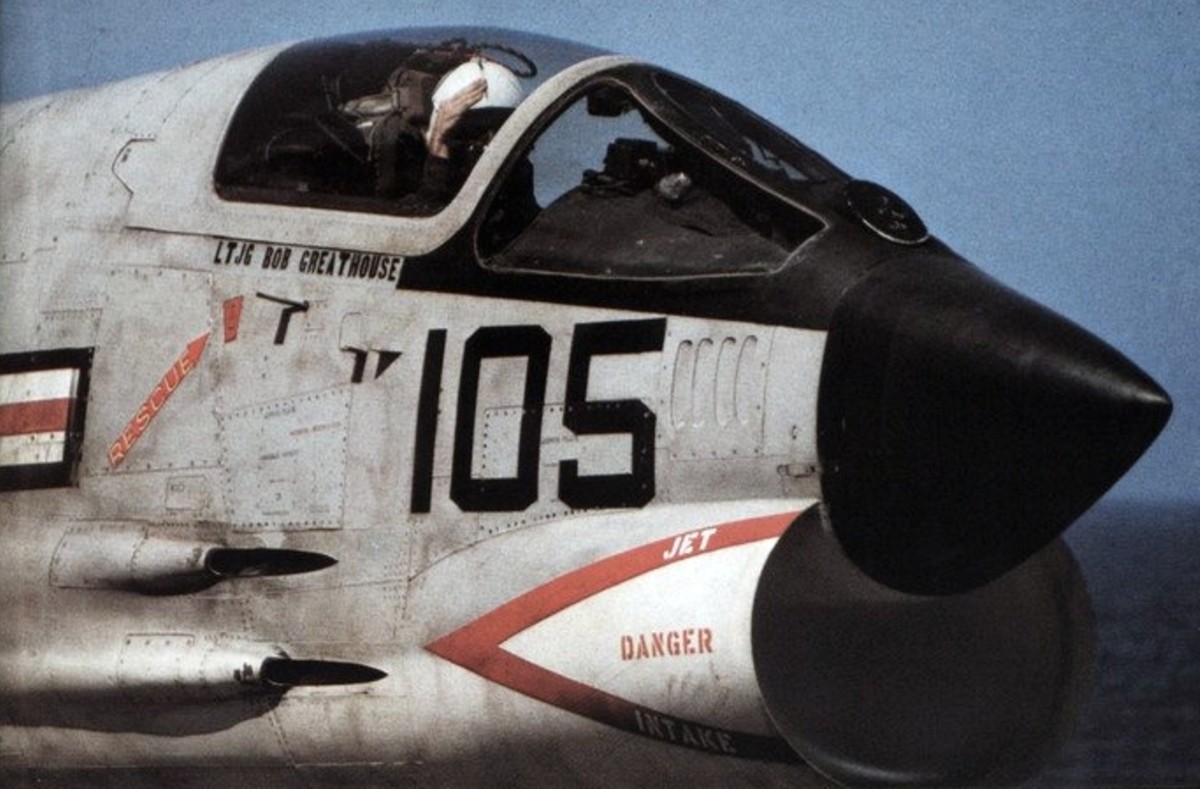 F-8H Crusader (VF-211 / CVW-21) embarked on USS Hancock (CVA 19) - 1968 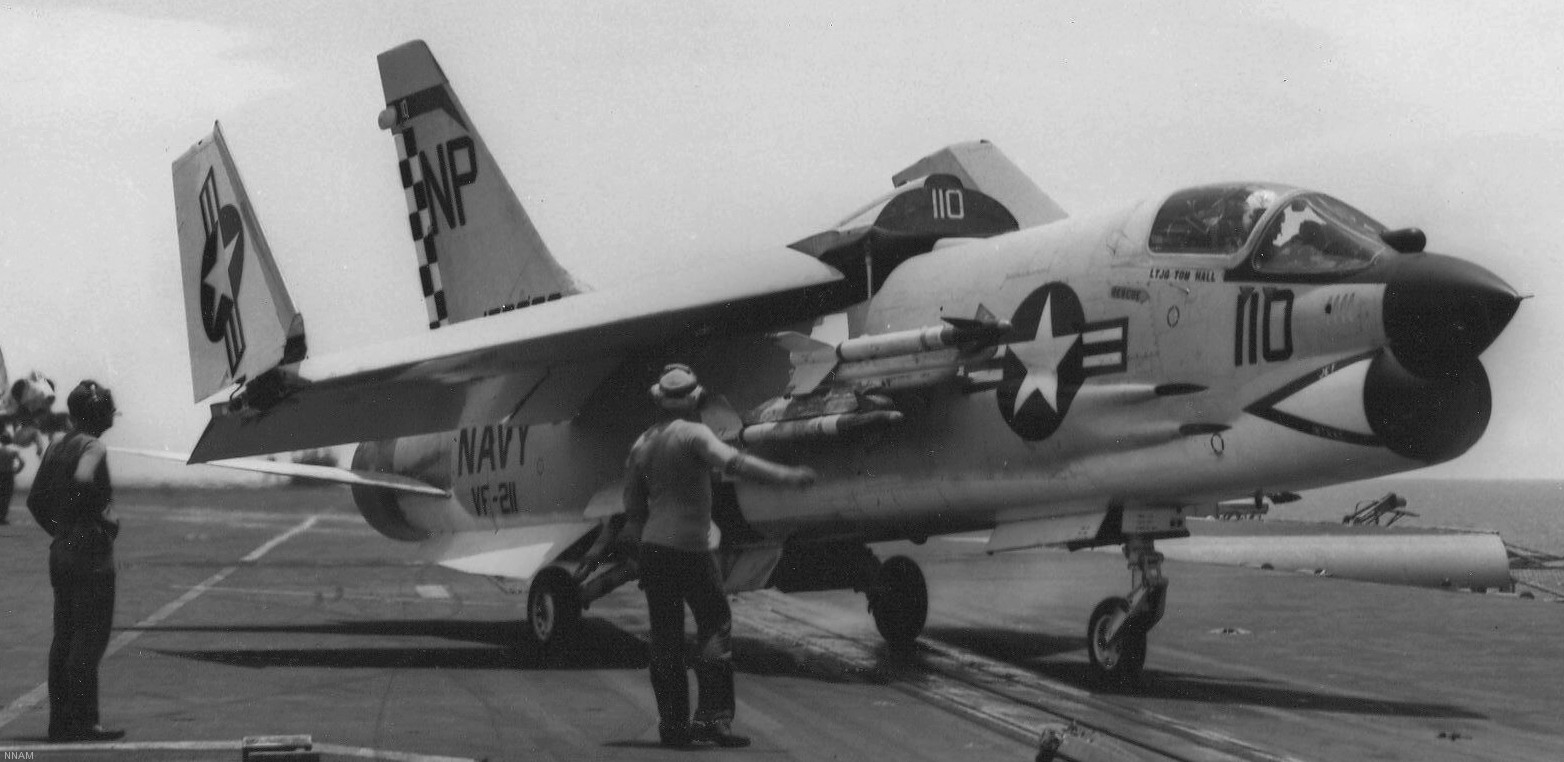 F-8E Crusader (VF-211 / CVW-21) embarked on USS Bon Homme Richard (CVA 31) - April 1967 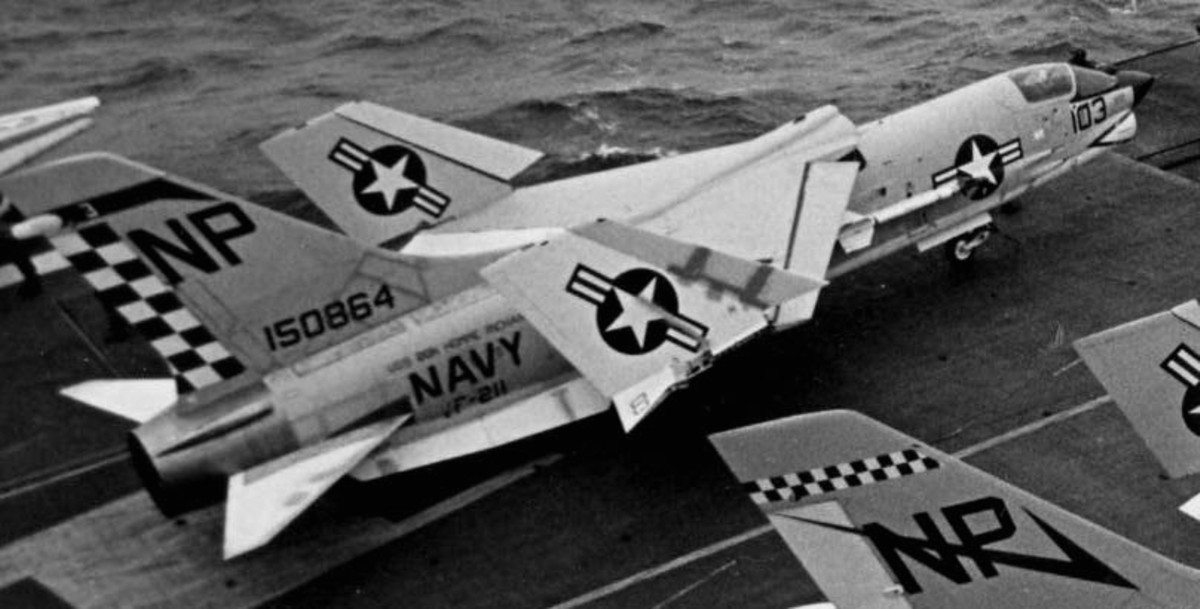 F-8E Crusader (VF-211 / CVW-21) embarked on USS Bon Homme Richard (CVA 31) - March 1967 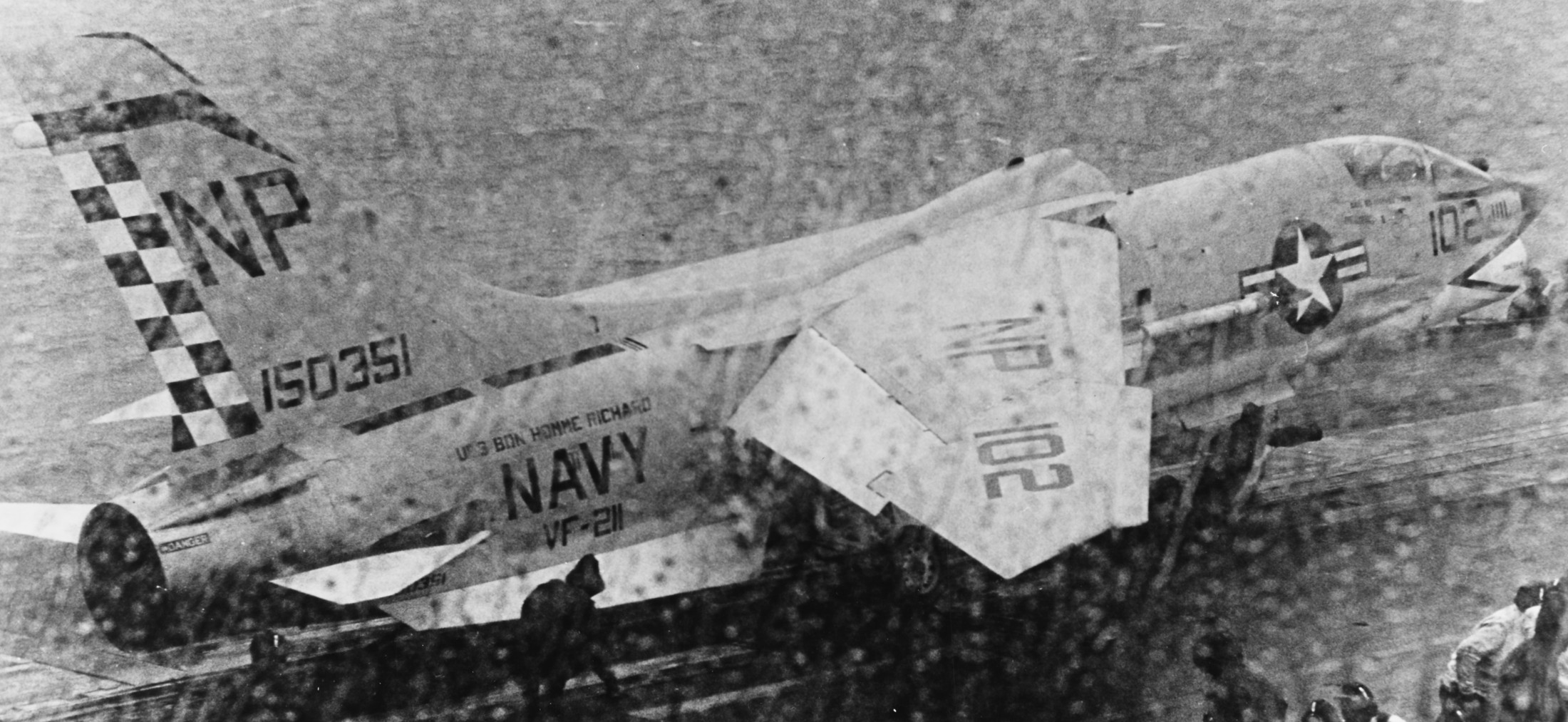 F-8E Crusader (VF-211 / CVW-21) embarked on USS Bon Homme Richard (CVA 31) - March 1967 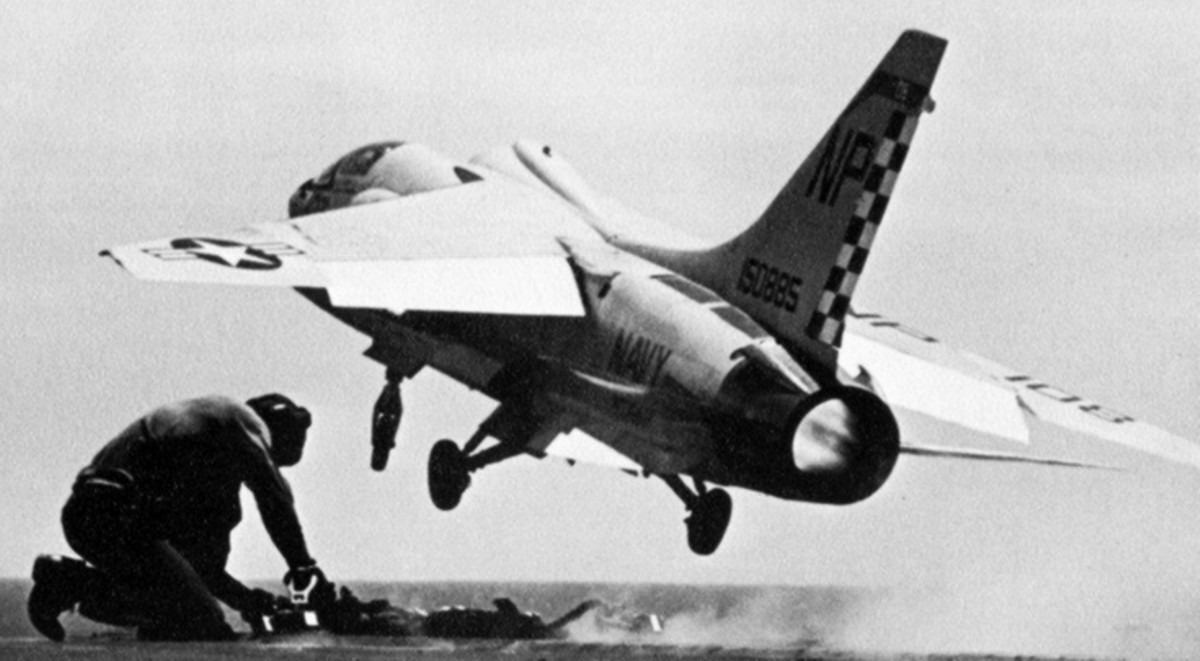 F-8E Crusader (VF-211 / CVW-21) embarked on USS Bon Homme Richard (CVA 31) - 1967 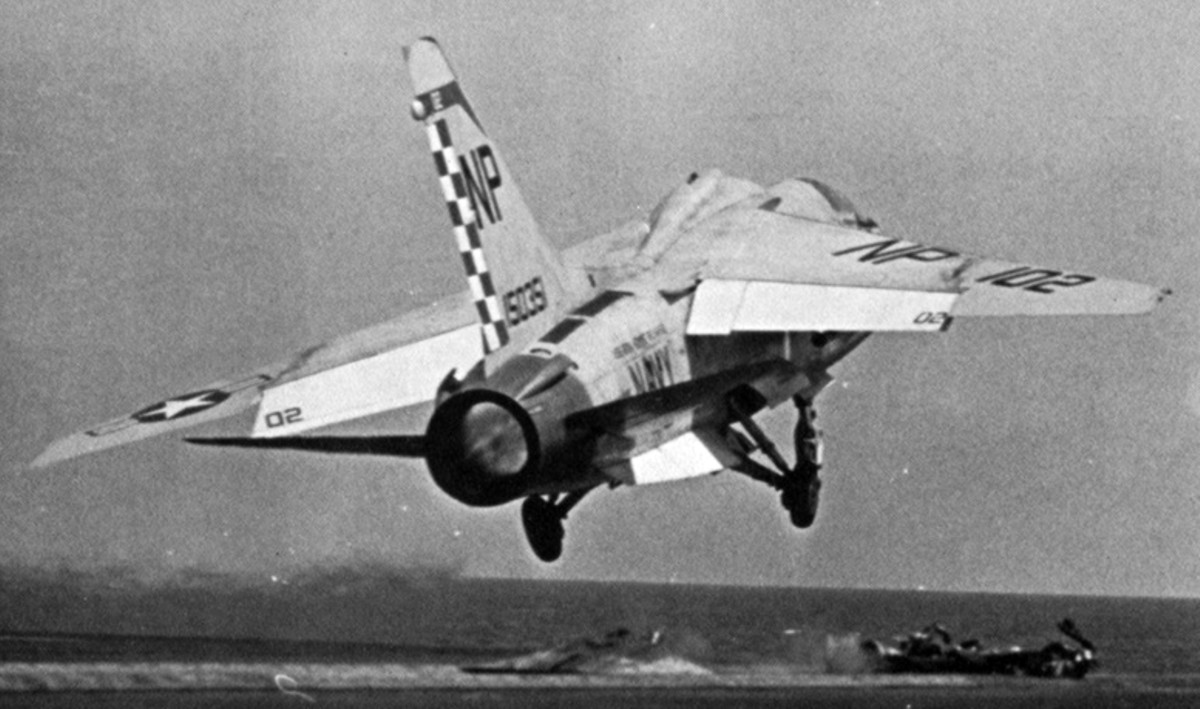 F-8E Crusader (VF-211 / CVW-21) embarked on USS Bon Homme Richard (CVA 31) - 1967 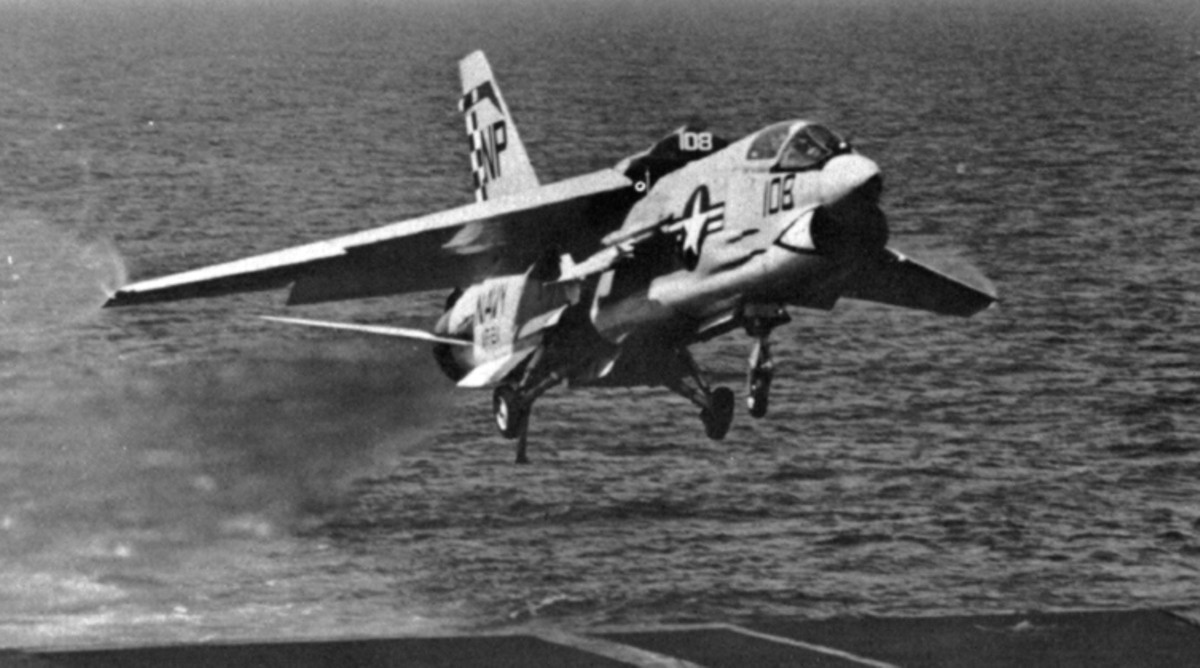 F-8E Crusader (VF-211 / CVW-21) embarked on USS Bon Homme Richard (CVA 31) - 1967 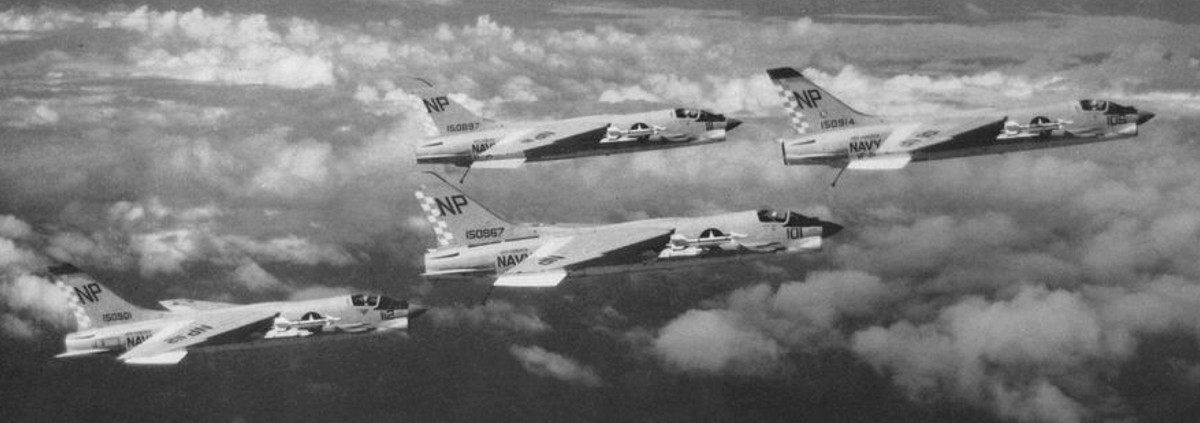 F-8E Crusader (VF-211 / CVW-21) embarked on USS Hancock (CVA 19) - 1966 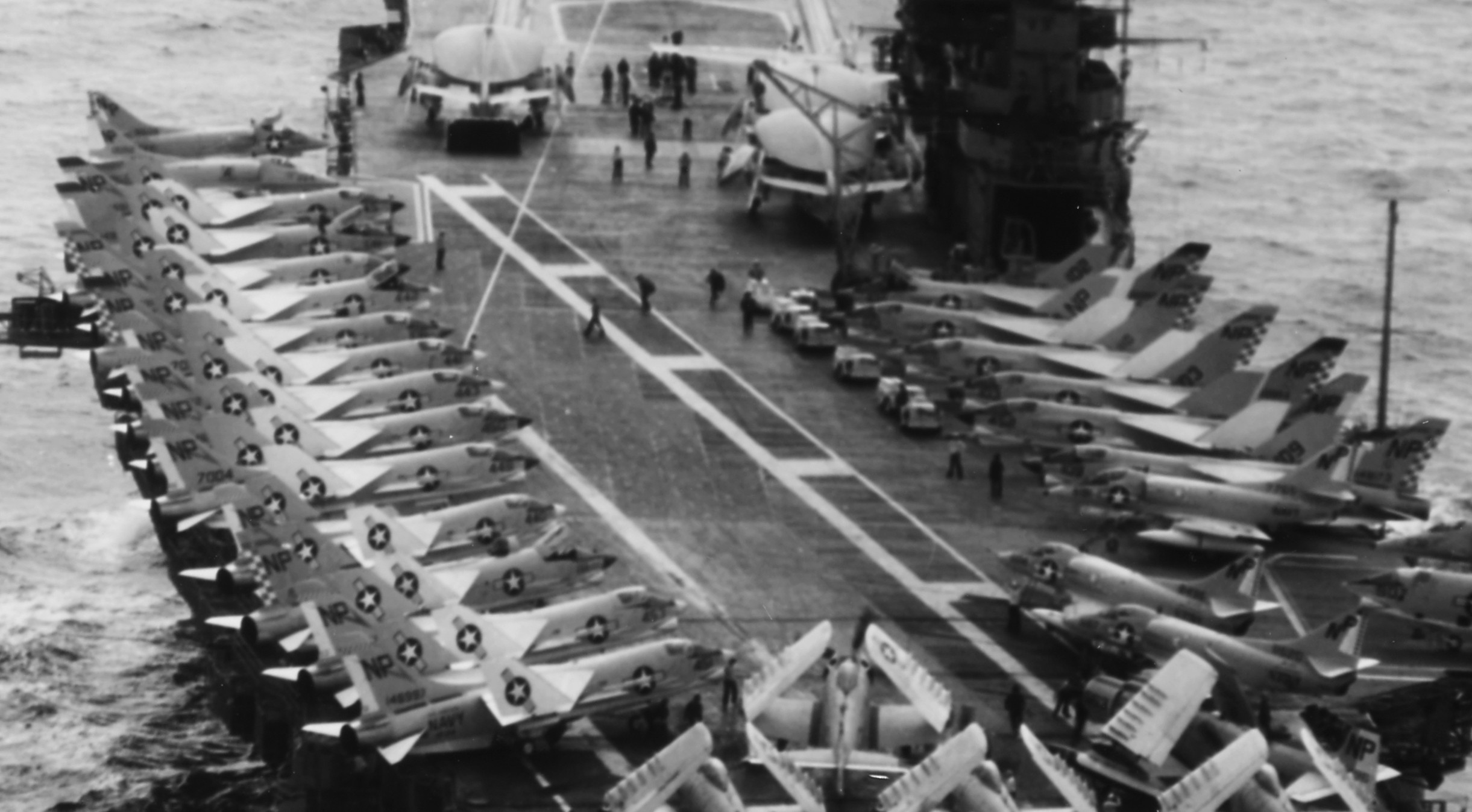 F-8E Crusaders (VF-211 / CVW-21) embarked on USS Hancock (CVA 19) - 1966 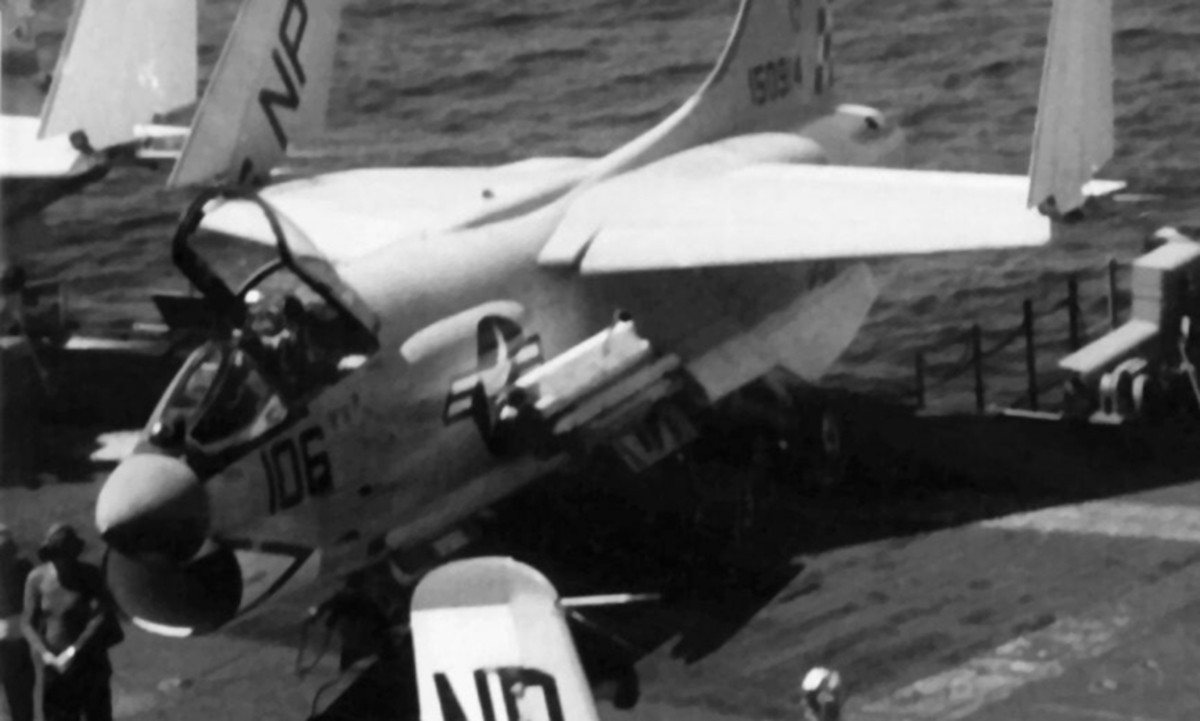 F-8E Crusader (VF-211 / CVW-21) embarked on USS Hancock (CVA 19) - 1965 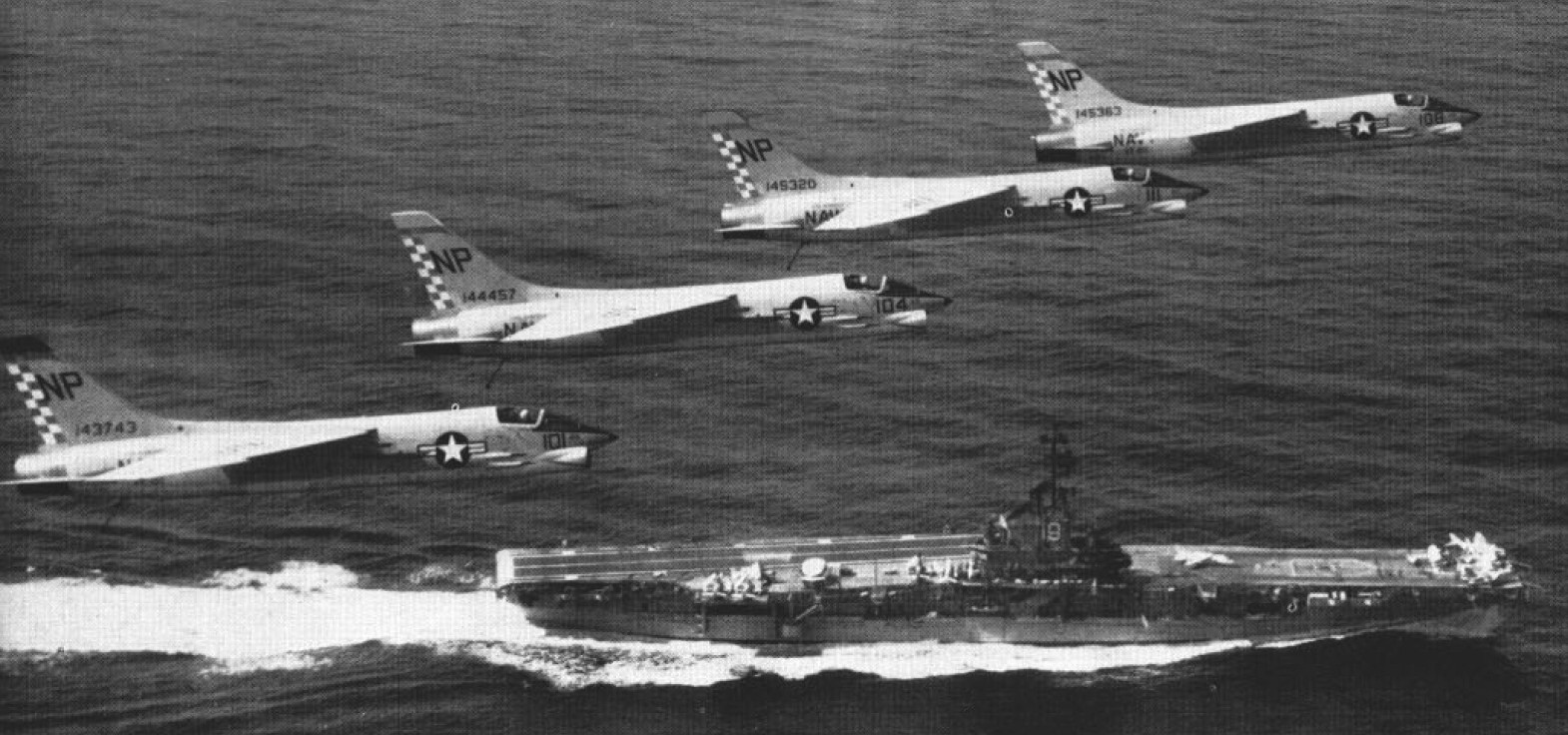 F-8A Crusader (VF-211 / CVG-21) embarked on USS Hancock (CVA 19) - 1963 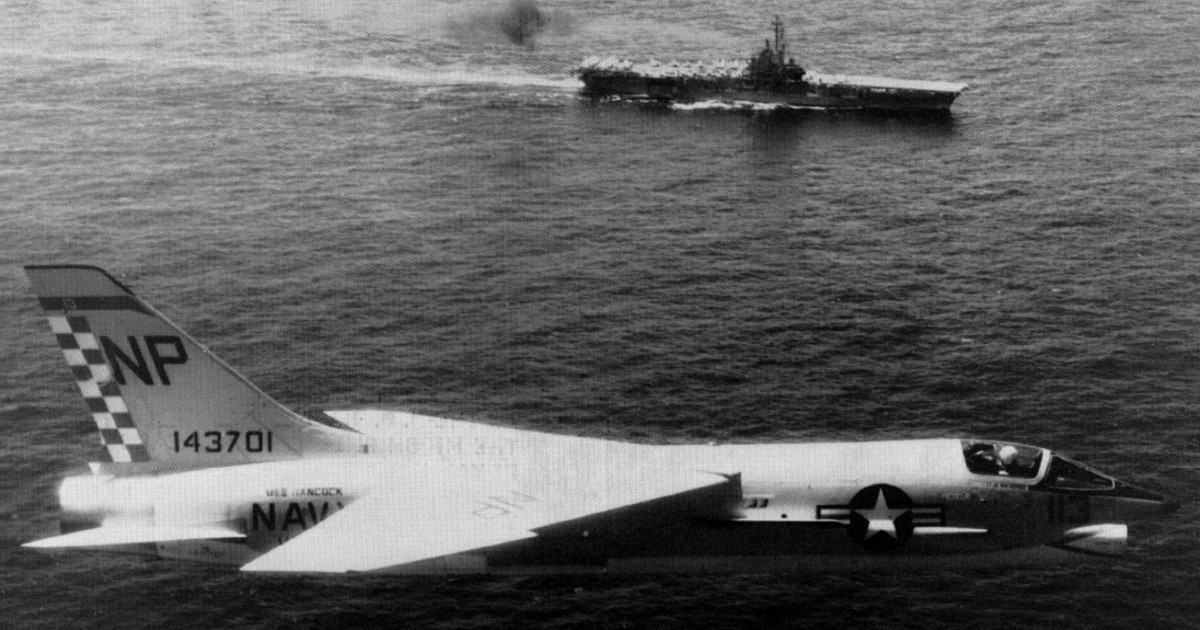 F-8A Crusader (VF-211 / CVG-21) embarked on USS Hancock (CVA 19) - 1963 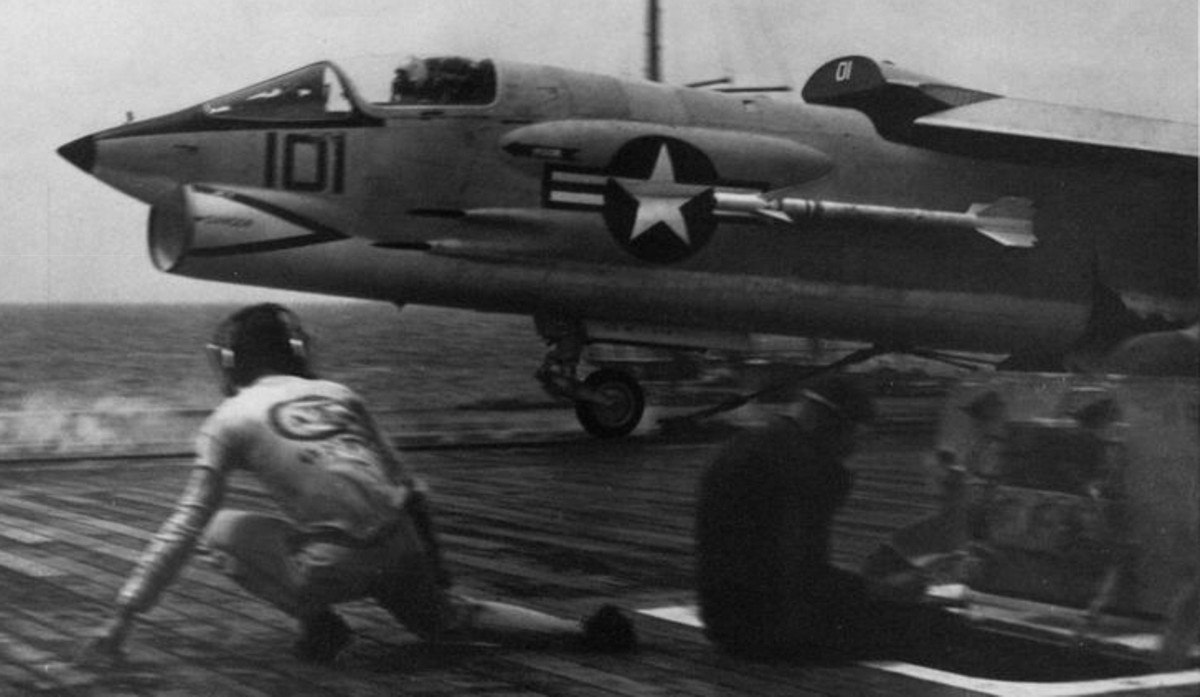 F-8A Crusader (VF-211 / CVG-21) embarked on USS Hancock (CVA 19) - 1963 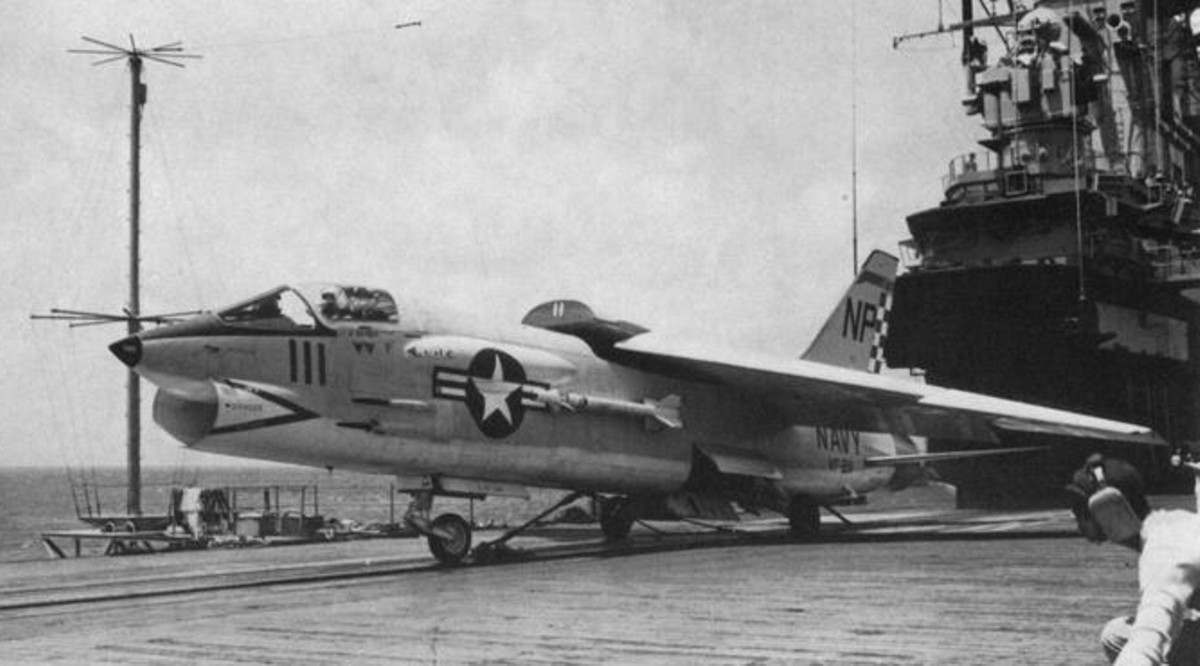 F-8A Crusader (VF-211 / CVG-21) embarked on USS Hancock (CVA 19) - 1963 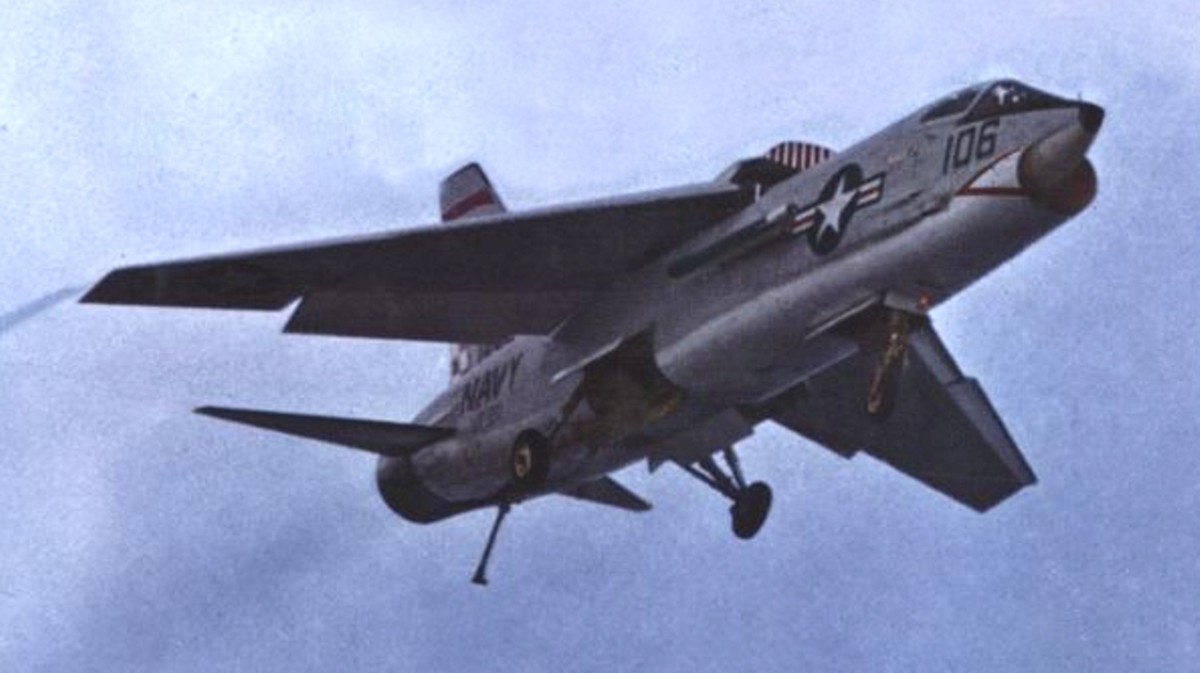 F-8A Crusader (VF-211 / CVG-21) embarked on USS Hancock (CVA 19) - 1963 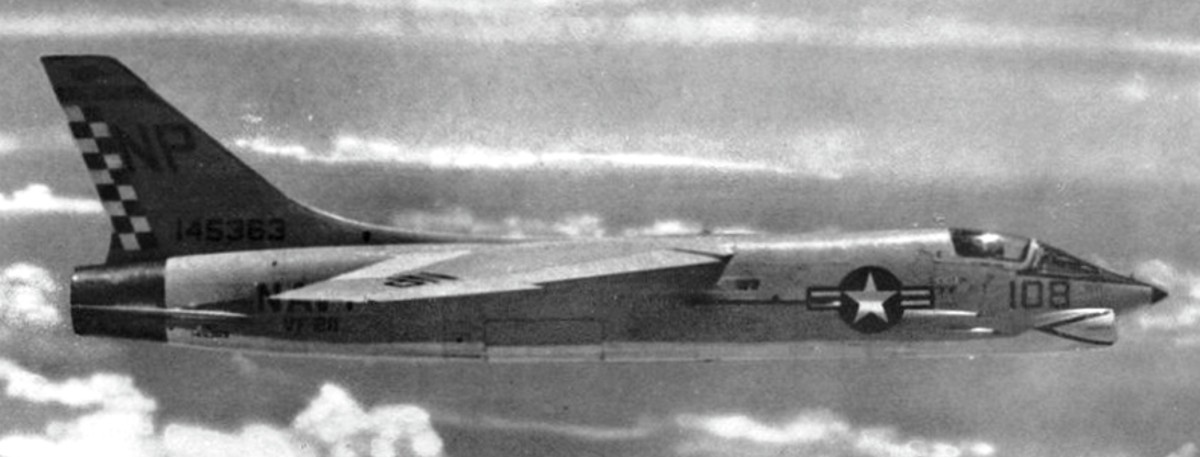 F8U-1 Crusader (VF-211 / CVG-21) embarked on USS Hancock (CVA 19) - 1962-63 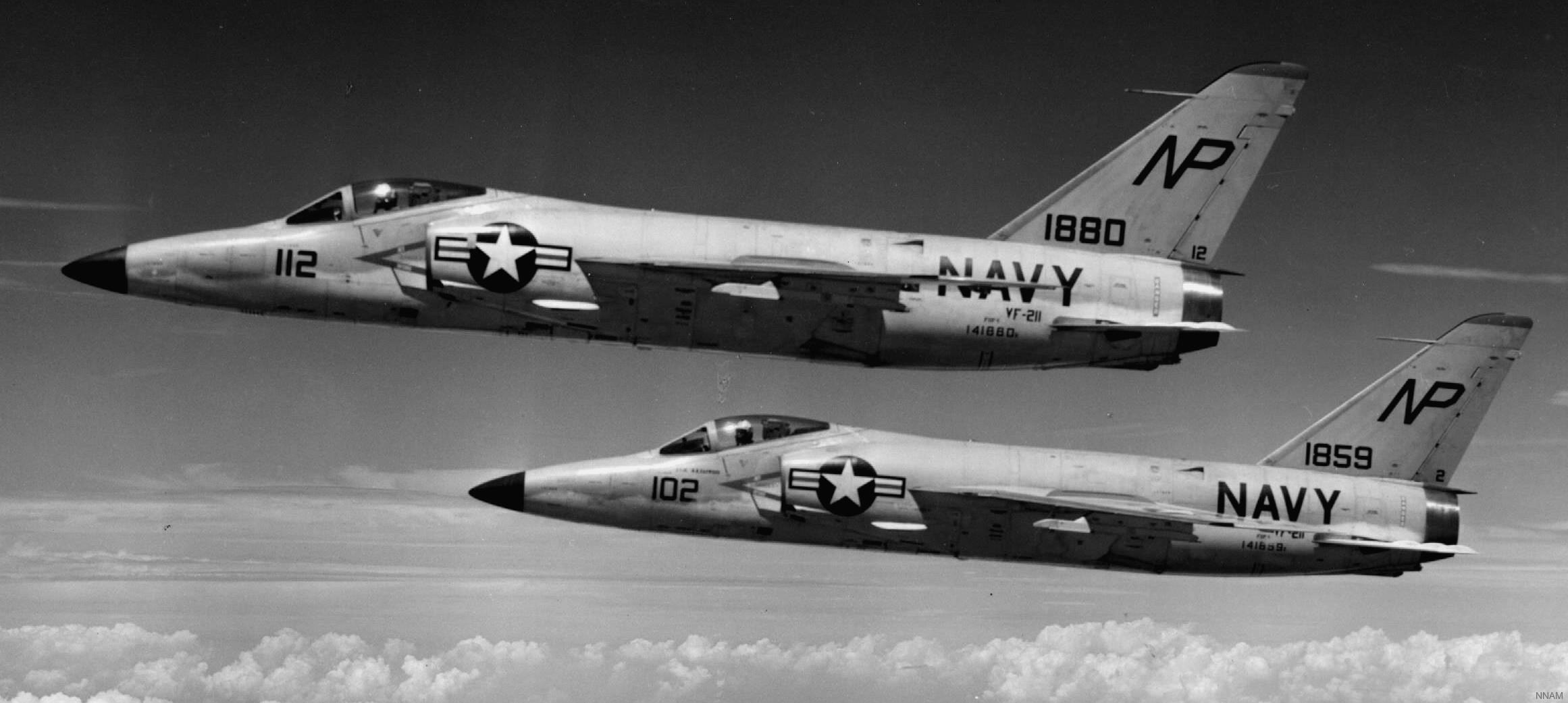 F11F-1 Tiger (VF-211 / CVG-21) - 1959 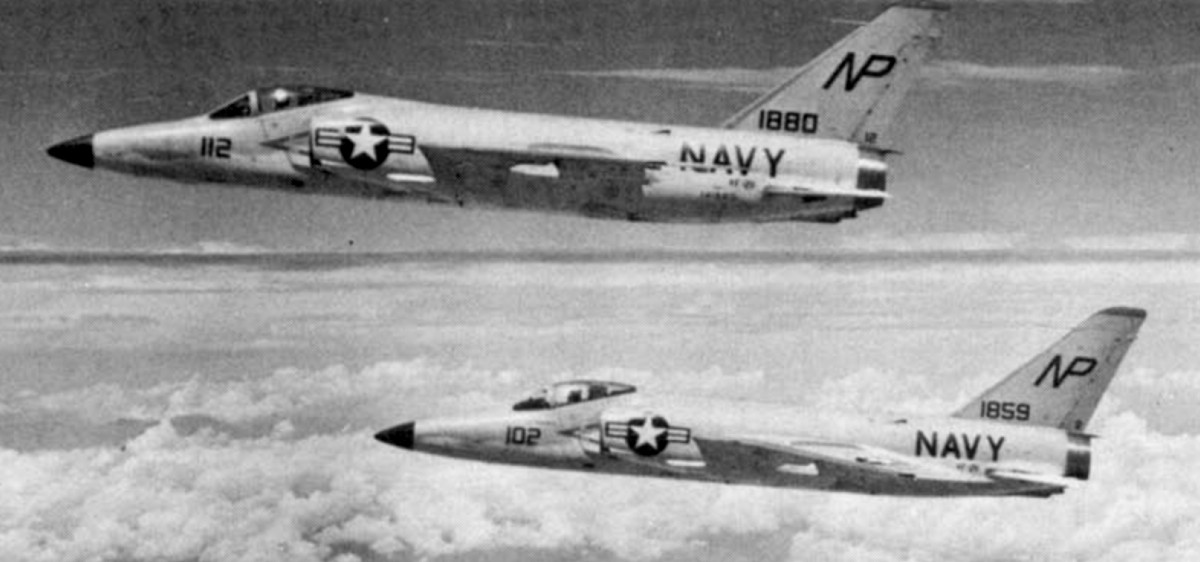 F11F-1 Tiger (VF-211 / CVG-21) over Japan - 1959 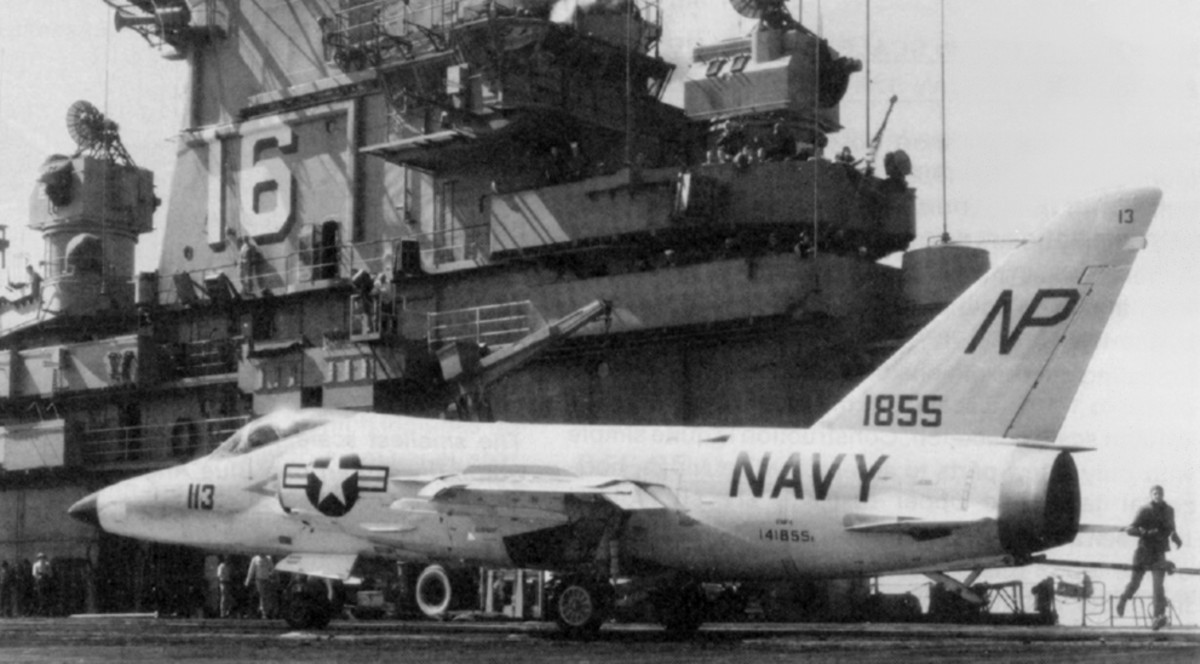 F11F-1 Tiger (VF-211 / CVG-21) embarked on USS Lexington (CVA 16) - 1959 |
||||||
|
|
||||||
|
On the first day of May 1945, Bombing
Squadron 74 (VB-74) Bomb-a-Toms was born, destined to become the
present day Strike Fighter Squadron 211 (VFA-211) Checkmates. The
Bomb-a-Toms began life at NAAF Otis Field, Camp Edwards,
Massachusetts, with 36 Naval Aviators flying SBW-4E Helldivers. The
squadron soon transferred to East Field, NAS Norfolk, Virginia, and
made their arrested landings on 31 October 1945 aboard the newly
commissioned USS Midway (CV 41). During 1946, VB-74 became Attack Squadron 1B (VA-1B) and transitioned to AD-1 Skyraiders. Less than two years later, the Navy again reorganized, and VA-1B became Attack Squadron 24 (VA-24), flying AD-2 Skyraiders. Skyraider aircraft were soon grounded because of engine problems, requiring a hasty transition to the F4U-4 Corsair a mere six weeks before departing on deployment aboard the USS Coral Sea (CV 43). After this deployment VA-24 moved to NAS Oceana, Virginia, and on 1 December 1949 was redesignated Fighter Squadron 24 (VF-24). Following a move to NAS Alameda, CA, VF-24 made two back-to-back deployments to Korea inflicting heavy damage on enemy emplacements, rail yards, bridges, warehouses, and airfields. Following the second deployment, VF-24 relocated to NALF Santa Rosa, CA, and transitioned to the F9F-2 Panther, the squadron’s first jet aircraft. In February 1952, VF-24 deployed aboard the USS Boxer (CV 21) and headed to Korea for their third combat tour. Throughout the 1950s, VF-24 flew a number of aircraft, including the FJ-3 Fury, the F3H-2M Demon, the F-11F Tiger, and finally the F-8 Crusader. On 9 March 1959, VF-24 traded air wings, insignia, and designations with Fighter Squadron 211 (VF-211), the Checkmates. In 1961, the Checkmates moved to NAS Miramar, California, their home for the next 35 years. On seven deployments during the Vietnam War, VF-211 pilots earned the title of “The MiG Killers,” having downed eight enemy aircraft in air-to-air engagements. In December 1975, VF-211 transitioned to the revolutionary new F-14A Tomcat. The Checkmates completed numerous WESTPAC deployments during the 1970s and 1980s and in 1989, upgraded to the more advanced F-14B. In 1991, the Checkmates deployed to the Arabian Gulf in support of Operation DESERT STORM., providing air superiority and aerial reconnaissance imagery for coalition forces. Transitioning back to the F-14A in 1992, the Fighting Checkmates deployed to the Arabian Gulf in 1993 and 1995-96. In August 1996, the Checkmates moved back to NAS Oceana, VA, in conjunction with the turnover of NAS Miramar to the U.S. Marine Corps, VF-211 remained attached to Carrier Air Wing Nine. In 1997, the squadron deployed aboard USS Nimitz (CVN 68), spending four months in the Arabian Gulf in support of Operation SOUTHERN WATCH. VF-211 flew daily sorties over Iraq enforcing the United Nations imposed no-fly zone, providing valuable photo reconnaissance imagery. In 2000, VF-211 joined USS John C. Stennis (CVN 74) for its Millennium Cruise. Over a four-month period in the Arabian Gulf, the Checkmates led the air wing conducting 16 precision strikes in support of Operation SOUTHERN WATCH. After the terrorist attacks of September 11, 2001, the Checkmates deployed with Carrier Air Wing Nine, in an accelerated schedule that had VF-211 aircraft flying combat missions over Afghanistan by December. The Checkmates left their mark on Operation ENDURING FREEDOM during a three-week battle named Operation ANACONDA where they flew day and night sorties to defend coalition forces and eliminate Al-Qaeda resistance. The Checkmates returned after flying 1,250 combat missions and were then assigned to Carrier Air Wing One. VF-211’s performance in 2002 was recognized throughout the fleet. For their achievements, they earned the West Coast Battle “E” for battle efficiency from Commander Naval Air Force Pacific Fleet, the Grand Slam Award for excellence in Air-to-Air employment fromby Commander Naval Air Force Atlantic Fleet, and the Clifton Award for the most outstanding overall performance in battle efficiency and employment from Commander Naval Air Forces. Additionally, for their precision and innovation in strike warfare, they awarded the coveted VADM “Sweetpea” Allen Precision Strike Award. The last squadron to fly the venerable F-14A Tomcat, the Checkmates deployed aboard USS Enterprise (CVN 65) in October of 2003 in support of Operations IRAQI FREEDOM and ENDURING FREEDOM (OIF and OEF). The squadron flew over 450 combat hours during October, November, and December in support of coalition efforts. VF-211 was redesignated Strike Fighter Squadron 211 (VFA-211) after successfully completing the transition to the FA-18F Super Hornet in 2005 at NAS Lemoore, CA. Upon their return to NAS Oceana, VFA-211 became the first operational east coast Super Hornet squadron, completing back-to-back combat deployments in support of OIF and OEF. In early 2008, the squadron transitioned to the Block II Super Hornet, equipped with APG-79 radar, the world’s most advanced airborne intercept radar. The Checkmates’ squadron logo depicts a cartoon character, known as “Brutus,” holding a rocket, in honor of the original logo of VB-74. The eleven stars are arranged in groups of seven and four, marking VB-74’s numerical designation. The shield recalls the squadron’s sixteen-year association with the F-8 Crusader. source: VFA-211 website - - - - - another history: Three U.S. Navy squadrons have been designated VF-211. The first was established in 1948 and disestablished in 1949. The second VF-211 was established in 1955 and later redesignated VF-24 in 1959. The third VF-211 was established as VB-74 in 1945, eventually became VFA-211, and is the subject of this article. 1940s: Bombing Squadron Seventy Four (VB-74) was established on 1 May 1945 at NAAF Otis Field, Massachusetts. Their first aircraft was the SBW-4E Helldiver. The squadron soon moved to East Field, NAS Norfolk and deployed on USS Midway on October 31, 1945. In 1946 the squadron was redesignated Attack Squadron 1B (VA-1B) and began transition to the AD-1 Skyraider. Two years later the squadron transitioned to AD-2 Skyraider and was redesignated Attack Squadron Twenty Four (VA-24) on 1 September 1948. Skyraider aircraft were soon grounded due to engine problems and VA-24 transitioned to the F4U Corsair six weeks before deploying with USS Coral Sea. After the deployment the squadron moved to NAS Oceana and on December 1, 1949 the VA-24 was redesignated Fighter Squadron Twenty Four (VF-24). 1950s: VF-24 moved to NAS Alameda and made two back-to-back deployment in support of the Korean War aboard USS Boxer and USS Valley Forge, bombing enemy emplacements, rail yards, bridges, warehouses and airfields. Following their second deployment, VF-24 relocated to NALF Santa Rosa, California, and transitioned to the F9F-2 Panther, the squadron's first jet fighter. In February 1952, VF-24 deployed once again with USS Boxer to Korea for their third combat tour, which included a strike on Pyongyang on August 29. Upon their return home, VF-24 moved to NAS Alameda. During the rest of the 1950s, VF-24 flew a number of aircraft, including the FJ Fury, the FJ-3M, the F3H-2M Demon, the F-11F Tiger and the F-8 Crusader at NAS Moffett Field. On 9 March 1959, VF-24 traded air wings, insignia, and designations with the VF-211 Checkmates. VF-211 was assigned to Carrier Air Group 21 (CVG-21) aboard USS Lexington for a Western Pacific deployment from 25 April to 3 December 1959. 1960s: In 1961 the squadron moved to NAS Miramar, which would be its home for the next 35 years. Vietnam War: VF-211 made eight deployments during the Vietnam War. From 21 October 1964 to 29 May 1965, VF-211 equipped with F-8Es was deployed on USS Hancock. On 21 February F-8E #150897 lost power on launch, the pilot ejected successfully and was rescued. From 10 November 1965 to 1 August 1966, VF-211 was deployed on USS Hancock. On 24 December F-8E #150891 was lost, the pilot ejected successfully and was rescued. On 28 April F-8E #150867 hit a mountain during an air strike, the pilot LT Thomas Brown was killed in action, body not recovered. On 2 May F-8E #149169 was lost due to hydraulic failure, the pilot ejected successfully and was rescued. On 23 May F-8E #150901 was hit by antiaircraft fire, the pilot ejected successfully and was rescued. On 12 June, CDR Harold Marr shot down a Vietnam People's Air Force (VPAF) MiG-17. On 21 June, LTJG Phil Vampatella and LT Eugene Chancy each shot down a MiG-17, while F-8E #149152 was shot down by a MiG-17, the pilot LTJG Cole Black ejected successfully, was captured and released on 12 February 1973. From 26 January to 25 August 1967, VF-211 was deployed on USS Bon Homme Richard. On 1 May LTCDR M Wright shot down a VPAF MiG-17. On 19 May CDR Paul Speer and LTJG Joseph Shea each shot down a MiG-17. On 19 May F-8E #150930 was hit by a SAM-2, the pilot LTCDR Kay Russell ejected successfully, was captured and released on 4 March 1973. On 21 May F-8E #150348 was hit by antiaircraft fire, the pilot ejected successfully and was rescued. On 6 June F-8E #150303 was hit by antiaircraft fire, the pilot LTJG Thomas Hall ejected successfully, was captured and released on 4 March 1973. On 21 July LTCDR Tim Hubbard shot down a MiG-17. From 18 July 1968 to 3 March 1969, VF-211 equipped with F-8Hs was deployed on USS Hancock. On 24 August F-8H #148694 was lost due to hydraulic failure, the pilot ejected successfully and was rescued. On 15 November F-8H #147923 was lost in a ramp strike, the pilot ejected successfully and was rescued. From 2 August 1969 to 15 April 1970, VF-211 equipped with F-8Js was deployed on USS Hancock. On 28 November F-8J #149211 was lost in a ramp strike, the pilot ejected successfully and was rescued. From 22 October 1970 to 3 June 1971, VF-211 was deployed on USS Hancock. On 28 October F-8J #149202 was lost in a ramp strike, the pilot LT G Carloni was killed. On 5 February F-8J #149197 was lost in a ramp strike, the pilot ejected successfully and was rescued. On 16 March F-8J #150294 was lost in a ramp strike, the pilot ejected successfully and was rescued. From 7 January to 3 October 1972, VF-211 was deployed on USS Hancock. On 23 May LT Jerry Tucker engaged a VPAF MiG-17 forcing the pilot to eject before he could fire. On 20 June F-8J #150923 was hit by antiaircraft fire, the pilot ejected successfully and was rescued. From 8 May 1973 to 8 January 1974, VF-211 was deployed on USS Hancock. On 31 May F-8J #150677 was lost at sea, the pilot ejected successfully and was rescued. On 26 July F-8J #149186 was lost at sea, the pilot ejected successfully and was rescued. VF-211 had eight confirmed kills in the F-8 Crusader, which earned them the reputation as "The MiG Killers." 1970s: In 1975, VF-211 transitioned to the F-14A Tomcat, deploying with Carrier Air Wing Nine in April 1977 aboard USS Constellation. The squadron completed numerous WESTPAC deployments aboard USS Constellation during the 1970s and 1980s. 1980s: In 1980 VF-211 added the Tactical Air Reconnaissance Pod System TARPS mission. In 1983, VF-211 changed carriers to USS Ranger. In 1985 they deployed with USS Kitty Hawk as USS Kitty Hawk was upgraded to handle F/A-18 Hornets. VF-211 would move to USS Constellation, USS Kitty Hawk and USS Nimitz in the following years. In 1986 VF-211 took part in trials of experimental water based camouflage schemes, painting at least four aircraft in temporary schemes that consisted of browns and greys, three different shades of each colour being used. In April 1989, VF-211 upgraded to the F-14A+ (later designated F-14B). 1990s: In 1991, VF-211 deployed to support the aftermath of the Gulf War, providing air superiority and aerial reconnaissance imagery to coalition forces. In 1992, the squadron had to revert to the F-14A due to the decision to move all F-14Bs to Atlantic Fleet Squadrons. VF-211 would make regular deployments to the Persian Gulf in the 1990s. In 1996, VF-211 became the only F-14 squadron with CVW-9 as VF-24 was disestablished. At the same time, VF-211 moved to NAS Oceana as NAS Miramar was handed over to the US Marines. In 1996 the unit also received LANTIRN capable F-14s and went on cruise in September 1997 in support of Operation Southern Watch, spending four months in the Persian Gulf. VF-211 flew daily sorties over Iraq, enforcing the United Nations imposed no-fly zone, providing aerial reconnaissance imagery and precision strike capability. 2000s: In 2000, VF-211 and the rest of CVW-9 joined USS John C. Stennis for a Millennium Cruise, spending four months in the Persian Gulf enforcing the no-fly zone over Iraq. After the September 11 attacks, the squadron deployed with CVW-9, in support of Operation Enduring Freedom combat missions over Afghanistan. In early 2002, the squadron directly supported the three-week-long battle Operation Anaconda, flying 1250 combat sorties, logging 4200 combat hours and dropped 100, 000 lbs of ordnance and was awarded the VADM "Sweetpea" Allen Precision Strike Award for 2002. On their return home to the US, they transitioned to Carrier Air Wing One aboard USS Enterprise. In 2002 the squadron received the Commander Naval Air Force Pacific Fleet, BATTLE "E" for battle efficiency, the Commander Naval Air Force Atlantic Fleet GRAND SLAM Award for excellence in Air-to-Air employment, and the Clifton Award for the most outstanding overall performance in battle efficiency and employment. In late 2003, VF-211 deployed for their final F-14 cruise in support of Operation Iraqi Freedom, flying mostly reconnaissance, "show of force" and ground support missions. After their return to NAS Oceana in 2004, VF-211 began transition to the F/A-18F Super Hornet and was redesignated VFA-211, becoming the first operational East Coast Super Hornet squadron. In 2006, VFA-211 deployed in support of both Operations Iraqi Freedom and Enduring Freedom. On September 8, 2006, VFA-211 F/A-18F Super Hornets expended GBU-12 and GBU-38 bombs against Taliban targets near Kandahar. The squadron returned to NAS Oceana on November 18, 2006, after flying hundreds of combat sorties and expending dozens of precision guided weapons in support of ground forces. In early 2008, the squadron transitioned to Block II Super Hornets, equipped with AN/APG-79 AESA radar. Insignia and nickname: The squadron insignia depicts a character known as "Brutus" holding a rocket, from the original logo for VB-74. Eleven stars are arranged in groups of seven and four to mark the squadron's numerical designation, "SEVEN FOUR". The shield recalls the squadron's sixteen-year association with the F-8 Crusader. By tradition, the "Brutus" mascot is painted on an aircraft whenever the Fighting Checkmates spend Christmas away from home. The squadron's radio call sign is "Nikel." source: wikipedia |
||||||
|
|
||||||
|
|
||||||
| patches + more | ||||||
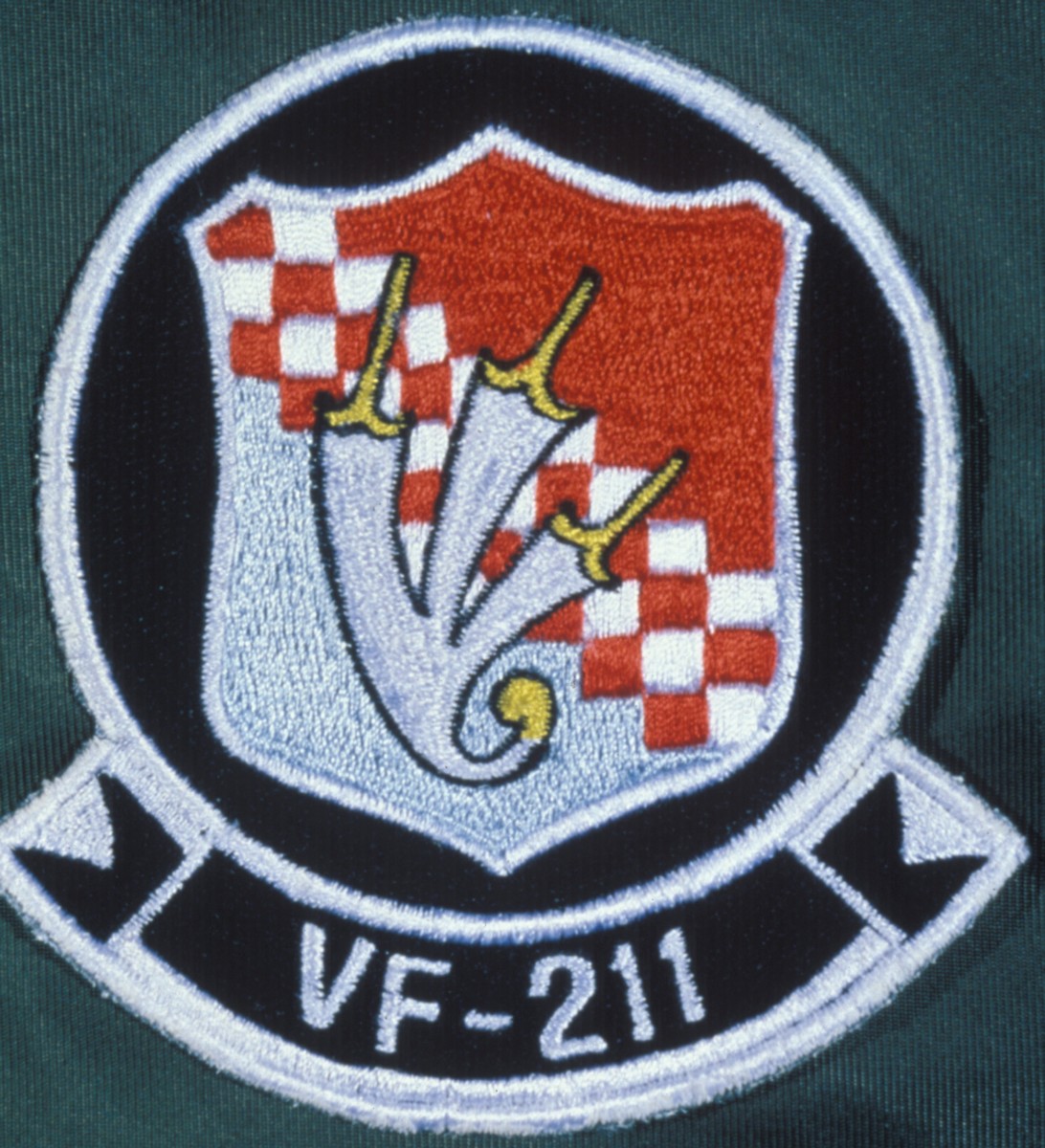 |
||||||
|
|
||||||
|
|
seaforces.org
|
US Navy
Air Units start page
| |
